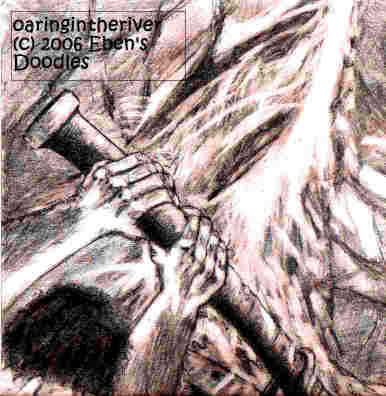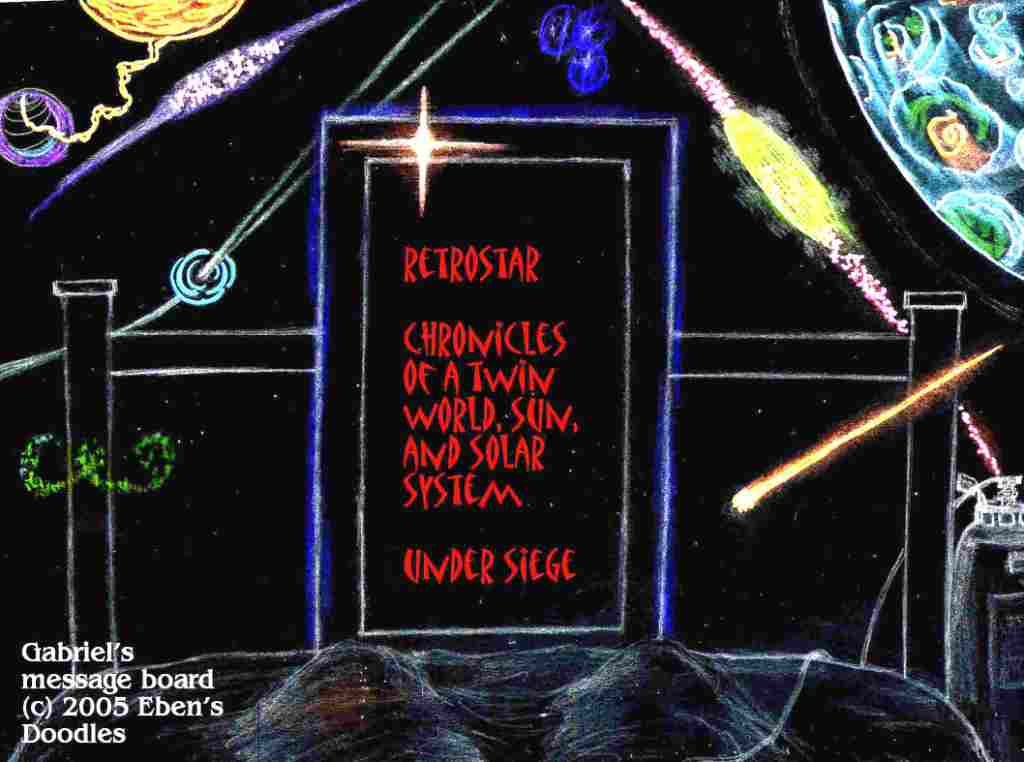

Before the Lakota recorders, Jason the captain of the Argo, who led the Argonauts' expedition to regain the Golden Fleece, foresaw this apparition heading for Earth:


R E T R O S T A R
D I R E C T O R Y
A N D
L I N K I N G
P A G E

RETROSTAR, OR, THE CIRCULAR WEB:
Chronicles of a Twin Earth, Sun, and Solar System Under Siege
Dedicated to Gabriel Tall Chief who first blew the horn and to M.G.Y. (Marty Gantry Yeager aboard RMS TITANIC) who couldn't hear it...

WELCOME TO THE TWIN EARTH(S)!



AND WELCOME TO VOLUME I, FATAL CONVERGENCE! This is the point of entry for the First Alien Entity!
The great, state of the art, "unsinkable" Ship of the World has set sail on its maiden voyage with its cargo of fools, both fabulously rich and contemptibly poor, educated and uneducated, moral and immoral, beautiful and ugly, tall and short, nice tempered and ill-tempered, with nice teeth or with bad teeth, brown eyes and blue, or black and hazel--a complete human spectrum if there ever was one assembled together on one huge vessel. Certainly, there was more than room enough on this one. As tall as a New York skyscraper of that day, she was a city afloat, all the social classes present and working more or less amicably together to get to their destination, the New World's portal of New York, where they would part and, except for the super rich, never see each other again. Yet as sometimes happens with management at the highest levels, arrogance sets in, and just a tinge will do, impairing judgment and producing flawed decisions that, in the Titanic's case, proved just as fatal as it once did for the once mighty Titans who committed hubris and lost Atlantis.
Sailing full steam ahead to New York and, ignoring every warning, straight into an ice field...

Aboard the doomed liner a little girl in First Class lay in bed, troubled with a dream about people, some she could recognize, splashing about in nasty cold, icy water, screaming, while her nanny sat beside her reading a naughty French novel of romance in a Gothic castle.

Kiowa sages recorded the Great Canoe's sinking on their cowhide calendar.

Ero the Cybernaut also gazes into the devouring mouth of the Red Star:

In its path, planets and stars and entire galaxies are consumed by the red-flaming star:

CHRONICLE ONE, PART I, VOLUME I, FATAL CONVERGENCE, RETROSTAR
Dr. Pikkard, Dutch Genius/Retrostar's Cosmic War Challenger # 1
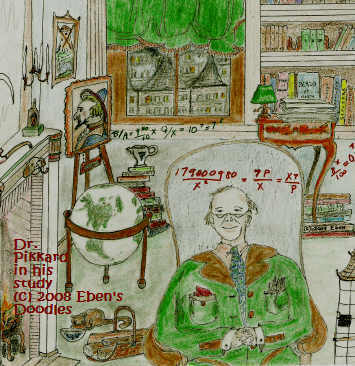
At certain points in the war, Dr. Pikkard's greatest creation, the intrepid e-butterfly named Wally, is the lone combatant:

Our RetroStar Chroniclers:

Gabriel Tall Chief, confined to bed in a children's hospice the remaining days of his CP-shortened life, shone like a pure blue star of heaven (which is awarded to those who fall in battle) in a red-star-dominated world. Which was more powerful? Only time and events will tell:


Gabriel's disciple and dream-weaver and dream-rider, Horace Brave Scout, who gathered the "fragments" of the chronicles that remained after Gabriel died and made a great leap for mankind.


Horace Brave Scout playing "Amazing Grace."


The Series of the Twin Earths is available on disk or can be electronically transmitted. The series consists of: RETRO STAR, Vol. 1, Fatal Convergence, Vol. 2, Cloud and Avalanche, Vol. 3. Battles of the DUBESOR, Vol. 4, Lost Chronicles; Part Two, Unchronicles, Vol. 5, Natal Convergence, Vol. 6, Beyond the Rapture, Vol. 7. Final Wars...Convergence at Orion

A "Letter to Agent, Outlines, and Overview and Marketing Strategy" of the Series":
Agent Letter, Outlines, Strategy
A Last Word Count in ANNO STELLAE 1997: 1,400,000

Outlines for VOLUME I, RETROSTAR:
CHRONICLES 1-24--WHAT'S IN THEM?
CHRONICLE ONE--WHAT'S IN IT?
CHRONICLES TWO TO SIX--WHAT'S IN THEM?
CHRONICLES SEVEN TO NINE--WHAT'S IN THEM?
CHRONICLES TEN TO TWELVE--WHAT'S IN THEM?
CHRONICLES EIGHTEEN TO NINETEEN--WHAT'S IN THEM?
CHRONICLES TWENTY TO TWENTY-THREE--WHAT'S IN THEM?
CHRONICLE TWENTY-FOUR--WHAT'S IN IT?

OUTLINES, CHRONICLES ONE TO FORTY-FIVE
OUTLINES, CHRONICLES FIFTY-EIGHT TO SIXTY TWO

Main Game Players (Earth II):
1. Ever wondered why the Titanic was named that? It wasn't the luxury liner's colossal size alone, her namesake was The Titans (Atlanteans) who lost Atlantis, on both Earths; then tried repeatedly to re-assert their rule over Earth II; they are a superhuman species that has turned vampire and lives almost indefinitely. Their major downfall, besides arrogance that led to hubris, was constant in-fighting and power struggles as this claimant and that claimant for the throne duked it out, with no gloves and no holds barred.
2. The Ten Stones of Fire (Starlike, Jeweline, Super-intelligent, Alien Entities), each performing as OP, or, Opposing Player, with the aim of conquering and destroying the Earths, I and II, and their respective universes.
3. Dr. Pikkard's Computer Wargame, represented by Wally, an electronically-created, free-roaming butterly who fights for humanity's survival against the Alien(s)
4. Human "Alphabetic" or A-Z Champions, also a subgroup called DUBESOR, or the Rosebud Champions
5. Yeshua, the A and Z, the Alpha and Omega, and the Aleph and Tau (also known as FC, the so-called "Forbidden Category")

EVEN BEFORE THE TITANIC'S SPECTACULAR MAIDEN VOYAGE DIVE TWO AND A HALF MILES DOWN IN THE NORTH ATLANTIC TO THE EDGE OF THE ABYSS, RECORDED IN CHRONICLE ONE, SOME CLUES ARE GIVEN US. FOR INSTANCE: ON BOTH EARTH I AND EARTH II A CERTAIN CHOICE OF A YOUNG RUSSIAN ARISTOCRAT'S FIANCE (UPPER CLASS, KREMLIN-BORN AND BRED DAUGHTER OF A COURT PHYSICIAN, KNOWN LATER AS ONLY THE "OVERLY POSSESSIVE" WIFE OF THE NOBEL PRIZE-WINNER COUNT LEO TOLSTOY) PREPARED THE WAY OF THE ALIEN ENTITY ON EARTH II AND THE DRAGON ON EARTH I: FOR THIS CHECK OUT SCENARIO I. THEN RETURN FOR SCENARIO II, WHICH REVEALS THE GREAT RECORDER HIMSELF, CHRONICLER GABRIEL TALL CHIEF. FINALLY, SCENARIO III, WHERE A KREMLIN STARETZ (PROPHET) REVEALS YEARS BEFOREHAND WHAT IS GOING TO HAPPEN IN THE ILL-STARRED 20TH CENTURY OF BOTH EARTHS, WHEN SOMETHING WORSE THAN THE H5N 1 STRAIN OF THE BIRD FLU VIRUS IS INFECTING THE TWINS, SO THAT THEIR INTERTWINED FATES ARE ALMOST IMPOSSIBLE TO SEPARATE FROM EACH OTHER.

RETROSTAR CHRONICLES:
RETROSTAR CHRONICLES DIRECTORY

Earth I's supercontinent, which may have contained all the continents which presently exist:

Earth II's lost first civilization, Mukalia, and its continent:

Earth II's Mother Continent, Atlantis II, after the Re-Location of the Planet:
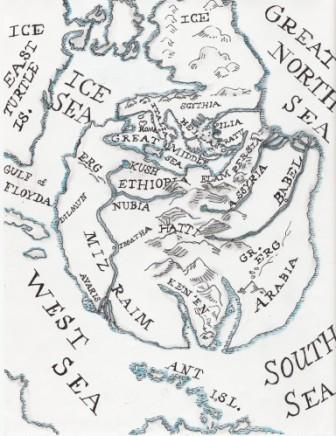

How much of you is Larry Prufrockski? The Larry Prufrockskis of the world are everywhere, operating high and low in human society. If they have their way (and it seems they soon shall), humankind would be gnawing the gristle off mammoth bones in a dark cave somewhere and sometime in the New Ice Age. This is the fate that is now yawning, promising to engulf all humanity once again, as the world slips back into nothing but ice, ice, ice.
Unchronicle, The Man Who Never Launched, Unchronicle of the Unfurled Sail, The Unquest of Larry Prufrockski, Vol. IV, Retrostar

CONCLUDING PORTION OF LARRY PRUFROCKSKI'S UNQUEST, "THE MAN WHO NEVER LAUNCHED":

Closest to the action, The City of London's Lord Mayor had a most elegant and exclusive party going on right up to the moment of the disaster, with the decks of his yacht, Planet Animal, crowded with the cream of international society. The King of Pop's ardent animal activism was being celebrated, in connection with his own album. Whoever was anybody in environmentalism, animal rights, and the world faith movement would not have missed the King of Pop's own personal appearance--which was to occur at his own selected time, for as many minutes as he could suffer rubbing his sequined elbows with mere mortals, even if they were avid fans. So while they awaited the King of Pop's arrival by either special helicopter designed to look like the King of Pop's pet iguana, Elizabeth, so that the cocktail-sipping guests could enjoy the best view of the various dance teams onboard the barge, the Lord Mayor's yacht was drawn up as close as possible on the starboard side. Here they enjoyed a ringside view while the technicolor Image was towed upriver from a private drydock where it had been assembled under high security, with no press permitted on the premises, and towed up the Thames toward the city's landmark bridges.
The light show was incredibly staged, with colors progammed and coordinated to change every few seconds.

Larry had the best view of all, of course, except that his reflexes took over, he put his legs and feet up, shut his eyes, covered his head with his arms and prepared for the worst.

Here at the Tower Bridge the mishap occurred. An unexplained fatal convergence with a flying object, said to resemble an outmoded 1960s-era rocket, abruptly terminated the whole wonderful show. The Image's head, or the major portion of it, along with some of the torso emblazoned with the King of Pop's signature lizard and twin, ancilliary, peace signs, so happened to descend. That put an immediate end to the party, of course, and its various fund-raising programs for "Planet Animal," the movement to return Earth to the animals and eradicate humankind (or at least restrict humans to a limited number of fenced reservations set with population caps and publicly funded, univerally mandated abortion). Fifty of the guests were unaccounted for later after quite a few hours of frantic searching by authorities and diving teams with search lights after the yacht capsized and everything and everyone was dumped unceremoniously overboard into the turbid Thames.
The rocket seemed to have a thing for smashing icons, and the King of Pop's alter ego proved no exception. Maybe if there had been more time, and if the cockpit hadn't been in such shambles after the Eiffel Tower bust-up, the outcome might have been far different. With Larry no longer able to maneuver the rocket, the fatal convergence occurred despite his best efforts. The King of Pop's cork was popped.

The rocket sliced through the Pop King like cheese, and it instantly became fragments, flying in every direction. Then Larry's next impression was that the rocket had become a giant water ski or hydroplane, its engines continuing to thrust, which raised the cabin skywards as the main fusilage plowed through the water, making a giant wave that easily washed up over the Thames embankments, dousing thousand of on-lookers befor they could flee. In this position, the rocket reached the next bridge and slid right over it, suffering little damage, and the engines continued to function. It was like a hurdler jumping each hurdle, only the ground, in this case the river water, was helping him by pushing upwards at the same time. The moment the rocket fell back to the water, the thrust from the engines pushed it onward at a rapid speed, and when the low arched London Bridge converged with the rocket, it washed up and over, sweeping a tsunami-like wave ahead of it as a lubricant.

Four historic mid-town bridges spanned the Thames in this section of the river, and Larry clung to his seat and had no idea what was happening as he rode the bucking, hydroplaning rocket.
He only sensed a tremendous surge beneath of the water whenever the rocket hurdled a bridge.
After the fourth bridge, the Thames took a turn toward the the Parliament Houses of Westminster, and it was well that the rocket did not keep to the river but kicked into blast-off mode or it might have creamed Parliament and finished the job Guy Fawkes started with his plot to blow it up.

In the 23rd Century, Olson and Hodgkins, aboard the Atlantis II dirigible flying from Holland America to the Holy Land, with a stop-off at London, at one point could look straight down at the Bank of England, the treasure chest that held most of the world's gold reserves even while most of the Northern Hemisphere was sinking rapidly back into the Stone Age due to Global Cooling.

For Chronicle Sixty-Two's Unchronicle I, in which Ero flies the Wally-programmed copper dome of the City of Destiny's old Union Train Station to 19th century Chicago just as the Uproarious Hog Butcher of the World erupts in the Great Chicago Fire, and next to the 21st century's dramatic debut with Puppet Master Osama bin Ladin's Muslim terrorists wreaking destruction on the World Trade Center, then a direct hit on the Pentagon, followed by a near take out of the White House, go to Unchronicle I.
CHRONICLE SIXTY-TWO, ANNO STELLAE 10,999, QUEST OF THE CYBERNAUTS
UNCHRONICLE I, CHRONICLE SIXTY-TWO, VOL. III, RETROSTAR

UNCHRONICLE II, PART I, THE CHRISTMAS PRODIGAL; PART II, THE HOUNDS AND THE BLACK PANTHER, PART III, THE KNIGHTS OF THE AXES OF HONOR, CHRONICLE SIXTY-TWO, VOL. III, RETROSTAR
Unchronicle II, Part I, The Christmas Prodigal, CHRONICLE SIXTY-TWO, RETROSTAR

Unchronicle II, The Hounds and the Black Panther, CHRONICLE SIXTY-TWO, VOL. III, RETROSTAR

UNCHRONICLE II, PART III, THE KNIGHTS OF THE AXES OF HONOR
So we will honor these old Argonauts, and
Listen to their story as it stands, and we will
Try to be like them, each of us in our place;
For each of us has a Golden Fleece to seek,
And a wild sea to sail over, ere we reach it,
And dragons to fight ere it be ours.
Charles Kingsley

Who could have devised such a journey? Wally had no idea, surely, any of these things would happen to any of the heroes in the wargame he was personally guiding to the conclusion. Nor did he imagine all labyrinthian twists and turns in the Cyberworld as it spun its possibilities out before the gazes of those heroes.
Ero, on his flying mast-bot, proceeds from the cyberworld into the surrounding Vampire spirit-form hidden within the Carbuncle. He discovers the inland sea, the Sea of Doubt (which is more the size of an ocean than a sea). He encounters a palace set in the midst of the dark waters, and within the palace he flies through vast halls and pillars and finds a stranger scene, a fountain pouring blood into a big basin. Then he watches in growing horror as a bat flutters down from above and grows enormously, becoming the Great Vampire Spirit-Form that inhabits and directs the Carbuncle star-stone. This evil entity is not cyberspatial, it is real, but can affect Ero in a disastrous way if he is not careful. Yet the Vampire too is somewhat vulnerable, as Ero is not so tiny that he cannot inflict some damage himself. Attacking the Vampire, he finds the Vampire is so much greater in size that he only succeeds in penetrating its eye. Inside the Vampire's eye is a world unto itself, full of photo-files, like the billions and billions of galaxies that populate the universe. These photo-files each contain a world of its own, running along certain themes or people in them. He enters one photo-file and finds himself involved with the life and destiny of a 19th century small town paper's printer's devil who seeks his prospects in the big city of Chicago, and on it goes, event after event including the Great Chicago Fire, until the up and coming young man of society dies in the fire, and then it is on to other events and photo-files. Ero encounters such people as Eryk the fetler on a train in southern Atlantis II, and the free lance photographer, Damon Santiago Coxie, before he is given a twin, Ero II by Yeshua who has been closely tracking them in their progress through the photo-cell and various adventures. Damon is destined to be joined with Ero's twin, Ero II, as a knight of the Axes of Honor.
The hydrogen bombing of Poseidia, and the missiles carrying similar warheads to all the other major cities, are meant to annihilate both Eros and also Damon. Ero escapes through the portal first. Ero II and Damon fly out on the mast-bot from Poseidia before it goes up in a mushroom cloud, only with no where to go. Damon's world is doomed. If that isn't enough, the entire photo-cell is about to be deleted by the Vampire to make doubly certain the "anti-matter" of faith doesn't spread to the other photo-cells, thereby spreading and destroying the entire spirit-form and its star-stone.
But Yeshua intervenes and not only do the two champions, Ero II and Damon, escape through the portal, but they are returned to the original starting point for Ero, the nexus of the Union Train Station in the City of Destiny. The mast-bot is then retired, screwed back on the top of the copper dome. The trusty Kater's Compass from Charles Darwin's voyage on the H.M.S. Beagle, which Wally had programed with wonderful guidance systems and very useful popups and helps, that too is retired, completely worn out in their travels.
At the Union Station, they are welcomed by a grand event already in progress, for their testing and then dubbing as knights-errant if they both pass the rigorous questioning by Lord Yeshua. Both prove successful, and they are dubbed knights by Lord Yeshua. Given their respective knight's equipment and gear, they sally forth on their way to Mount Defiance, which is a huge castle mount studded with many seemingly impregnable walls and fortifications and towers. On the way, a storm nearly sweeps them into the bay of the sea below the Mount, but Yeshua intervenes, and they are spared. They rescue a man who would have surely drowned or died of exposure at least on the road. His destiny becomes intertwined with theirs, as he enlists them for a trip to the the court of the king ruling the Mount. They will serve as his knight-retainers, with a page assigned to each. He will sing his epic poems to the lords and ladies and the king, and this will be his swansong, as he is at the end of a long and distinguished career of court minstrel. He hopes for the customary three bags of gold that is awarded the court minstrel on retirement. But, deep in his heart, he knows of a greater purpose than his own comfort when he can no longer earn his bread and butter. So he trains the young champions for the coming jousts he suspect the king will command, for the king is known for jousting tournaments to test the mettle of his knights against any visiting or challenging knights. The winner receives a special prize, of course, either a court lady's hand in marriage together with her entire dowry, or some grant of gold and jewels from the King's purse. The winner can also help himself to the vanquished knight's uniform, banner, horse, equippage, and money purse, of course, and anything else he may have to his name (winner, indeed, takes all!). As for his wife and family, if the loser has them, they become slaves and chattel to the victor.
Surely, the king, on espying the strength and youth of Ero and Damon, will not miss the opportunity to challenge them to jousting on on the field of contest, which is Cheney Field, an ancient baseball field that lies hard against the northern flanks of the Mount. With the two jewels the minstrel has reserved and hidden away for his old age, he buys the necessary mounts and equipment needed for his knights, so that they can make a splendid showing before the assembled court and the king. After some training sessions on Cheney Field, and the minstrel meanwhile seeing to all the necessary wardrobe for himself, his two knights, the two pages, and their mounts, they will set forth for the gates of the outer wall of the Mount to present themselves for the court's pleasure at the king's yearly birthday banquet and royal ball. This was his plan, but the best plans of mice and men can go awry, as the poet Robert Burns once said--particularly when something called a dragon inserted itself into the program.
The reunion of the mast with the newly materialized missing dome provided the complete "lid" for the top of the Union Train Station. It was screwed back on much to the surprise of the lone occupant, Crazy Dan, who was still playing solitaire at his table set below, and he dropped his cards for a few minutes just to stare at it. Eventually, when he couldn't figure it out, he went back to his cards, which was about the only thing he was good at these days since he retired from his car dealership. He was doing what he thought he always wanted to do: nothing! Absolutely nothing! This was his one consuming thought, while he was furiously working up a sweat every day coming up with new ways to draw in crowds of suckers to buy his cars. Now all that was over, he had his retirement atlast, and the millions he needed to enjoy peace and solitude, and more peace and solitude, thanks to his wildly entertaining, lunatic sales pitches. Is that all there was to it? Why not? For a man like this, with a mind, heart, and soul that entertained no higher expectations, it certainly was. Like an insect buzzing round and round at the bottom of a jam jar, he had grown accustomed to life within severely restricted perimeters, and didn't know or care he was trapped, especially now that his self-chosen fate was sealed.
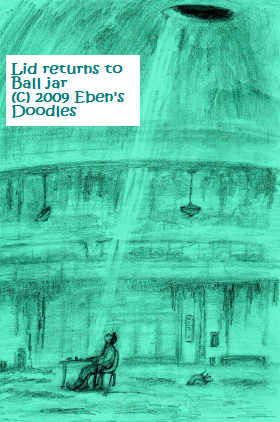
Saved from the nuclear destruction that the Vampire, with considerable help from two of its star-stone siblings, had ignited to eradiate the growing germ of faith within its own eyeball, the two champions, feeling little like champions, looked around from their perch. Damon was not recovered from seeing his world destroyed, and he was not able to comprehend what he was seeing. Yet Ero had been there before, and he did his best to help Damon, and reassure him that things were going to get better, if they did not lose hope. As for his family, they did not know yet what had happened to them. Perhaps, they still could find out.
Comforted by that thought, Damon tried to deal with the present challenges of landing in such a strange city, the City of Destiny. What Destiny did it offer? He had seen his own destiny destroyed before his eys--was there a better one in return for the burning ashes of his own world?
As the mast did not seem like it was going anywhere soon, and the Kater's Compass did not respond to Ero's questions, they realized that they might have to explore the city on their own.
They soon decided they might as well climb down the dome and the building to street level and take a look around.
Ero had climbed up on the west side, but this time they climbed down the north side, which put them on a flat roof of the train depot's offices. Here they found a metal, roof-access ladder that let them get down to the ground.
They were right on time. A grand reception was waiting for them, though they could see no one present!
A gala platform of tented material, with heraldic banners, materialized. The banners were the most remarkable they had ever seen, of two main kinds. The first featured a magnificent golden rampant lion, crowned. The second kind showed two axes on a blood-red background.
The two candidates for knighthood, who did not know they had already served their apprenticeships and been approved, walked around looking at each item. What was this all for? they wondered, glancing back at each other.
Suddenly, they heard, rather than saw, a multitude of people around them, as if they were standing in a great pillared hall, with thousands of courtiers and knights taking their places for the entrance of the great Lord of the people and nation.
Then there silence, and the sound of footsteps. They could hear the footsteps and see the impression of them in the carpet as someone invisible walked by them toward the front, and sent to the pavilion and turned around and faced them.
A mighty roar erupted all around the two candidates, that almost knocked them off their feet. People were cheering and shouting a single name. "Yeshua?" wasn't it? both candidates thought. Yes, it was. There could be no mistaking it. Gradually, the calling of His name receded, and there was a thump, three times, of the lictor's standard on the ground, and again, dead silence. The hair on the back of the candidates' necks stood up, they could feel thousands of eyes turned to them. It seemed they were waiting for their response, but what should it be? The candidates had no idea.
Damon felt a nudge against his shoulder, looked, but Ero hadn't done it. He saw no one else could have done it. Again he felt his shoulder being nudged. Realizing that this was something bigger than he could see, he took a few steps forward, then continued until he stood at the base of the pavilion. A red cushion appeared at his feet, and he knew what it was for this time. Wasn't that the sort of thing the candidate for knighthood knelt on before he was dubbed a knight by the king or queen or the castle lord?
He felt a gentle pressure on his shoulders, as if two hands were being pressed there, and he realized it was what he thought! He knelt.
Damon's heart slowed. He could hardly draw a breath, and he felt as cold as if a bucket of ice water had been thrown suddenly in his face. He would have sweated, though cold as he was, if he could sweat in cyberspace, realizing then that a life and death choice of some kind was being set before him, a test of his character and life that would allow him no appeal if it went badly. And it was what he felt, he soon discovered--a test, the most serious one he had ever faced.
Would he pass the Trial of the Candidate? Unlike medieval candidates, he had not spent the whole night before the Test in solemn fasting and prayer, kneeling alone before the Cross and the altar in a chapel, but had been running for his life in a speedboat, Sasan at the wheel, chased by gangs of spies and government police down the canals of Poseidia!
What was that going to do for him now? His knees felt very weak, gone to water. Now he knew why the cushion was there and he was kneeling, because there was no way he or any other candidate could manage to stand up at such a moment! He felt it was all over with him.
For the first time he heard a voice! It had the tone of a commanding officer's too! A general, or a field marshal, would sound so authoritative, Damon knew. He had met and photographed several such in private sessions attended only by a few chosen aides, but this commander sounded even more impressive. His voice seemed to penetrate his whole being and then flood out into the world, causing the whole world to stand still and listen.
At the sound of that Voice, Damon felt like he was standing alone on the docket before the Supreme Judge of the Universe, not just a commander or even a commander-in-chief.
He wanted to flee, to bolt, to even spring up into a tree, but he had no strength to do it!
The Voice was speaking, in perfect Greek too, and Damon heard every word of what was the "Test of the Three Vows".
"Candidate, wilt thou vow Honesty, Courtesy, and Probity, and be always ready to deny yourself and defend the weak?"
What on earth was "probity", Damon wondered with consternation. He knew what the first two and the last entailed, but...there was no time to be consulting the dictionary, he had to answer, he felt, with a nudge at his shoulder to reinforce that impression.
"Candidate! Wilt thou vow...?" the lictor prompted.
"Yes!" Damon blurted out. "Yessir! I mean...ah--"
Again, he felt someone nudge his shoulder, a little sharply too, as if a sword was being used, since no one was asking him what he meant other than "Yes" or "No."
He had no time to think about it further. The second Test Question came, riveting his attention.
"Candidate, wilt thou pledge thyself to Lady Purity, and wilt thou defend her virtue and honor always?"
Damon relaxed a bit. This was easy! He thought of Natalia immediately. Was she all right? Would he ever see her again? He was a long way off, he knew, and that was all he knew about his whereabouts. How could he find his way back to her? No doubt she was waiting faithfully for him to return! He knew now, at this very moment, he loved her, and that there was no one else he could marry or devote himself to in marriage. And, yes, he wouldn't run after any other women--he would give that up for Natalia. She was more than worth it! It wouldn't be easy, but he was going to do it! Deny himself! Why had it taken him so long to get to this point. Was he so independent, he hated to give up his free-wheeling, self-indulgent lifestyle and all the willing, pretty women for anyone, even one such as Natalia? But now he had made his decision, and he was going to see it through!
Damon felt another nudge, this time on both shoulders. He remembered, with as start, where he was. But he had forgotten the question! What was the question? All he could see in his mind's eye was Natalia. She was beckoning to him, and he was holding back from her. But his heart said yes! yes!" Another voice sounded, not the same as the first, perhaps the Candidate Avocate who was present in Spirit, announcing: "The Candidate has pledged troth from the heart! He has vowed to remain pure for her hand, and throughout the time of his union with her he will remain faithful to her, loving only her as his wife and helpmeet. Let it be written in the record!"
Again the first Voice sounded. Damon felt relieved beyond words. Apparently, his unspoken vow had been heard and approved by higher authority.
It was now the time for the third question of the Test, the climatic one that decided whether Damon would pass and become a Knight or not. Two right answers so far would not win him knighthood. He had to answer all three perfectly.
As if the whole congregation present were well aware of the gravity of this very moment, the very air was rigid with suspense. Everything hinged on his handling it rightly. The whole scene was deathly still, and a preternatural silence it was, as if it were the dawn of the eight day, the day after the Week of Primal Creation, when all the Earth was reformed and given order and all the living species, with Man installed as the reigning Sovereign.
"Candidate, wilt thou vow to be faithful to thy vows even unto death?"
Damon's heart dropped down in his chest the moment he heard it. The flesh of his entire body was screaming and crawling, as if it wanted to leave his bones and muscles! This was, for Damon, the hardest question of all! The first wasn't so bad. The second was a piece of cake. But this one! This had put its finger on something he would admit to no one! He knew for sure he wasn't up to it. His heart sank even further. He had never, never been faithful to anyone or anything in his entire existence, had he? But there was one thing, he couldn't lie about it! He despised liars, and knowing how despicable liars were and anxious to save their wretched hides. But he knew he would have to live with himself knowing he was a cowardly liar, a cheat, an imposter. What kind of life would he have then, if he made himself a miserable liar? It would be like being chained in a deep, dark dungeon, with evil spirits calling him dirty names, day in, day out! So why should he try to fool anybody now? He couldn't bear to live like that--though many people he had known had chosen to, for the sake of sparing themselves some calamity or even a small inconvenience!
"I--I can't...!" he gasped out.
"It's impossible for me!"
At the moment he said that, there was a tremendous stir, as if the whole invisible host of nobles and knights of God present were struck aghast--as if no Candidate before him had ever dared say anything of the kind.
Damon felt he was finished! He had blown it utterly! He was disgraced. He was was disqualified. What now? Would they drag him out and throw him into a dungeon somewhere, to live out the remainder of his days in chains? But, still, he felt he had said the right thing, the only thing he could say honestly, even if it exposed him in all his weakness--something he had never revealed to anyone before--that for all his strength and bravado about being a man's man, he really couldn't say he could stand up to torture on, for example, a cross and still remain true to his vows. Every man had a breaking point, didn't he? He knew he would break too, if the pressure was great enough.
"Yes!" the Voice thundered, answering in Damon's stead. "For man it is impossible, but with God all things are possible. The Candidate has vowed these three times in solemn assembly, before the Father, the Son, and the Paraclete! Recorder, write it in the book!"
The congregation of witnesses exploded as the tribunal lictor thumped the base of his standard for order in the assembly. There was no other word for what had happened: it was "sensational".
Still gasping, Damon felt hands on him, holding him upright on the cushion. He felt so faint he was liable to pass out right where he was. When the rejoicing and congratulations for Damon died down, the ceremony concluded.
This was not altogether pleasant, either. It was not pleasant at all, in fact. Even with his head down, Damon could see the diamond sword being uplifted, as if his head might be severed in the next instant. Instead it was lowered slowly, and touched...not his head, not his shoulder, but his heart..
Damon felt a blazing warmth spread through his chest and through his entire frame from head to feet, making him feel as if he was going to explode with strength and power, and he also felt ...what? Joy? Yes, it was joy!
"I, Your Lord and God, will be your Strength and your Strong Tower, your Mighty Fortress, just as I have been in the past, so will I be to you in your coming battles. Be of good cheer, and rise! You are now a Knight of the Order, the Axes of Honor. Stand and receive your garments and weapons!"
Springing to his feet a true champion, Damon waited with great expectation. But the entire scene went instantly dark, and he was left standing seemingly alone in pitch darkness. Was this how it was going to be?--a lone warrior struggling against dark forces that were hiding somewhere in the night enfolding him? Perhaps so!
But he was deceived by appearances. He was not forsaken. He found himself instantly garbed head to foot in chain mail and a tunic, holding a spear with a standard and a shield, with a helmet and sword to complete his knightly equippage. It was wonderful gear, though somewhat antiquated, as he understood warfare. Nevertheless, he knew he could do some damage with it! Just give him some practice and the opportunity to prove his prowess, and he knew he could wield a sword with the best of them!
Yeshua again spoke, but this time it was a private audience. He awarded the hero a new name, inscribed on a white stone, which no one else would know or see. After several more words in from Lord Yeshua, Damon stepped aside to wait for the second Candidate to be interviewed.

Then the light flashed back on, and the awesome Knights Tribunal continued.
Ero II had watched Damon go through some sort of medieval age ceremony, without seeing who was performing it, and then the lights went out momentarily, it was completely black, but Damon stood there, highly visible, or was it someone else in his place? He was dressed completely different, with two axes set along side his head on a metal helmet, wearing a shining green and cobalt blue tunic over a chain mail body suit. He wore a sword, and in his right hand held a spear holding a standard emblazoned with the two axes on a red background. In his left hand he held a shield emblazoned with two axes on the same blood red background. What was going on? Ero marvelled. He tried to move from his spot, but something seemed to hold his feet fast where he stood, as if he were set in concrete!
After a short time, while Damon seemed to be talking and being talked to, he stepped backwards, bowed deeply, then moved to one side of the carpet and stood quietly and glancing back toward Ero.
It was Ero II next who felt like he was being propelled forward to the base of the Judge's pavilion. The concrete was gone, he could move his feet again. It felt like someone had given a push to his shoulder, as if a page were at his side who knew all the fine details of the ceremony and testing, giving him the nudges so he could perform the right moves according to the tribunal protocols.
He started forward and then paused at the base of the pavilion. The cushion, rich in plush red velvet, encrusted along the edges with what looked like diamonds, was still there waiting for him. He realized what it was for. He knelt on it.
Then as he waited, totally awed by what was happening, he saw Yeshua appearing before him, for he had been there all along, Ero knew, but was not visible to his eyes until then, for some reason he could not understand.
He dared not look up, but saw only the fringes of his robe, his hands up to his open holed, red nail-pierced wrists, and there was one thing more, a glittering white sword, an incredible weapon seemingly cut from a single diamond, blazing with light and fire in the right hand.
The sword was so blindingly bright that Ero couldn't look at it! What was he going to do? Cut off his head? Ero II wondered just as Damon had before him. He really didn't think that would happen, but he had never been knighted before, and it was too far back in Greek culture, hundreds of years in fact since Greeks were knighted at various courts in the medieval Byzantine times.
The candidature "ceremony" was brief and demanded sharp attention. There was nothing casual about it. It felt like he had been summoned to appear at a military event, a tribunal of the highest order-- in every detail, extremely solemn, perfect in execution, and almost frightening lest anything not be done not just right according to regulations, thereby bringing dishonor to the commanding officer, the Judge that presided over the Tribunal.
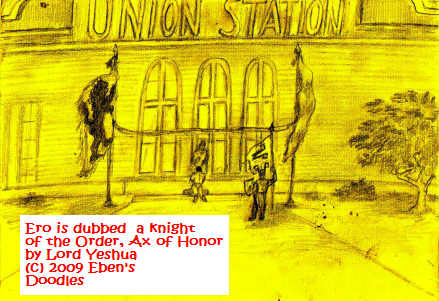
Ero was surprised when the same things did not happen to him as to Damon his brother-warrior. He was given no mail suit, tunic, spear and standard, and no sword! How was he going to fight the enemy? Presumably, that was what this ceremony was all about, to equip them for a coming battle or war of some kind. It wasn't just a ceremonial, he felt, considering how solemn it was being conducted. This was a matter of life and death, he knew for certain. He couldn't see, but he felt the presence of thousands of people, who sounded like all warriors and soldiers, by the sound they made. He could hear them, sense them, and so he knew he wasn't imagining there was a huge assembly gathered round about for an imminent war.
Wondering what role he could possibly play, Ero was even more surprised by the test questions. He was first asked,
"Candidate, wilt thou forswear all earthly, mortal shields and ramparts and trust in Me alone?"
That astounded Ero the Olympic Torch Bearer. What? No shields or protective mail suit? No anything?
But he thought again, "Warriors, even the best, still die with such things in their possession, they can still be conquered and slain, so really, such things do not save a man from a more powerful enemy. What then can I trust in?" Suddenly, it flashed upon him, how Yeshua had come through for him, time and again. It hadn't been his own bow or arrow that had saved it, it had been Yeshua. Surely, that would never change. Yeshua had been proven faithful, always. He had only one answer he could give: "Yes! to the question.
Then he waited, afraid he would be told he was wrong, that he was being ignorant, presumptious, without common sense, thinking he could go forth into battle without any normal gear.
The lictor thumped his standard, declaring: "The Candidate has answered rightly. For it is written: "His faithfulness will be your shield and rampart. You will not fear the terror of night, nor the arrow that flies by day..."
The assembly erupted in rejoicing for the Candidate's success at Test Question 1. Ero took a deep breath.
The Judge's voice thundered again:
"Candidate, wilt thou tell the number of all who were saved in the ark Noah sailed?"
This question nearly knocked Ero off his cushion! It was so unexpected, as it had nothing to do with warfare--at least it seemed as far fetched as it could be! Bible was not his strong point, as he hadn't been raised in a home where the Bible was read more than one or twice a year, and usually it was by the priest at the church in Seriphos too. He had been told some of the events by his nurse as a child, so he knew some things. But details like this that Yeshua was asking?
What was he going to do? Guess? But a mistake would cost him the candidature? He would not be able to join and continue on with his warrior-brother, Damon. What would he do then? He knew he was utterly lost, for his destiny was tied up with Damon somehow, and he couldn't let them be parted now!
Fortunately, as he wracked his memory in the few seconds allotted him to answer, he recalled in sharp detail what the family's nursery maid had read from the old family Bible Storybook. There was Noah, of course. Then his wife. And he had some sons too. How many? Two at least! And weren't they married? There were at least six in the family. But what if there had been three sons, that would make eight altogether, right? Now which was it, six or eight? Six or eight?
He didn't know it, but he was so bothered, that he was mumbling, even speaking out loud, and it tumbled out "...eight? eight?"
There was an ominous silence. Ero thought he was a goner, he was flat wrong. Oh, if he had only opened his Bible more! He was so terribly ignorant of the Bible--how could that be justified before Yeshua?
In a daze, he heard the lictor thump the standard pole, making him shudder with a sense of doom, and then the lictor announced: "Candidate has answered rightly! Eight souls were saved from the waters of the Great Flood in the ark!"
Ero felt faint, and a hand steadied him as the assembly again voiced its joy for him. Gathering himself together, Ero squared his shoulders and prepared for the final and climactic question. It came, amd literally blew Ero's hair back.
"Candidate, Who is the ark by which men are saved from the Great Floods, the one by water, and the coming one by fire?"
Now Ero, like his people, was extremely quick-witted and clever, and loved words games and tongue twisters and hair-splitting in rapid fire verbal repartee practiced in towns and villages everywhere across his homeland, but this stumped him. An ark was a "who"? He knew an ark was a "what"! It was wood, so high, so long, so wide, filled with rooms for the animals on board, and quarters for Noah and his family, with storehouses for the food supplies. What on earth did Yeshua want?
How could a boat, or an ocean-going vessel such as the ark, made to float but not sail, be a "who"? That meant it was really a person! That was logically impossible, patently absurd!
"Oh, Lord!" he exclaimed, at a total loss. He finished now!
The lictor thumped his standard. "The Candidate for noble knighthood has answered rightly. The Lord is the Ark, by which all men are saved from the Great Floods!"
This time Ero, hardly able to stand, could hardly believe what he was hearing. What had he said? He had answered right? Didn't they know he--? But he could see the ceremony was not over, except for one thing. He was to be equipped for the coming battle, was he not?
Ero stood and watched an Olympic torch appear in Yeshua's hand. Yeshua held it out to Ero, and Ero took it with a trembling hand.
The Tribunal hall went instantly dark, and Ero stood there, with the torch glowing bright, while the lictor quoted from the Scriptures:
"Let your light so shine before men, that they may see your good works, and glorify your Father which is in heaven."
It was impressive, doubtless, Ero thought. But is this all? Is this all I have to defend myself with?
No body armor?
No sword?
Not even a helmet?
From the most ancient times, every Greek that went into battle had at least a spear and a shield, even he didn't have a stitch of clothing to keep off the cold at night. A lighted Olympic torch? He glanced down, however, at the stem, and saw an inscription. It was in Greek! What it said was his answer, he discovered as he read it. He knew he would not need anything more. He had everything he needed. It was more than he had expected, in fact.
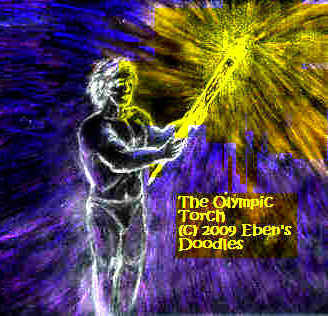
Ero was given his new name, inscribed on a white stone, presented by Lord Yeshua, and, after Lord Yeshua dubbed Ero a knight of the Order, the Axes of Honor, the lictor gave a final three thumps, and the assembly was concluded.
Ero and Damon were left a moment later, free to go, but they lingered, looking over each other's equipment.
Ero was excited. He had followed Damon his newfound brother for a long time, and now he had a thousand questions he wanted to ask him. Here was his chance. To think he would be able to share Damon's adventures, no longer just an observer, but standing side by side with him through thick and thin! He hoped Damon felt the way he did--and from the looks of him and the way he acted, he thought he did.
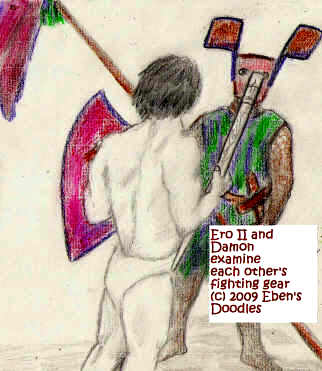
They did not have a long time to get really acquainted. They both felt they must be on their way, as the pavilion was now disappearing, piece by piece, and even the Union Station was crumbling! Something like a leaf fluttered by Ero, and he grabbed at it. It was one half of the Kater's Compass--but it was shriveled up like an autum leaf, no longer any good. He let it drop, wondering how anything once so powerful and helpful could be nothing now, but turned back to Damon. Damon threw back his helmet and grinned.
"Let's go explore what there is here! This gear is meant to be used! Well?"
Together they set out, and discovered that in just a few moments the entire City of Destiny had crumbled away, or been transformed into something very different: a huge castle mount that filled the whole skyline with forts, walls, towers, and defensive gates.
Awestruck, the two brother-warriors now joined, stood taking it in. It was a glorious sight. But what were they going to do on this new, unexplained quest? They had no idea.
After gazing at the castled mount, they decided to go and find out if they could.
In high spirits they set out, feeling as though they were both homeward bound--as a minstrel at a shining court in a grand hall full of knights and nobles, holding a golden rose from the king's hand, once described it:
"I am homeward bound! But I cannot tell
How near may the haven be,
Or if many storms may be may beset my barque
Ere I gain the Crystal Sea?
But I know that my Pilot is near at hand,
And that is enough for me.
I am homeward bound!
And the sun sometimes shines
out of the golden west,
Till it almost seems like the gate of home
And I think I am near my rest;
But if long or short may the voyage be
Still my Pilot knoweth best.
And I know I shall reach the port at last--
The haven where I would be,
Where the storms of life shall distress no more
And there, by the Crystal Sea
The loved ones whose earthly voyage is o'er
Are waiting to welcome me.
I am homeward bound! 'Twill be 'Home Sweet Home'!
I shall see my Pilot's face;
Not a stranger there in a far off land--
I shall feel His blest embrace;
And shall know more fully than e'er before
All His sovereign love and grace."
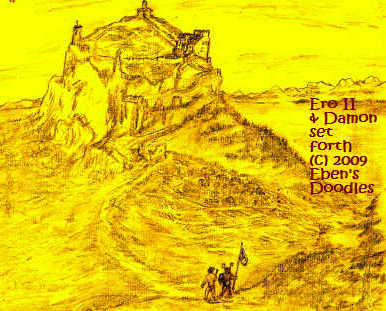
Malevolence was always not far removed, and its eyes were keen to detect and watch the knights-errant approach the gates of its bastion, Mount Defiance. They were not going to enter them so easily, if it could be helped! Possibly, they might not even make it through alive.
A typhoon blew up against the coast, its roiling black clouds rapidly climbing the slopes above the northern shores of the sea that encircled the peninsula of the Mount. It happened so fast that the champions were taken by surprise. Even as they stood and looked at it, they realized in a few moments that they were in a struggle for their very lives.
The light went out, and then downpours that pounded them, along with chilling sleet, soon made the road vanish before their eyes. Water rushed around their ankle and legs as it ran to escape down to the bay. But they remembered their objective and plunged on into the darkness and flood.
It almost seemed that part of the world at least had liquified and was going to slide down as a mass into the bay and be drowned. If only they could reach higher ground! was their single thought in all their struggling.
Ero kept his torch held up, determined not to let it be swept away. As long as the light remained to light the path, he had hope they would make it to safety. Fear was his greatest enemy, he found. If he let it take any ground in him, he knew he was finished, he would slacken off his struggle and be swept away!

Ahead of him somewhere was Damon, who got separated from him, though he was just a few steps away. Damon too fought against the monster of fear. Just then Ero nearly fell headlong as he stumbled over somthing. The torch nearly flew out of his hand.
In the shrill roaring of the wind, which sounded like an asylum of maniacs all screaming for their blood, Ero thought he heard a groan or a cry. He wasn't sure where it was coming from. Yet was it that log he had stumbled over? Was it no log at all but some unfortunately human being?
Ero turned around and held out the torch, feeling more with his feet, trying to stay upright and not be knocked down as he searched. Then he found what he was seeking: a man, fallen on the ground, on the verge of being swept over the side and thence down the steep slopes that tumbled into the bay. Ero grabbed the man by the hand, holding him back as the streams pulled him downward, and then Damon too appeared, and he too helped get the man back on his feet. Together they pulled the man with them toward the slopes of the Mount where they stood more of a chance of finding shelter.
The man was now unconscious, and silent, but they would not let him drop, even if he was a dead weight.
Was he gone? They did not know. But perhaps there was some life in him, if only they could find shelter, and revive him there.

At that moment, when their hopes seemed vain and their fears were the victor, a greater light than the Torch flared into brilliance that almost knocked them flat. In the brilliant light their eyes were struck and dazzled to near blindness, but then they began to see there was Someone standing the light, and by degrees they made out colors too... royal purple, as of a king, predominated. Was this a great king? Could it be Lord Yeshua?
Ero and Damon were certain of it. Lord Yeshua was not going to let them die there, along with the poor old man in their arms. Yeshua was Master even of the greatest storms, which they discovered when it lost intensity and began withdrawing from them on both sides. The water stopped rushing over the roadway, and they were able to sink down on their knees, in relief as well as to pay homage.
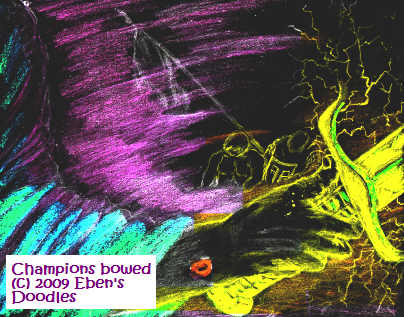
The encounter was so brief, it was over before they could form any thoughts about it. But they knew it was Lord Yeshua who had raised his mighty sword and stilled the storm of fear. Its deadly assaults were quenched! They knew they could make it now to the village they had spied from afar, whose chimney fires even now were burning. The storm evidently had not reached to the village, covering only the roadway where they had been walking so blithely just a few minutes before they saw the first black clouds of the typhoon climbiing up toward them.
It did not take them long, even carrying the old man, to reach the Mount's village, which nestled on its outer wall, just beyond the first gate and towers that guarded the entrance and the road upwards to the Castle.
From a distance it looked idyllic and so peaceful they thought it must be a place of friendly, even kind souls.
"Not a drop of rain fell here!" remarked Damon to Ero. "There's not a single sign of any storm here, no damage from the weather!" Ero marvelled. "Will they believe us when we tell them about it? But strange as this is to see, Yeshua commanded us to warn them, nevertheless, of the burning Flood to come, the fire next time that will consume everything we see, this mountain will split wide open and the castles on it and the village beneath it will be swallowed by the fiery streams that boil out of the earth, killing all the people and their animals. They must all flee this place, seek refuge in the Ark of Yeshua, or be destroyed in the fires Yeshua said were coming soon. We must tell them before we travel on to other parts!"
As they entered the first lanes that wound down to the village square, they did not feel much of a friendly spirit, despite their first impression.
Eyes peered at them coldly in the windows or between cracked shutters in the windows, and no one came out to help them or ask what they might need. Not a drop of rain had struck the town, amazingly, wheras the knights were drenched, shivering, their hair wet, and the old man himself half-alive after being nearly drowned!
Looking everywhere for someone to ask directions from, Ero and Damon exchanged glances and then continued looking. The town seemed all the more hostile to them even as they approached the center. Wasn't anyone going to come out and at least say a word to them?
They could hear dogs snarling, leaping up against doors and gates, and Ero and Damon braced themselves for attacks, but none came out, as if the owners could see they might lose them if they were loosed.
Finally, the knights stood in the square, facing a single large building or house that might be an villager inn. As they started toward it, the old man in their hands groaned, opened his eyes, and as they paused, he recognized the place.
"Take me in there!" he croaked. "It will do for now. I know the place, and they know me well, from my stops to buy their forage for my horse. And sometimes in earlier days I hired the entire establishment, and celebrated there after leaving the king's castle with his gifts. But the place has grown more evil with the passing years, till I don't dare abide there overnight. And I haven't been able to return to the Mount lately until now, being too old, and the way up is so hard these days, and the queen prefers younger singers these days... but who are you, sirs?"
Then the man's eyes turned up, and he sank back in their hands. Hurrying, the knights carried the old man to the door, and it was flung open in their startled faces. A woman with a big cloth tied round her chair, and a floury apron wrapping her large middle, thrust her hard-boned face out, screaming something like "Who's causing trouble here at my door? Git thee--"
She eyed the knights up and down, but then saw what they were bringing. Her expression changed. It did not become kinder, but she jerked her thumb, thrusting open the door wide as she stood aside, wiping her mouth with her flour-caked and stained apron.
The knights looked in, saw many faces gaping at them, but there was a fire burning in a huge, smoke-blackened hearth, the clasthing sound of crockery and metal cups clanking on tabletops and many men dining with their assortment of womenfolk, all crammed elbow to elbow from one end to the other of the large public room, and it was clear what this place was: a public inn and taverna in full spate. Half the town must have been there! The smell of sweat from unwashed bodies and stale beer and cheap perfume, mingled with thick tobacco fumes and smells of rancid food kicked under tables a nd chair, it made the knights want to hold their noses. Was there none other? Ero and Damon did not like the looks and manner of the mistress of the establishment. She evidently did not like their looks either. Damon was dressed as a proper knight, to be sure, and Ero, well, he was a near naked slavey or serf acting as the knight's attendant--a common enough sight in the village, nothing remarkable about that. They had seen their share of lackeys treated worse than dogs, hardly fed, scantily clothed, and groveling at the heels of their masters worse than any dog!
Should they enter, or try some other place? But the village was not likely to have another place, or anything better, they realized. As for their burden, it was his interests they were seeking, not theirs, so they went in.
The moment they got him indoors and lay him down on a bench, the inn's mistress barked orders, and her servants rushed to get a room and bed ready for him upstairs, along with suitable quarters for the knight next to him, and a straw pallet thrown on the rush-strewn floor for the slave-page.
"But where, pray tell, are your horses and palfrey?" the woman screamed at them. "Have you come unhorsed to my stables? I never heard of such a thing! What has happened to the good man's mount? He always comes with fine apparel and an embroidered blanket on his horse, with plumes on its head, and ascends the mount and sings to the court of the high lords and ladies of the castle! So where are his good horse and jaunty equippage!"
Ero and Daman stared at each other. What was she talking about? All they had of the man's possessions was the troubadour's instrument, still covered with leather tightly corded, so it might not be ruined after all if it were laid out carefully to dry. As for a horse and whatever else it carried? Had it gone over the cliff?
They shook their heads. Damon spoke first, finding the language close enough to understand to what he had been spekaing in Poseidonia, even though their accents were so thick and coarse. "Madam, I have no knowledge of his horse or equipment. Was it lost in the storm perhaps, or was he robbed?"
The woman screwed her fat-pillowed neck and made big owl eyes round about her, and then threw her thick, big bellied body back in a laugh that rocked her whole frame, and set the entire company laughing with her at their expense. "'Was it lost in the storm perhaps?' she jeered, cocking her head and neck one way and the next, her hands on her hip and her elbows akimbo as if she were dancing. "This fine gentleman and noble knight saith, 'Was it lost in the storm perhaps?'"
The room exploded, and wine and beer flagons flew through the air, dashing their contents against the walls.
Damon's face flushed dangerously as he eyed the woman, but Ero did not make a move, and Damon resisted his own anger. How dare they insult him! He came from a noble family in Poseidia and bore a mighty sword, did he not? Yeshua had dubbed him a knight in full regalia. Yet he had to wait, as Ero touch his arm for caution.
The woman in the breadmaker's apron and cap sneered right in his face. "Methinks," and she jerked her head and indicated the whole watching group with her thought the same thing as she, "you, sire, are the robber of this good man!"
Damon stiffened, and even Ero's hand did not hold him back now. He was on his own.
"Methinks," she went on, her eyes gleaming, even as they glanced pointedly at his sword and his hand hovering over the hilt, "you are the dastard, the montebank, the dirty jackanapes that has dealt him a terrible loss this day, taking his horse and all he carried with him to the Castle yonder. What of that? How do you acquit yourself! Say!"
He looked at them with contempt, without a twinge of fear. He knew he could do them far more damage than they could do him and Ero, though whatever damage he inflicted on the men, he would not strike the fat old shrew of a woman, however offensive she was. But what about the man whose life they had come here to save? He had no chance of surviving if there erupted a deadly brawl.
It was terrific how he struggled in a brief moment to master his rage. But he conquered it evenso. He even bowed his head to her in deference.
"You do well, Madam, to seek the best interests of this unfortunate gentlemen. We found him lying close to death on the road, his head under water, unable to help himself. Of horse and possessions, we saw nothing. We carried him here immediately. Will you help him, and please accord us quarters too, or we will go and look elsewhere? But please do what good you can for this man, we beg of you. Then we will leave here in peace, when we see he is taken care of."
Mistress Follie, for that was her name, hearing his civil speech, seemed to be at a loss, her jaw dropped open.
"Why, I--" she began. "We all saw no storm hereabouts you claim did this, but there are some signs of wet on him, 'tis true..." Then, frowning, she turned upon the assembly, who were all standing with knives and swords drawn, ready for the moment to spring upon Ero and Damon.
Disgust and disappointment in her expression, she thrust herself through them, scattering some to either side, as she went toward her kitchen. Swearing, she sent her maids scurrying to do the work to get the three guests accommodated, and then vanished into the kitchen.
Relieved, as it had been a severe test indeed for Damon's self-control, Ero and Damon followed the porter, or whatever he was, that led them up the rickety wooden stairway into a narrow, badly lit hallway that in turn twisted and turned through the upper rooms. Some rooms were open, and scenes in them were things that both Ero and Damon glimpsed with disgust--as this was not just an inn, but a bawdy house in full progress.
The porter stopped before a door, then kicked it open, and they all went in. There the knights found a big, four poster bed with a tattered, moth-eaten canopy with faded heraldic patterns of some bygone dynasty and lay the old man out on it, and the maids quickly had him in thick wool blankets, and were then hurrying to get some hot coals in brass foot pans to put in with him to bring life back to his limbs.
Was the old man going to live? Ero and Damon watched, as they worked to revive the fellow, and finally they seemed satisfied and went for some food and drink from the kitchen when it seemed he would not die but live a while more.
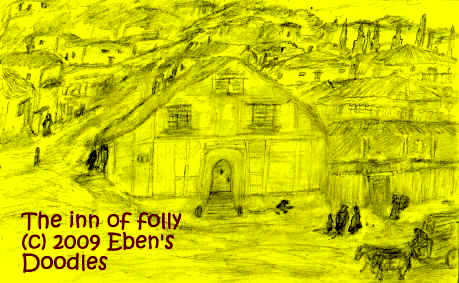
Ero and Damon had no desire to remain in such a foul and unfriendly place, but they denied their own wishes and feelings to see that the rescued man would receive the help he needed to recover his strength. So they stayed close by him for the next few days, and it was an ordeal for them the entire time, as the inn carried on with all its ribald partying by drunken debauchees day and night. Crimes and thefts and follies and immoral acts that could not be described--none of it dared come in the door that Damon and Ero guarded like two fierce sheep dogs.
At last the man regained enough strength to speak to them and even move about the room with Damon or Ero holding his arm. He started telling them more about his life--how it had once been easy, with much gold flowing from his rich patrons into his money belt, but with advancing age, his voice had grown thin even as his beard lenthened, and the king's women particularly did not invite him up so often to sing of lovers' exploits and whatever else they thought might amuse them at their parties. As for all the noble songs and lays, the Song of Roland, El Cid, Arthur and the Round Table--they no longer wanted to hear them, much preferring the racier tunes and lyrics about adulteries and betrayals. If he had been able to find another line of work, he would have done it. But abject poverty stared him in the face, whenever he sickened of what he was singing about, and he could not stop for fear of it.
"I am feeling my strength increase apace in my bones again," he remarked to the knights, as a maid came with his dinner and set it down beside him on a small table.
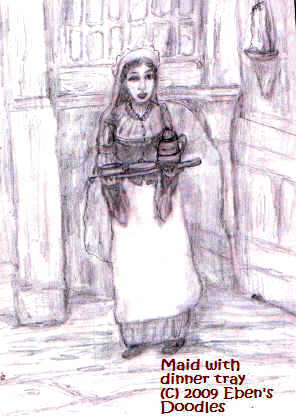
He waved her away when she went to try to feed him as before, but though she went toward the door, she did not entirely quit the room and remained still listening to him as she stood in the shadows. Her name was Minnie Avannches. Her twin brothers were of the age now for pages, and she had high hopes of suggesting them to the knight or even to the old minstrel. The courtiers of the castle who traveled through the village, never stopped, as they beheld the village and its inhabitants with utter contempt. But her brothers would make fine squires someday, she thought. As for herself, well, she would be married off to some old man of some means, a cobbler perhaps or a baker, and that would be all the good fortune she could expect.
"Later, later perhaps! I'm not hungry at the moment--how they stuff a person around here! Pork with drippings, honied ham, quail and goose with breaded mushrooms, sauced lamb, breadstuffs, gravies, cheeses, blackbird pie, grog and malt beer and wines and ale and sack...! Now, perchance you gentlemen will be quitting this place, and I shall lose your good company! But I pray thee, abide with me a bit longer. I have something for you to consider-- will you do that? I cannot ask you to do anything more for me, but though I haven't the gold and silver for your just reward for saving me, I will yet do something for you, if you are willing?"
"We ask nothing of you, sir, but that you be of good health and prosper as you once did! We perceive you have a good heart, and wish you success, but we must be going as Our master has commanded that we go and tell the words he gave us to the whole mount."
The old minstrel was taken aback. He cocked an eye at the knights.
"Your lord commanded you what? What were his commands to thee? Pray, tell me--"
But they could have held back their words to him, for when they went to explain the Lord Yeshua's commandment--to warn the people they met to flee to the Lord's ark, lest they be all consumed in the coming fires--they found he had literally dropped asleep. He had slumped back down, sitting back on the bed, his head fallen down on his chest.
"Sir?"
They heard someone clear her throat. Then:
"Sir?" Damon and Ero hadn't noticed the maid, they thought she had gone out, and were startled to see the speaker now creep out of the shadows. She bowed to them both.
"What is it, Missy?" said Damon. "Are you needing something?"
"No, not for myself sire. But I ask your great favor, sir, that you consider my two brothers for service."
"Oh? What could they do for me?"
"They are growing to be striplings, sir, and wanting some honest trade to enter. What future is there here in this small village? I don't want them working in this--this place! It would work great harm on them!"
All the time of her little speech she glanced fearfully toward the door, as if she might be overheard.
"Don't be afraid, you can tell us what it is on your heart, Missy. Please continue!"
"My two brothers require work and guidance. They are of age to be pages to a knight. They have no suits and equippage of their own, but could you still take them. My father was the blacksmith in the village, but he has died of black lung, and my mother is not well, so I work here so we may be provisioned. But my brothers--their appetites--well--"
Damon and Ero glanced at each other and laughed. "Yes, we understand what boys can eat! Bring them here at your convenience. We will speak with them first."
The little maid turned to go, but Damon remembered and stopped her. "And their names and ages?"
"Henri and Louis, and they are aged both twelve years, being twins."
"Splendid, just the age to start their training to be squires, so bring them here when you are able. Perhaps the gentleman here will look kindly on them and engage their services. He needs pages to run errands and look after his equipment."
The maid smiled profusely, bowing repeatedly, and backed out of the room, knocking against the doorframe and dropping her tray and utensils, but hastily gathering them sped away. A few moments later the knights heard a clatter of the same tray and utensils, and obviously she had dropped them again down the stairway!
The knights lay the old man gently on the bed, covering him with his blanket. Yet less than an hour later, he awoke, and his eyes were bright. He sat up, then moved to the edge off the bed, waving aside the dinner tray offered him but accepting a long overcoat to keep his body warm. "I had a most refreshing dream, my lads! I would tell thee the dream, but no matter! Some other time! First straightway to the signal business I have to broach with thee!"
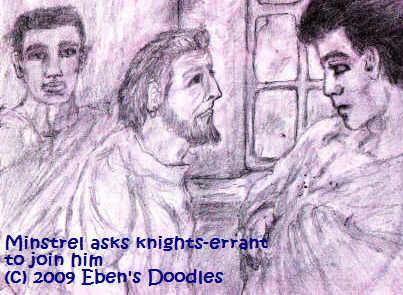
Ero and Damon listened as the old man rose with dignity in his bearing, speaking as a court minstrel who remembered better days as he played his lute and sang the verses he had composed and amused countless castle audiences, not to mention the king and his court high up on the mount.
"Far and wide, they called me 'Tithonus the Golden Mouth,'" he mused. "I had a deep lusty voice back then in my youth and even into my prime I could draw a multitude to hear me sing. There was not a song of heroes I did not know and could not sing perfectly, without mislaying a single rhyme or line!"
His eyes glittering with his grand memories, he seemed to look afar and forget where he was for a few moments.
"I--I don't recall from whence I come, there has been so many changes hereabouts in latter days, but always find myself on the road approaching the village and the Mount at this precise time of the year, only the storm broke upon me this time..."
Then, with the memory of it still fresh on his mind, he returned to the reality of the scene at hand, seemed a little confused, then recovered his train of thought. He offered them a position with him in his entourage. He had a feeling this was his last venture of this sort, and he wanted to do the best he possibly could and perhaps win a stipend or income from the king! They would assist him at the court, and draw many a eye of the beautiful ladies, who would all the more gladly have him, an aged singer of lays and epics, when attended by such noble and handsomely appointed young knights.
If either or both sang, that would also help.
Did they sing? Did they compose and quoth courtly verses?
Damon shook his head, but Ero could not say he did not do such things. Being Greek and born and bred in the isles, he too was a born poet and a singer, and he listened to the minstrel describe his offer and the duties it entailed with growing interest.
The minstrel turned to Ero. Would he join him in his singing ballads and love lays at the castle? Maybe he could slip in a noble song or two of a grand hero of old--"Jason and the Golden Fleece," for one! Or, portions of the Iliad, for another.
He could also use Damon as a knight attendant to present a more stately impression. All they needed were some mounts suitably caparisoned and plumed to make a splendid showing at the castle. "But all my baggage of fine suits and velvet and brocade capes and plumed hats and gold-engraved sword--except for my lute, they were all lost, with my horse!" the old man suddenly lamented. "Alas, my lads, the cruel waters swept them all away!"
"Not all lost," Damon smiled. "While you rested we have been away for a few hours, and when we climbed down the cliffs, we found your finely crafted things. You are not to go without them. Go see for yourself, sire! We can take you to them at once.
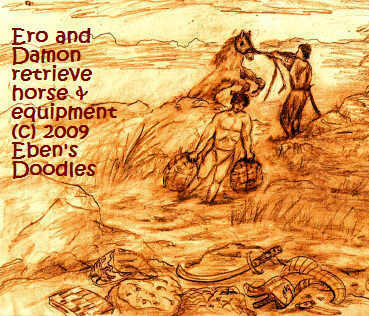
"Is this true, lad? I can scarce believe it!"
Damon went on, as the old man seemed close to tears but anxious to hear how they fared. "Yes, your fine things are now drying on racks in Mistress Follie's kitchens, with an attendant I ordered stand and watch there to see the things were not stolen, and most seem to be all right, and you can see for yourself what can still be of use to you. Your horse too is in the stable, and will be mending from his bruises and cuts. I checked him over, sire, and he wasn't lame as you feared, just had a bruised forelock on the right leg, and should be recovered soon."
The old minstrel was delighted. He clapped his hands together. He must go at once, hanging on Damon and Ero's arms, to see for himself in Mistress Follie's kitchens.
The old minstrel was so overwhelmed, he was rendered speechless as he found it was just as Knight Damon described. He was so delighted and encouraged he gave orders for his things to be brought up to his rooms the moment they were dry, so that they could be distributed to the knights to add to their necessary equipment. These things he wanted to give them as a proper reward for all their service and kindness to him, including their greatest gift, saving his life from a certain drowning out on the high road.
Meanwhile, while Damon went to see to the minstrels' horse, Ero brought the lute that Tithonus called for. It had been carefully put out to dry in a soft, indirect light for days now, and had not cracked but slowly dried and was as good as new. After inspecting it and seeing it was not the worse for being doused in a stream, with only a leathern case to protect it, the old minstrel loosened a couple strings, and then moved a tuning peg or two, and a secret panel moved in the handle and two bright objects slipped out into the palm of his hand.
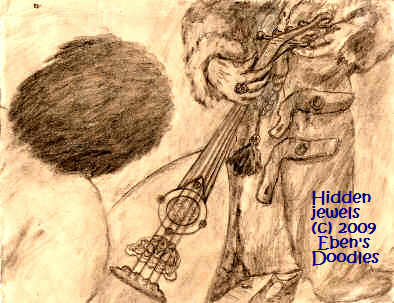
Smiling, he showed them to Ero, pointing to each gleaming stone.
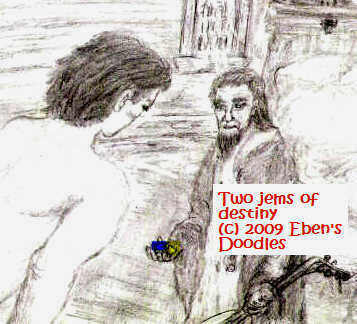
"This carbuncle is the blue star they say that once lighted the Ark that Noah and his family sailed over the tumultous seas of the Great Flood. The topaz--it is the bright, golden sun that shone on them once they opened the Ark's door and ventured forth into the new world over which God stretched his wondrous Rainbow of promise. They will now light our way." His eyes softened with a wistful, faraway look.
"They were to be my retirement, my lad! I earned them as rewards in the days of my greatest success and renown as a singer, when the whole world was a ring on my finger! But I have better use for them now, as I feel I will not need the little cottage and a servant and cook I had planned to comfort my last days with. No, there seems to be a better use for them. I have been lying abed for hours, awake or asleep I do not know, and these curious ideas and scenes keep coming into my poor old head--"
He slipped the huge jems worth a king's ransom into Ero's hand for safe keeping, then lay back, sighed, and told Ero what he had been dreaming. "I perceive you are a holy knight, my lad, and you carry a special sword of your own, that blazing torch of yours. In my dream I saw you with a red cross emblazoned on your naked chest, driving back all the forces of darkness assaulting you, wielding that torch as your only weapon! It was a most wonderful sight! And your noble brother knight, he too will play a great part in the coming battle. He will, as I saw in my dream, ride a fine horse one of these two jewels will buy for him along with a great spear for jousting. Now all we require is two experienced, trustworthy, squires, one for each of you--yet where can we get them? This village has no such clean young men available--they are all wastrels and scroundrels and louts by the time they attain manhood! Pfau! I wouldn't even consider using one of them to dust my chimney! But maybe we can go look in some other place..."
"Not necessary, sir! A little, sweet faced serving wench has offered her two brothers, twins, who are of age to be pages at least. Would you be interested to see them? She seems a fine girl, so unlike the other wenches of this inn, so perhaps her brothers are suitable too."
The minstrel was surprised. "Here, say you? You think there may be suitable people here? I doubt it! Ha! I wager my entire worldly pelf they would just as soon strip me of all my clothes and purse and possessions as serve me! Why, without your constant presence, in my condition, I would not sally forth from here with a single nightshirt to cover my nakedness--beaten and robbed, that would be my certain fate, then turned out on the public road to starve and beg from passers-by, now that I am reduced to this woeful, feeble old age! I've seen it happen often enough to better, stronger men, how could I hope to escape?"
Ero did not question what the minstrel said. He had early on seen enough of the inn and its denizens to know that the minstrel was not misrepresenting it in the least. It was an evil place, indeed, and anyone at its mercy could not expect to leave without losing something dear. All sorts of nasty-smelling, knaves and cutthroats, their hair and clothes and under-linens unwashed, beards matted with dirt and hanging in ropes and filthy with lice, men who had the stealthy manner of footpads intent on skullduggery and the eye of murderers seeking helpless or unwary prey--they infested the place and vicinity, waiting for an opportunity to pounce.
Then the main body of inhabitants were lawless too. A drayman's wife drove her cart so fast and reckless of life and limb, that she dragged the dog behind it to its death. Fights broke out at any time among the gamblers who crowded the doorsteps and any least shelter along the streets. Knives flashed, with stabbings, and the assailant ran off, leaving his bloody deed unpunished by the constable, who was too deep in his cups at Follie Inn to go do his duty and chase down the murderer. As for the bailiff and beagle, they too kept to the inn and its amusements. Merchants plied their wares, but cheated the people with false weights. The customers cheated the merchants, too, whenever possible, their offspring stealing items while the mother or father distracted the merchant. Spoiled fruit and vegetables were laid beneath the goodly ones, then the lot sold. Buttons fell off clothing from poor thread, colors ran in the first washing, patterns dissolved. Shoddiness was made to look fine enough to fool the most sharp of eye. Children were kidnapped and sold for slavery, and locked away, never to see the light of day--made to work on endless mean jobs assigned them in windowless garrets or, worse, in foul, damp basements and cellars. The money lenders of Rotten Row foreclosed on the houses of widows, after greatly increasing the rates on loans so that they could not repay them. Pawnshops did a thriving trade too, giving a pittance for valuable things, then reselling them at a huge profit when the owners failed to return with the redemption money. Butchers sold tainted meat, and called meat any name they imagined would sell it, rather than name its true, detestable origin. Animals sick and infirm and even dead, were carved and sold as fresh, good meats. Furriers did the same--naming rat and dog and cat and mule and even skunk by other names. The potter's wares crumbled or leaked when water or wine or milk was poured in, they were not fired sufficiently. The baker's breads were full of millstone chips, sawdust, and mouse tails, and sometimes the dough was left moist in the half-baked goods, since he was niggardly with his wood supplies for the oven. In Blind Lane, an uncobbled track just behind the jail, the worst miseries ran like open sores , the lane so overhung with foliage it resembled a dark tunnel. Here witches brewed potions of every kind, casting spells for a fee, and herbalists and fortune tellers too eluded the law of the Mount that forbade them in principle (but taxed them for the king's revenue). So it went in the village aptly named Strangways.
All this the old minstrel knew from experience, and which Ero too could testify having witnessed after only a brief residence at the inn and while walking the lanes.
Just then the maid, Minnie O'Flaugherty (a daughter of a Mutiny on the Bounty sailor and a native island woman), came in with the daily dose of posset, hot, cream-rich milk in a pitcher that was curdled with ale. It was medicinal, reputed to revive the ailing body, even being attributed with raising those with one foot in the grave. Seeing her, Ero was reminded of their previous agreement, and turned to the minstrel, pointing the maiden out:
"She is the fair, young damsel, sire. Her young brothers are applying for service as pages. Will you see them?"
The minstrel thought about it, then nodded his head.
"Since you have spoken for them, I have changed my mind. I should not be too quick to judge all men by the ones I find here. Yes, tell her to bring them in here eftsoon, so I may see how they answer certain questions. If both give me fair enough reply for their tender age, for I shall not suffer fools of any age to attend me, I will engage their services and pay them well."
Hardly able to contain her excitement, the maid set the posset next to the minstrel on his little serving table, then hurried out on her errand (hoping she would not be reported to Mistress Follie and suffer a tongue lashing and a beating for leaving her work). A few minutes later, just as Damon returned from the stable, where he had seen that his instructions to the stableboy were carried out rightly, Minnie hurried back, breathless, with her two twin brothers in tow.
A year younger than herself, and shy because they had no father to give them boldness, they hung back, disappointing their guardian sister, but she made them go and kneel beside the bed where the minstrel lay during the day, propped up by big pillows and cushions.
The sister retreated toward the door with her serving tray, then paused and waited, her heart beating hard in her breast, so anxious she was that the interview go well. Without success and favor of a patron, these two decent but fatherless churls had no chance of making anything of their lives, their prospects were so wretched in the dirty, crime-infested village without parents who could protect and guide them rightly. But if they were employed to serve knights, only then did they have a real chance to get clean out of the village, which she herself as a lone commoner female without a dowry could not hope to escape. She herself was doomed, but they at least had a chance to make a better life, and that would be her one comfort in the coming days.
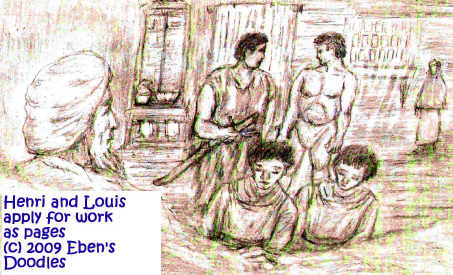
"You there, the one named Louis," the minstrel began, "what was your father's trade, and was it honest work he did?"
"Blacksmith," replied Louis in a tiny, soft voice.
"Speak up!" said the minstrel. "I want pages who will not strain my ears! So use your pipes like a man! Now try again."
"Blacksmith, sir!" growled the page. "That's better. But answer the question. Was he honest in his work?"
The boy looked uncertain, but as he thought, it was apparent he was searching his memories, and then he thought of something.
"Yessir! I remember he gave a woman back her money once when she said her horse was limping, though it warn't--I ran around to check on it, and it was standing just fine and dandy in the street. She was lying, sir, but my papa paid her back anyway, then she rode away and her horse did not limp once!"
"Fine story! Do you swear this is the truth? You did not make a word of it up?"
The boy cried, "My father would not cheat anyone, leastwise a woman!"
"That's enough, Louis my boy, I believe you. Now for your brother Henri, I set this question. If I command you to tell someone I am out, when I am in my chamber, will you obey?"
Henri darted a glance at his brother. "Remove yourself from the room, Louis. Your brother must answer for himself!"
Their sister hurried forward, snatched Louis by the arm and took him out. The minstrel turned back to Henri, who was very nervous by this time, and near to tears. "Calm yourself, my boy! Just answer truthfully, that is all I ask. Now again, would obey me if I commanded you to tell a visitor I am out, when actually I am in my chamber and wouldn't want to speak with him?"
The boy squirmed, and then glanced back where his sister and his twin had disappeared out the door. But suddenly he squared his shoulders. "No! I won't tell a lie for you!"
"Peppers and blackbird pies!" the minstrel cried. "You're both hired! I couldn't get better pages than you. Now, once you have your uniforms prepared, expect to be called to duty at any hour of the day. You are first to attend to me, run my errands, receive or turn away visitors--ah, truthfully, that is--and anything else a page must do. Will you do that, my boy?"
Before he could answer, the minstrel had the knights bring the other boy and his sister back in. There they received the good news. The sister's face almost flooded with joy, but she swept her apron up over her face as if to cover all her emotion, and left the room. The boys looked at each other, slowly realizing they had done well and would be embarking on a whole new life. They glanced back at the minstrel, and he smiled, and let Damon and Ero explain their first small duties to them, including where they would make their beds, and what their mealtimes would be.
Once that was finished, the minstrel spoke again. "Let them return now to their home, and take leave of their family, such as it is, and return tomorrow for service. If they require more time than that, let them have it. It wouldn't be easy, at their ages, to leave their homes and families and go to work for a stranger."
The new pages now returned home to spend some hours with their mother and sister and talk over the changes this service to the minstrel would entail. Then two days later they returned, without their sister, and and went and stood smartly before the minstrel, awaiting his instructions.
The minstrel eyed them for a moment, then looked very pleased. "I think they are going to both do very well," he later commented to Ero and Damon when the boys were gone on various errands. "I only had a problem telling them apart, so I thought of a way. From my stock of earrings, I had an earring put in Louis's right ear, and an earring in Henri's left ear. What could work better than that?" he laughed.
Daily feeling improvement and an increase of strength, the minstrel set to work. He began parting with his beautiful things that Damon and Ero had rescued from destruction or theft, apportioning them out to Ero and Damon, but mostly he had the pages in mind, as they were needed complete suits of clothes, head to foot. Some things had to be refitted, of course. He had seamstresses brought in, and then instructed them as to their duties. Patterns were cut out of paper, then the items of apparel he had to refit were conformed to their shapes and sizes.
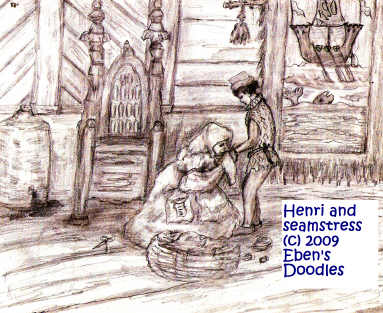
The cobbler was summoned, and shoes were made on the spot, so that the minstrel could inspect the work and the leathers used, and get the quality he demanded before he paid for it.
Damon did not require much outfitting as he could wear his knight's fine costume, of course, when they ascended the Mount. Ero? Well, he wasn't sure what the handsome young fellow would accept from his wardrobe, and so decided to approach him later about his costume. The horses also required proper gear and decoration. But even before all these arrangements were concluded, Master Tithonus decided to make his mind known to the two knights. He had himself dressed in his costume, and the pages in theirs, and called the knights and the pages to attend him out on the Jousting Field, where they could speak privately.
His pages bearing the minstrel's long, velvet train to give them practice, he proceeded with the knights to the expanses of Cheney Field, where no little bird could overhear and fly and tell the crafty king of the Mount of what was being said.
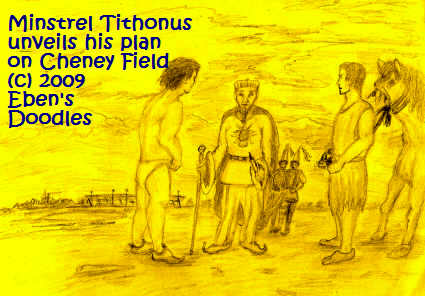
Their benefactor Tithonus had spent the proceeds from sale of the topaz for all their expenses at the inn so far and the cost of the outfitting, and the carbuncle remained. The knights were concerned that he keep the carbuncle back, in case things did not go as he hoped. Ero brought this up, since it was uppermost on their minds.
The minstrel shook his grizzled head. "Nay! I will venture it too, if I must. We must present a most splendid appearance, for we will not go as poor beggars to the court but as peers of the realm. Now I know why I felt I had to load up and bring all my fine things on this journey to the Mount. They will see this at once when we are presented--that we are their equals. Then I shall sing the best piece I have in my bag of songs, and Ero? You shall join me if my voice should falter--for it may fail me. You will learn the verses and sing them for them, wherever I leave off. Will you agree to that?"
Ero nodded, for he loved to sing the epics of his homeland, and hoped that the minstrel would choose one of them.
That business concluded, the minstrel turned to the more pressing matter on his heart and mind. "I brought you all out here, for this purpose. After entertaining the king and his court, whether there is a reward or not that is won by us, we shall challenge the king to a jousting contest. You, Sir Damon, being my knight to engage the pick of his best knights. Will you agree to that? If you win the contest, three bags of gold at least will fall to you, and two of the three will be mine as your lord, but I will ask only one. Then all the fallen knight's possessions, equippage, and wealth, will be yours as well. I only ask the one bag of gold, it will be enough for me, since my remaining days will be few, whereas you are young and your road ahead is long. What do say, aye or nay?"
Damon looked uncertain, though it was not about the division of the treasure. He wasn't sure he could fare well at jousting.
"Sire, I will do anything you ask, but I have no training with that long spear, the lance of the knights, nor much time in the saddle either. Could I be trained? Is there time for that?"
The minstel smiled. "Yes, there's time enough. It will not take much time to learn. The lance is simple to employ, though heavy to bear, and your horse only requires a brave master who will ride straight at the opponent, who rides straight at you. Both of you will be armored head to foot. Whichever one emerges alive after that fatal convergence, and still mounted, while his opponent falls to the dust, will win. Unhorsed, you suffer disgrace, even if you bear no wound, for that is a black mark against you to lose your horse to the challenger. Even if your horse is injured and I provide a speedy replacement, he will not bear the same armorial blanket and plumes as the horse you lost, and your appearance will be spoiled. So you must keep your horse under you and never drop your lance or your shield. And do not worry about the training you lack. I have sent word to the Mount to engage a trainer. They have plenty such for hire. One I know by name returned word for you to appear here on the morrow, just after dawn. Will you do this? Have you the courage for the task?"
Damon nodded, though his face was rather pale.
The minstrel looked from one to the other of his champions, then motioned to his pages to bear his train and he started back toward Strangways. Then he paused and looked round at the knights, who were not following. To Damon he said: "See what thy brother wishes for his costume. I forgot to ask him, and now I am weary and must seek my bed. Will you do that, and then report to me what he requires. I will get the things made for him."
Damon glanced at Ero rather sheepishly after the minstrel and his pages were gone.
"Tell me one thing, brother, why do you wear so few clothes? You have done this since I first I met you."
Ero shrugged. "I feel no need of more, that's why. I am Greek, and we have a saying: 'Clothe a pig, he's no less pig; clothe a man, he's no more man.' That's why we Greeks have, since the earliest times, put no great stock in clothes. Clothes do not make the man. Whoever said that was a fool, and certainly not a Greek!"
"Really?" Damon laughed. "But don't you feel the cold sometimes? I know I do, even with all my clothes!"
"Yes, I do feel the cold sometimes. When I was flying high with the mast, it was cold at the high altitudes. But if I do feel cold, I just press my right wrist here." He showed Damon.
"When I do that, these buttons pop out. I can press the first two, to feel warmer, or even warmer. The third button will cool me if I am too warm. It works very well for me. Don't you have them too?"
"Not that I know," replied Damon, pressing his wrist and finding nothing of the sort.
Damon still had a question. "But people look at you, and it makes me uncomfortable at times, to see you go about with so little in all sorts of weather. They don't know or care you are a Greek runner. Isn't that reason enough to take the costume Sir Tithonus will want to give you?"
"I didn't know he intended one for me. I should be happy to wear it, only I don't feel strange as I am. It is all I need, my native Greek skin. All I really need is a pair of good running shoes. I can run better that way, without clothing to slow me down or get in the way."
Damon clapped Ero across the shoulders. "That's all right then with me, if you prefer your skin over a lot of clothes. Shall we go and tell the minstrel what you decided? He will then be spared the expense and trouble. He has enough work to do to make his horse and yours presentable to the court, I think!"
"Wait a moment," Ero said, almost as an afterthought. "I forgot something. I have something else to show you."
He reached down and pressed both ankles with his finger and immediately small wings popped out. Then he gripped his hands at both wrists, and shot upwards, astonishing Damen, who stared as Ero rose high up over the jousting field. He was still standing there awestruck as Ero lowered to the ground, laughing at Damon's expression.
"This might come in handy, brother!" Ero said. "I think we could both fly together, if you hold tight on to me. Want to try?"
Damon jumped at the chance. He gripped Ero round his middle, and then Ero's winged feet propelled them upwards once again, and he could, by leaning, go any direction he wanted. When he wanted to descend, he merely put his feet together.
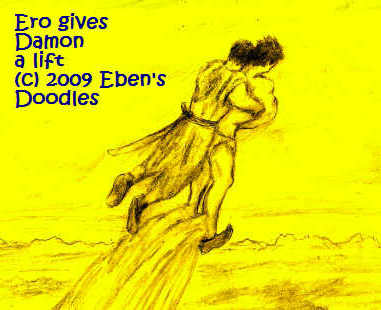
This was a most amazing spectacle, and if anyone was alert on the battlements of the Castle Mount, they would have not believed what they were seeing. But there were clouds covering the Mount at this time of the afternoon, and so they might not have been spotted flying like two big herons or storks tied together.
Damon could not get over it. "That's wonderful, what you can do! Why didn't you show me that before? I would have loved to let you fly me anywhere you would take me!"
"But I didn't need to use it before," said Ero. "I had the flying dome, and then the mast. I have neither of them anymore to use, and when Yeshua told me at the dubbing ceremony that I had such powers, he said I may need to resort to my wings from now on, in a pinch that is. If anyone from Strangeways saw them, they would probably try to kill me to for them! So you see why I haven't been flaunting them."
"Wouldn't they now!" laughed Damon. "By the looks of most, they would just as soon cut off your feet rather than your head, if they thought they could strap them to their own feet and fly with them! Have you ever seen such degenerate people as these Strangwayans? If they are that wicked and shameless in the village, what will the people be like on the Mount?
It was meant to be amusing, but the moment that was out of Damon's mouth, they both realized it was no laughing matter. Sobered by it, they walked back to the inn in the village without another word.
Ero, however, paused at the door. "But brother, do you think you will be trained well enough to beat your opponent? The loser often dies in these jousting matches. Aren't you jumping into water that's too deep, when you're just a beginning swimmer? You can be trained, but your contenders will have been in a number of matches, and known every trick there is--whereas--"
Damon considered Ero's caution, but his eyes were steady as he faced his brother-knight. "Don't worry about me," Damon assured him. "Yeshua told me back at the pavilion that this would be coming, and gave me this word, 'For the weapons of our warfare are not carnal, but mighty through God to the pulling down of strongholds.' I believe He's going to help me win the victory, so I am not afraid. He also said to me, "The horse is prepared for the day of battle, but deliverance is of the Lord."
Ero smiled. "Well, if I see you are in bigger trouble than you can handle, I'll run and let you grab my ankles, and off we will fly out of danger!"
"Thanks," laughed Damon, as he pushed open the door, "but it won't be necessary. You'll see. If I do all I can, which is the possible, then Lord Yeshua will do the impossible. He promised me He would, and I believe his word."
Inside the crowded dining room, Ero and Damon found it was business as usual: assignations for fellow thieves for division of the night's spoil from various robberies and murders, men impoverished by gambling away their houses and flocks, seeking to pass the favors of their wives or their daughters to the highest bidder, gluttons and drunkards drinking and eating themselves to death, children in tattered, dirty clothes looking for lost fathers or lost mothers, whores selling themselves for a mug of ale or gin, a man bawling at the top of his lungs about his money bag being snatched while he dozed off in a puddle of spilt sack under the table, a woman dancing and screeching out a dirty song to the music of a harmonica, draymen and carters thumping their mugs for penny refills of the cheapest ale, a forgotten babe in a blanket wailing for its mother, an old man sitting sprawled on the filthy floor where he fell after being clubbed, his bloody head still bleeding, and no one paying him the slightest attention.
Observing them, Ero and Damon were struck with the feeling of imminent doom, a sense that had grown all the stronger as days passed since they climbed up to the road, after going to retrieve the minstrel's belongings. They had seen the steam and the fiery glows in the side of the cliff as they climbed--it was clear to them that what Yeshua said was going to happen, as the fires built up within the Mount, flooding up from deep within the earth. How long before the fire burst out, destroying everything and everyone in a vast explosion of fire and smoke and ash? It might happen in weeks, or mere days. But they sensed it would not be long in coming. How could they warn these people of the fiery wrath to come? Who among them would listen?
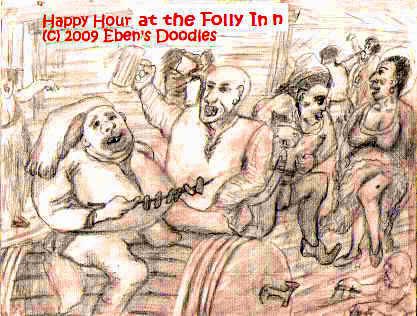
They knew they couldn't be heard amidst such din and confusion, so they started to pass through to see how the minstrel was proceeding with the instruction of the pages.
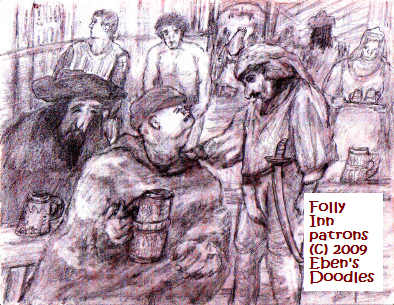
But this time through they were not going to pass quietly. A butcher who regularly passed dog meat as lamb and worse things too rose up, blocking their path, and a number of his cohorts at the cups also joined him.
"Not so fast, gentlemen knights! Here I am with my friends, enjoying a cup or two of cheer, and see you don't imbide. Join us! We needs fine fellows such as yourselves--you might have a goodly story or two to your names, exploits of knights and some such thing, and we are all ears to hear ye out! Sit ye down! Let us join company!"
Damon and Ero looked the speaker and his "friends" over, and decided it was not so friendly as the butcher made out. Ero nodded toward the stairs.
"Thank you, sirs, but we must decline your invitation, as we have to attend to our patron. Yes, we do have something very important to render you that you should hear. But--perhaps some other time is better."
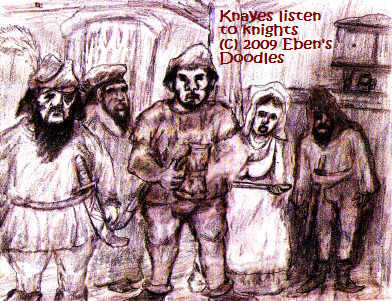
The butcher turned to his cronies, aping Ero's remarks. "Hear ye that, my gay blades! He's attending to his patron, says he! Perhaps another time-- la la la! What a fine and fancy gentleman he is, and a noble knight besides, who can't dirty himself with the company of common lackeys such as we be! Is that to your liking, mates? Is it?" The men, at his call, rumbled and growled and cursed. "How dare he call us dirt! Let's show them a thing or two! These foreigners come in here with their dainty airs and think they can ride over us with their prancing white horses and we don't have a thing to say--it is our desserts, they think, and we ought to take the whippings of a dog. Well, we'll show 'em!"
Shoulder to shoulder they pushed forward, knocking over chairs and drawing their weapons at the same time.
Ero and Damon did not move, though Damon had his hand on his sword. Damon suddenly had a word for them: "The Lord says to you, Do not rob the poor because he is poor, nor oppress the afflicted at the gate. For the Lord will plead their cause, and plunder the soul of those who plunder them."
Anyone present could hear these men who heard this rebuke gnashing their teeth, and they were all the more furiously going to throw themselves upon Ero and Damon. At that moment a screeching voice rang out--and the butcher and his gang heard it and paused. Mistress Follie came storming out and confronted them. "Git ye back into your stinkin' kennels, or I will throw you out myself! You dare touch the retainers of my good, paying customer, do you?"
She raised the big wooden ladle and the men fell back, as if cowering before her, though all she had to thrash them with was a wooden spoon.
The entire room, which had grown deathly quiet, now began to get noisy again, and everyone turned back to whatever they were doing. The butcher and his troublemaking friends also turned and slumped back at their table, gazing up at Mistress Follie, who hurled a few choice curses at their heads, then departed.
Ero and Damon went first to check on the minstrel's fine belongings still drying in the warm kitchens near the ovens. As they saw that their guard was doing his job properly, they turned, but happened to noticed the street boys, most fatherless and abandoned, gathered in the merchants' delivery door.
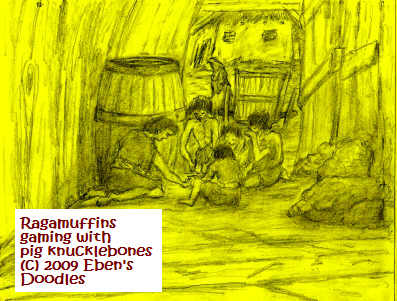
He knew they were considered rubbish to be kicked around. No one had ever been kind to them, he knew, unless it was their mother when they were a baby at the breast, who was probably lost to them now, by the looks of their dirty rags half-covering their scarecrow limbs. Damon went over to them, and they scrambled to gather their knucklebones, as most men gave them a kick if he could as he passed, just to be mean to them. Shrinking back against the wall, as if he was going to cuff them, the boys eyed him warily.
Damon smiled, extending his hand. He had something for them, a coin, but they snatched it immediately, for they never had money, unless they could steal it. "This is your wage for something I want you to do for me. Get yourselves some sweets from Mistress Follie and share them equally, but be sure and guard this door well, we don't want anyone coming in here to take things!"
"Yes, Sir Knight!" they all cried in a chorus, and Damon had to hide his smile, as they looked so earnest and brave, after he had hired. Then Damon and Ero went up to see how the minstrel was faring. They found him anxious to give them instructions, and had a jousting trainer beside him, ready to meet them.
Even as this meeting was taking place, a courtier who kept his ear close to developments that could affect the king and his interests, was giving a word of caution to a Knight of Dishonor--strangers were in the castle village outside the gate, attached to a certain minstrel, and rumor was that they were going to be trained for jousting matches by an expert trainer the minstrel had found the money to hire.
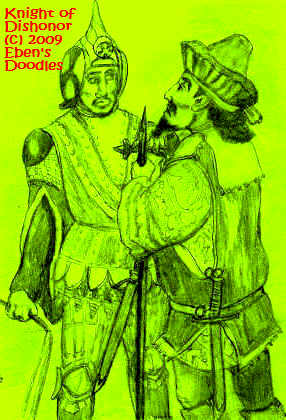
Noblemen will come from all parts to contend for the prize. That was the usual thing with jousting matches. What did this business about the old minstrel and his friends matter to the Knight of Dishonor? Very little, of course, but the courtier, experienced in the behind the scene workings of the matches, thought otherwise. These strangers were not the usual sort, he said. He had seen them pass in the streets, observing how strong and intelligent looking they were, and had heard from a source he had at the inn how they had rescued the old minstrel when he was in dire straits on the high road, and then was retained by him to be trained as knights for the coming matches. That proved their cleverness, did it not? The minstrel was their means to gain access to the social circles of the Mount, including the matches. They must have taken advantage of his gratitude for saving him. But in return the minstrel had something to gain by their use--what was it? Yes! Why would he do this for them unless these young men were champions who stood a real chance of winning the grand prize--booty he would naturally share?
"Beware the dark horse!" the nobleman warned the knight, who was rather dark himself in costume, and he nodded, and went straightway to inform the other Knights.
Now there were other fine details that need not be mentioned by the worldly wise courtier. The Knight of the Axes need not discuss them with him, as they were well-known, accepted axioms in their society, particularly figuring in the arena of jousting.
What made the newcomers unpalatable was simply this: displaying a certain moral caliber as they did, whether feigned or real, a troubling question arose concerning their future performance in the joustings. Would they take a fall, as newcomers must, in order to play the game as it had been played for time beyond counting? The prize was rotated, from knight to knight, on the basis of seniority and noble rank--it would never be let go at the onset to a newcomer, a foreigner, a parvenu. And if these fellows would not play according to the rules and take a fall, then they would be eliminated--they would not ride away from the field! On the other hand, if they were wise enough to cooperate, the system would work well for them, in a given time. But they must know they couldn't just ride roughshod in, at the minstrel's invitation and under his banner, and seize the grand prize and carry it off!
The courtier glanced toward the inn, considering if now was the time to make his approach on the foreign knights. He rather wanted to intercept them on their walks, loathing the inn's company and the many watching eyes that were greedy to horn in on other people's business. But if they didn't come out, he could not stand there all day and draw attention to himself.
So the courtier waited for a few more minutes, then slipped away toward Blind Lane, as he had business there.
The vulture-lizard's emissary had no more quit the public square when Ero appeared at the inn door, descending the steps with a tray of food, the lunch the minstrel declared he had no taste and appetite for. "Might I give it away to one of the beggars?" Ero asked. "As you wish!" the old man said. "But hurry back as soon as you've done. We have more to go over concerning the joustings. As your knight's squire, you need to know all his duties well, learned by heart, so that you can carry them off flawlessly. A single mistake will be fatal to your knight in this game. You'll see! But if you are careful, you will help him win the grand prize! Think of it! It is more money than I was awarded in all my years of minstrelsy! And I would have been rich if I hadn't spent and squandered almost all of it on fine robes and gewgaws and-- the charms of women! Ah! How foolish I was in my youth! But you, lad, are just the opposite, and your knight too--he isn't a bad sort either. How you two shine-in this dark and dirty place--"
A beggar was not long in coming. He was the same that crept about the floorboards of the inn, searching for dropped morsels of bread and bones with some meat or gristle on them that the diners threw down for the dogs. Sometimes a sot would drop a half-filled bottle of ale or stout, and then he would drink himself insensible. But that was rare--it usually poured out before he could catch it.
Ero slowly approached the beggar that came scraping and dragging his way slowly toward the inn. It was painful even to watch him. His useless legs and feet bent back and off the ground, all the wretched fellow could do was use his hands and arms to pull himself forward while his body dragged on the ground. No one would make him a a little sledge or cart to help him along--he was too poor to have one made too by a carpenter. So he had to make his way everywhere as a kind of foot crushed, wounded beetle might, that had lost the function of its lower limbs.
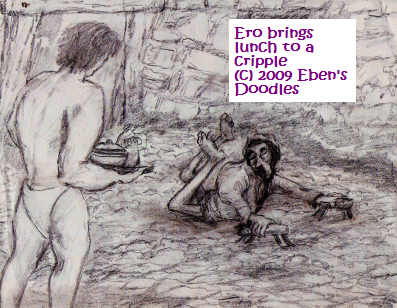
Even if he could do something for the village's poor, there was nothing he could do to bring law and order to the surroundings. The Mount had hundreds of knights and soldiers stationed in the various forts, but they never left their posts to police the country round about--the king being content to tax his subjects while relieving himself of the expense of providing them basic protection against highway robbers and murdering vagabonds. Poor mendicant friars, travelling about to beg alms for the poor they sheltered and fed, were even attacked on the high road, robbed and murdered for the little money they carried.
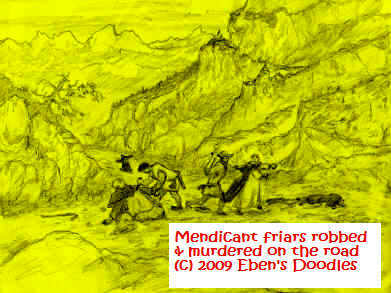
In this particular ambush, they got precious little for their efforts, even if they were rather small efforts, due to the fact that friars went about unarmed. That was why they killed the friars, they were so angry with them for being what they were, mendicants begging for other mendicants, poor friars helping their poor brothers and sisters in the lowest classes. When Ero found the friars, two were dead, one was dying, and one fled away. The dying friar was struggling to say something to him, his lips moving, and his eyes fastened on Ero with a gleaming urgency. "Lad, lad," he whispered. Ero couldn't make out what else he said, so he raised the man's head as gently as he could in his hands and bent close.

Then he heard, "There is a certain poor widow in the village, a washerwoman on Blind Street, her daughter is very ill with fever. I came with something for her Please take the feverfew in my bag. Give it to her. Please! By the mercy of God, do it! It is the medicine that will save--"
The man's eyes glazed over.
Ero bent closer and could feel no breath on his cheek. He laid the man's head down with care, then drew the cowl over his face.
He looked around. "Feverfew"? Did he hear right? The friar said something about it being a medicine for fever. Could he find it?
He searched the area, and then saw a bag with a cross stitched on it torn open, and around the bag was scattered a tufts of what looked like dried weed. Was that the Feverfew? He stuffed it into the bag, and then, because there was no time to lose, left the bodies of the poor friars undisturbed where they lay and went directly into the village.
He got some ugly looks from various passers-by and loungers in Blind Street, but he pressed on, glancing in at one hovel after another, asking anyone who would listen to him about the washerwoman. Finally, after being given some choice oaths and some thrown slop water from out a window, he was told where she lived. He came to the door, and it was partway open, so he looked in, then entered as he saw it was full of wash lines and laundry. This had to be the place!
He found the widow hard at work beside big tub of soapy water, scrubbing out linens on a scrub board. She looked up and saw him and her hands froze on the scrub board. In the room was a little boy, clinging to the tub and staring at him, his eyes like saucers.

The boy too looked as thoughhe had never seen such a sight before as Ero. Ero, wanting not to frighten them any more than he had, held out the friar's bag, and she seemed to recognize it, for she sprang up and then darted toward him, her eyes fixed on the bag.
Before he gave it to her, he explained. "It is the medicine the good friar gave me to help your daughter. He cannot come with it himself, for he was waylaid by vagabonds on the road and--your daughter, is that she?"
He glanced toward what looked like a wooden feed trough, and in it a little girl lay, her hair wet and tangled against the pillow.
The mother seized the bag and brought out the herb in her hand, her eyes widening.
"It is the medicine the friar sent me to take to her," Ero repeated. "He has been murdered, I regret to say. I found his body with the others of his order on the road--"
The washerwoman's eyes suddenly began to pour. She wiped her eyes with her apron, then hurried to the stove and dropped the herb into the hot water boiling there in a pot. Ero watched as she soon poured out some into a saucer, and she hurried over to the crib. After blowing on the tea, she got her daughter to accept a few sips of it.
She did not turn round, and continued to sit by the crib, crooning to her daughter as she urged her to drink more of the medicine.
Ero saw no reason to remain any longer and was showing himself out, when he found the widow darting out to stop him.
He turned back to her.
"Thank ye, sire! I have no money for ye, will you accept a fine coat I have for a gentleman knight?"
It would be unthinkably uncivil to refuse her now, Ero realized, so he too the sumptuous garment. The moment he looked on it he realized it was a royal prince's robe, and he was astonished. How could an impoverished washerwoman ever come into possession of such? Had she stolen it? She would be hauled up before the king's magistrate, sentenced and hung for that.
As if she divined his misgivings, the woman cried out, "Nay, sire! I didna' filch it! She's mine. I washed her up fine and ironed her for the fine knight, but he never showed--he forgat it, or he died. I never did hear which. So she's mine for the keeping, for the cost of the washing and pressing, and it's been years I kept it nice in a chest, just in case --with rosemary and thyme to keep out the moths. But it's been so long, he must have been kilt in the joustin's or such. Sire, you take it, wear it proud, for it is yours. I have no other way to repay ye!"
Ero's mouth dropped open. He didn't need to be repaid, and leastwise was he willing to deprive this poor woman of a princely garment she could sell and gain quite a living by. But there was nothing for it. What if he refused? Wouldn't she be crushed by his rejection of it?
Her question next interrupted his seeking a way out of this. "Where is the little father? I wish to thank him too. I know the medicine is working. My daughter is breathin' better already, she is! Her sweat is coming down too, she's dryin' out, she is!"
Ero was much relieved to hear that. But having to her the grim facts about the friars was very hard. But he did, and she wept right where she stood, her tears coursing down her cheeks while her red, scalded and scaled hands reached up to tear at her own cheeks.
Ero had to say something, to see if he could comfort her somehow.
"He wanted you to have the medicine. It was his last words, telling me who you were, and how your daughter was very ill with fever, and what I was to do to find you. They were his last words. But apparently they saved your daughter's life."
The widow stopped weeping and wringing her hands, gazing at him with red eyes, then a look he would never forget lit her features as she gazed away toward the road. Bending down, the widow vanished back into the hovel. When she returned, Ero held out the garment. "Madam, I really can't--" he began, but she paid him no heed and ran up the street, toward the high road. He watched her stop in a a couple doorways, and then several men came out and followed her toward the road. Ero understood that they would see to the friars' burial, so he left Blind Street and made his way back to the minstrel's apartments.
When he reached the inn, dinner was being served. But Ero took the pages and the dinner before they ate anything and went to see Damon. One of the pages carried the knight's robe that the widow had given him. When Damon saw the robe, he forgot about his dinner. "What is that?" he asked.
Ero told him everything he had seen. It was still so fresh, he had no appetite, and neither did Damon after he heard the whole story. Together they sat and were silent for a while as the pages consumed the dinner Damon handed to them.
Ero turned to his brother knight. "Should I sell it and give the money to her? You should see how meanly she lives with her children, and how hard she must work to support just the two of them! Her patrons must pay her next to nothing! It is a shame, since they could afford any price she named, since they can wear such clothes as she gave me."
Damon thought, then his face lightened. "I'll talk to the minstrel. Perhaps he has an idea. He might think of some more employment for her, something better than washing clothes for miserly lords and ladies."
Damon left the pages at the stable to keep watch on his horse, and took leave for the evening, to return to the inn with Ero. Together they presented the needy case of the widow to the minstrel.
He heard them out in silence, then nodded for a while, and finally he slapped his hand against his thigh. "Of course! Just the thing for her! It's a proper line of work, respectable for a widow to do. She'll be a cook for me, our private cook! I never met a woman yet who couldn't make a meal for a man, so why must I rely on Mistress Follie's fare--she will poison me yet, for a good enough sum! How do I know what all she slips in my sauces and stews? It might be a pox to carry me and you off, for all I could tell. So it's done. She's Cook! Send for her at once. I doubt she'll refuse."
Damon and Ero, very glad to hear of a solution, hurried off on their errand. In a short time after the friars had been given proper burial, the widow had gathered what few possessions she wanted to carry away from her cottage. Ero and Damon hoisted the widow's things on their strong backs, and the widow carrying her little daughter, her son tugging at her skirts, they made their way to the inn as every eye in the village seemed intent to watch them go.
It was amazing how quickly news spread among the poor and sick and elderly and oppressed of the village, that there was a man, undressed as a slave or a swineherd would be, and yet another dressed as a knight, full of love and compassion in their midst. That became apparent whenever Ero went out from the inn, and then he encountered these wretches, and did the best he could for each one. The minstrel paid Ero's wages promptly and generously, and Ero used them all for feeding and clothing and buying medicines for the people who waited hours in the streets for him to come by. Damon too helped all he could, whenever he was not practicing on the jousting field.
One time he was on Pacific Avenue and the fish-monger came by pushing his long box of fish. The stench was terrible, for the Mount's king and court always had first pick, then sent the rest back down to the village to take what was left, and by then the fishmonger's catch was half-spoiled and fly-covered. Yet the people still had to pay high prices, Ero noted. They had no choice but to pay them too, along with a stiff tax for the Crown. Actually helping to cover the smell, a fumerol had opened up nearby, and its fumes, though sulpherous and smelling like rotten eggs, at least counteracted the rotten fish odor.
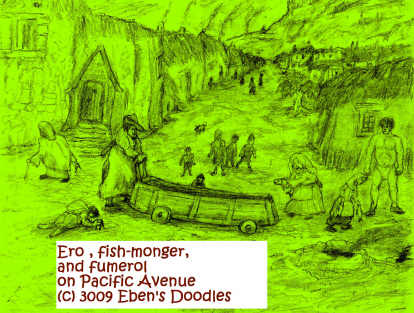
But his training demanded many hours each day, which was necessary if he hoped to learn all the protocols of the contest of strength, endurance, courage, and prowess with the horse and lance. Of course, such things were not necessary in a rigged contest, but Damon did not even know he was training for a pre-arranged fall. The wicked idea never even entered his mind.
The feminine component was not far behind the masculine element in all this preparation for pitting horse against horse, man against man, lance against lance. Little birds seem to carry news to the highest towers of the Mount, for the ladies knew all about the two new contestants that had come on the scene--actually, a knight and his attending squire, and the two pages they had acquired as well. With the necessary equipment, there was no keeping them from challenging any warrior of the Mount and in the king's elite circle. It was clear they had come to do this, and the ladies, from the queen on down to the lowest chambermaid and scullery drab, were already manuevering to get more information, and if possible, a word or two from them.
Elizabeth the queen was not to be upstaged by her inferiors, and so she wasted no time and sent out her chief lady-in-waiting, Lady Margarethe, to take a close up view of Knight Damon on his training exercise field. As for the king, well, he had his mistresses, and so she felt free to engage in similar dalliance. In fact, she felt propelled to show everyone she was still attractive to men, even if her own royal spouse picked the blooms in other gardens than hers.
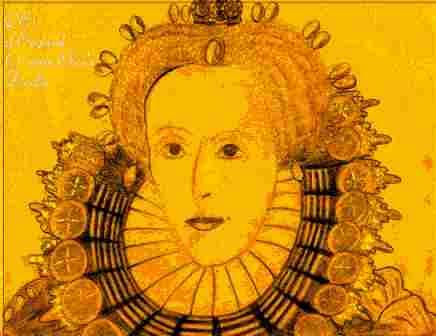
This was the queen's royal perogative as a monarch, to do as she pleased, and in this highly advanced era of sophisticated toleration, an age of courtly love and knights paying nightly visits to their lady loves who, more often than not, happened to be other men's wives or mistresses, nothing could be said against her use of it.
She herself could not condescend to go personally on such an spy's errand, but the countess's eyes were just as sharp and good as hers, she wagered. Lady Margo could answer all the questions she had about Damon, who cut a most dashing figure of a man to her imagination, and so allay some of the fascination she already harbored in her heart and which already disturbed the slumbers in her royal bower.
Calling some attendant knights and squires and pages to attend her messenger, she waiting impatiently after they departed for Cheney Field.
Lady Margarethe herself was impressed as she viewed the wonderful physique and agility and courageous pricking of the young knight being run through his paces by his trainer. Would he be the one to win the grand prize this year? she wondered. She thought he might have quite a good chance, having seen the knights of the mount perform in past matches. It had all bored her to watch the games, as everything seem so routine and without any real excitement. Bets were always laid on the contestants, but somehow everyone seemed to guess who was going to win, so the stakes were not very great and the gambling takes were lower year after year, as there were few dark horses and upsets, if any. But this newcomer seemed to her eyes to be different from the others. He had a vigor and beauty and presence the others lacked. There was a shining quality about him, unlike the others. Her blood ran quicker in her veins as she watched him dash first one way and then another, leveling his deadly lance at the leather targets set up at opposite ends of the jousting field.
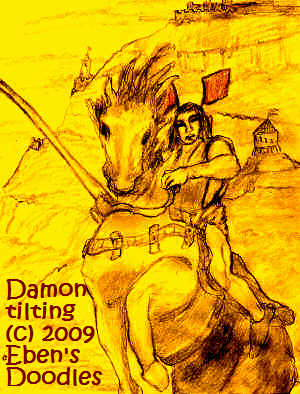
Never once did he slacken his pace or swerve or make a misstep. His horse was obedient to everything he commanded too. Together, they were a magnificent sight to her eyes. She could hardly wait to tell the queen, "No one at the court tilts like him! And he wields the biggest lance you have ever seen!"
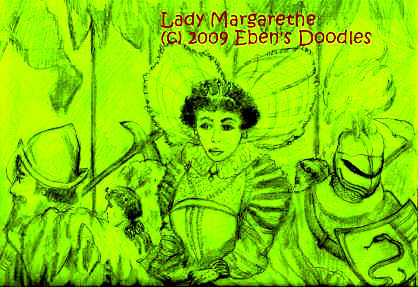
The Queen and Lady Margarethe were not the only ladies who were vying for Damon.
Crown Princess Egbertine also had her eye on the dark horse, the young knight in the service of the old minstrel, Tithonus. Like other aging beauties at court, she vied (with poisons for rivals if need be) to maintain her social position, by laying claim to the most handsome and dashing knights for her lovers. She would die before letting any other lady take what she laid claim to. She knew all about her mother the Queen's lady-in-waiting and her "secret" visit at Cheney Field, and fumed that the Queen had beat her to it. What could she do now? She would have to consider her options. Poison? No, that was risky, as there would be a scandal if the poison were traced to her apothecary, and he testified during torture of having sold the henbane to her. That is, if she didn't dispose of him first! What else could she do? It was a knotty question. She wanted an answer quickly, too, for the jousting was soon to be declared, and by then the Queen and also knight's chosen lady would be sitting in the royal viewing box, ready to throw the Queen's garter to the victor. She must be his chosen lady! It was unthinkable that the Crown Princess should be passed over for an inferior! She had not enjoyed that supreme honor for several jousting matches now, and was determined to regain her former glory, and the envy of all the younger ladies at court.
Her hairdressers standing back and a mirror set before her, Princess Egbertine paused to take a sidelong glance at her image.
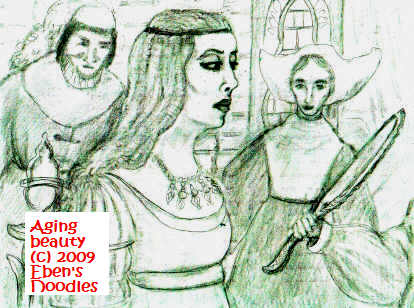
In the right light, this aging beauty did not see the fine lines around her eyes and mouth. No chicken neck as yet to cover up with a high, jewel-studded choker! The light coming into the tower windows happened to be kind that day. She had never looked better, she thought. And with that giving her confidence, she was all the more determined to win the knight's favor and sit as his chosen next to her mother in the Queen's royal box at the joustings, the royal garter and rose in her hand ready to cast to the victor, her wonderful looking knight and lover--Sir Damon Santiago Coxie!
After a training session, Damon led his mount into the stables, and this time he did not find the stableboys, who usually ran forward to take his lathered horse and bring him water and rub and brush him down. His trainer too seemed to have made off. Without no one to help him, Damon knew what to do, and he set about making his horse comfortable. Then he saw he had a visitor, quietly observing him from where he sat on some straw, smoking a long-stemmed gentleman's pipe.
Annoyed that there was someone observing him like that, Damon let the horse go for the moment, and turned to see what the man wanted.

"Who are you?" Damon asked, his whip in hand.
"Where are the stableboys? Did you send them away?"
The stranger did not even look up, he just kept puffing at his pipe. Then he finally spoke. "Yes, I sent them away. Privacy is required for what I have to say to you. It is growing high time we came to a little understanding. I have been appointed to tell you about the deal we are willing to make with you. It is most generous. Will you listen carefully? I won't repeat it."
Damon was even more annoyed at the arrogant manner and speech of this cavalier, and the mention of a "deal" with him and his kind really put him on edge.
"What business do I have with you? I have no such thing with anyone like you. Who are you anyway?"
The man looked at Damon in the eyes for the first time, then put down the pipe. "Lord Ratchet, Thirteenth Earl of Ratchetbury, at your service! Now I will get straightway to the point of this interview. It is simply this. There is no way we will allow you to win the prize of the king, this first time of yours on the field. This cannot be allowed. You are new here, and so you must begin at the bottom of the list. But you can expect, if you prove obedient to our wishes, to gain favor and eventually be awarded the prize. We do not ask your compliance, we demand it. It is either this, or face expulsion from the field, or worse. Well?"
Damon's face flushed. His hands clenched, and the whip whished back and forth in his hand, as if he could barely control his urge to use it right then and there. "Get out!" he said in a an even more menacing voice.
The gentleman shrugged and slowly rose, knocking out his pipe's still glowing ashes on the straw-strewn floor, despite the hazards of fire.
"Did I hear you right?" Lord Rachet asked. "Do you dare address me like that?"
"Get out!" Damon repeated, and he took a step toward the man.
The visitor's face now colored, and he seemed to feel a great possibility of being bodily assaulted and thrown headfirst out of the stables if he lingered a moment longer.
Darting Damon a look of pure venom, the visitor turned to leave at once.
Stepping posthaste toward the exit, he must not have noticed the height of the doorstep in the frame, for his boot spur caught on it, and he was flung headfirst, right into a pile or two of fresh horse droppings.
Damon looked out as the nobleman moved, his breath knocked out of him momentarily from the hard fall.
Rising slowly, noticing that his clothes were covered with stinking filth, Lord Rachet got back on his feet, tried to brush it off, standing unsteadily, his features lit with fury. "You--you will pay for this indignity! I will not live another day if I allow the likes of you to humiliate a nobleman of the Mount like this!" Damon stepped out of the stable door, his whip raised, and the man thought better of taking vengeance now and bolted to his horse, which was tethered a short distance away, and galloped off toward the Mount.
Events were now racheting up. Damon was learning all he could from his hired trainer in the time remaining. The thickening traffic on the road to the Mount showed that it was drawing close to the time when the royal court convened with a ball, and all the nobles and knights and ladies would present themselves before the king and queen of the Kingdom of the Mount of Defiance.
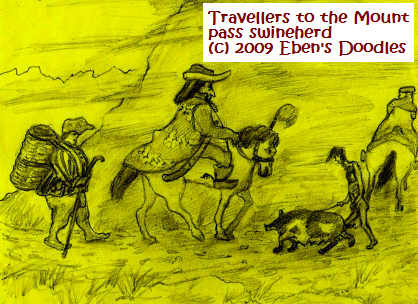
Somehow all sorts of carnival workers go wind of a coming trade fair, to be held in conjunction with the jousting tournament. These now began flocking to the Mount, and not being invited up, made do with Cheney Field, where they hoped the trade fair would be held as it had been in past years. Damon was thus joined by every kind of acrobat, performer of tricks and sleight of hand, stilt walkers, and whatever else a carnival can boast. It was an interesting spectacle, to say the least, enlivening his long training sessions and even his nights spent guarding his precious fighting horse, Bucephalus.
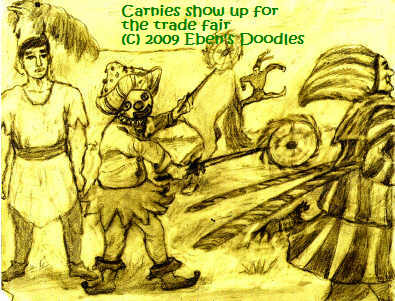
Performers and venders of all kinds continued to come out to the field and begin to set up for the trade fair. The trade fair, whether scheduled or not, was taking place, for villagers were already coming out to see what was going on, and they stayed, joining the increasing number of suckers that the trade fair was thee to milk and bilk of their last coppers.
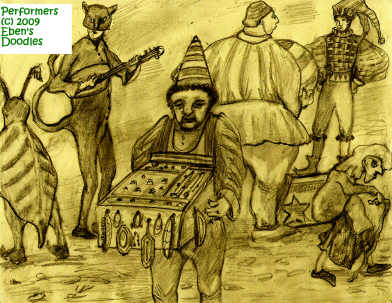
Damon entertained himself after training watching the various performers go through their acts. Damon watched while the Gypsy with the bear on a chain was putting it through its dance routine, while he beat a small drum. He had to keep a strict eye on his horse, however, for a moment's distraction could cost him everything, he knew.
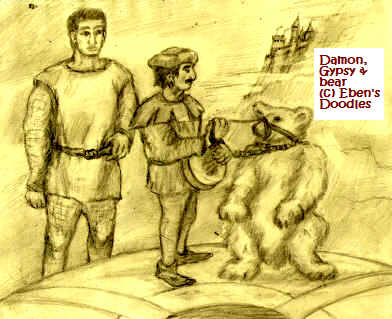
Returning to the stable, he missed a Gypsy dancer called Perfidia going through her act, with a couple admirers as her audience, with her husband, a concertina artiste, furnishing music.
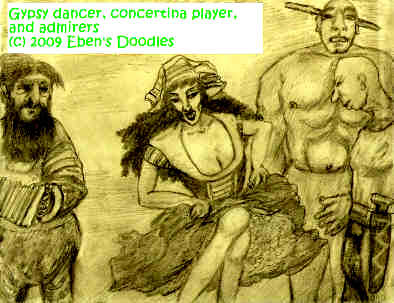
First, after the ball, if a jousting tournament was decreed by the king, all the knights of jousting caliber would reconvene at Cheney Field for the grand parade of knights and their equippage, attended by squires and pages. The entire court was also present in all their splendid finery, to lay bets and root for their favorites. In the upper stands, but in rough planked and dirty seats sections that no nobleman would think to enter, the king's commoner subjects sat. Only after that would the jousting contests begin at a sign from the king, at his command a dropped red silk banner from the topmost flagpole. The crowded stands, which had reserved galleries for the nobility and other sections for the commoners from the village and surrounding country, would erupt in cheers and the contests would commence, after lots were drawn for the order of contestants to ride forth and do battle, while last minute bets were laid with any of a hundred or so bookies. Huge fortunes often passed hands and men were dispoiled of their castles and everything they possessed if a favorite did not produce as desired. But that was the name of the game: the heavy risks involved. Each contesting knight rode three times at his opponent. Each had three chances to dismount his opponent. At the first try, a successful dismount would gain the full three points, which relieved him of having to ride again until the play-offs, when the top contenders all faced off for the grand prize. If all three tries failed, the two knights were disqualified from further participation in the jousting. No two could win it, of course, so the playoffs continued until only one champion remained in the running. A contestant was in some tournaments allowed a bodily injury, but not a dismounting. If he was dismounted, and had to take another horse, he lost considerable points and it was hardly worth his while to keep jousting. Rules changed from tournament to tournament. Sometimes an injury disqualified the knight completely from continuing--if it was a disreputable kind, such as a thrust of a lance through the intestines or privates or an arm or leg torn off. Othertimes, it did not disqualify him if he had himself tied and bound with rope to his horse in such a way he could still manage another joust. Other things that might disqualify was a flagrant lack of breeding shown--if the knight spit on another knight, or cursed a highborn lady calling him a coward or worse, or failed to display proper respect for the judges or arrived too drunken to keep to his horse with dignity, and other lapses of decorum, which occurred often, such as losing too much of his costume in the fray to cover him modestly. Fights that broke out between competing knight's squires and pages, those also disqualified him. With the king and queen present, vulgar melees of this sort were crushed immediately with the king's bodyguard riding with flailing whips into their midst. As for the rough mass of commoners, there was little to be done to maintain them in good behavior--and so drunkenness was tolerated, and as long as the disturbance did not reach the king's attention, also stabbings and robberies and assignations between lovers. But if they grew too riotous and threatened a revolt against the Crown, the king was not above a blood-letting, commanding his armed guard to charge the mob with swords and maces, to teach them a lesson.
The darker side of this whole enterprise had just been revealed to Damon, however. In the shadows behind the grand and glittering spectacle of lords and ladies in their finest robes and jousting costumes lurked a conspiracy, the ignoble cabal of a select few who decided beforehand just who was going to ride off with the grand prize. It disgusted Damon to think the whole affair was no more than a sham, and he wanted nothing to do with it. He returned to Minstrel Tithonus and revealed what he had learned, but the minstrel, a man of the world, shrugged.
"I suspected as much," he said to Damon. "But you, my lad, don't have to play their nasty little game. You can do your best, which I suspect will carry off the grand prize despite all their cowardly, sneaking back-room strategems to keep you from it!"
The minstrel offered a caution. "Beware of anything out of the ordinary, that might trip you up. If such men were scheming to take you in their net, now that you have rejected their offer, they have become your bitter enemies and will do everything within their power to set snares and traps for you to fall into."
That was a sobering thought for Damon. He himself was not afraid of anything they could do to him. But he thought of something, and the minstrel smiled as he divined Damon's thought. "Yes, your horse, they will try to slip it something in its water or feed that will render it unsuitable on the day you ride. You won't have time to train another mount to do what this one will do for you without flinching. They know that, and will target your horse--that will take care of you without a fight! From now on you must guard your mount yourself, or risk whatever they will attempt. You can't even trust a stableboy who might be trustworthy in the past. They will threaten him with harm to his family to make him do anything they want, and pay him royally too. Money will usually make a thief of most any poor working man who has his family to support." Hearing that, Damon felt much better, and decided not to withdraw, and keep a strict watch himself on his horse, day and night.
Ero was out with the pages and a trainer one day hunting pheasant and grouse, to teach Henri and Louis skills in archery, and he noticed a strange sight--hundreds, even thousands of little waving tails in the grass, and it was a horde of rats, he found. Above them a cloud writhed of uncountable beating black wings--bats! The rats and bats, he saw with amazement, were not stupid creatures, they sensed approaching doom and were fleeing the Mount as fast as they could.
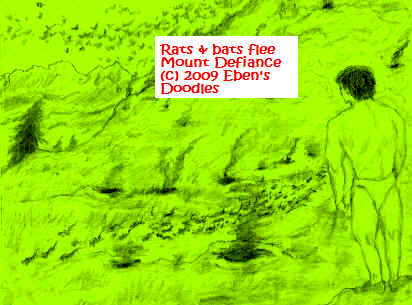
Had the fumerols opening and spewing black and smelly toxic fumes warned them along with tremblings in the earth? Were they first to recognize the peril of residing on the Mount? Surely, the Mount's inhabitants would take notice, he thought, and flee too. But the next day, there was no sign anyone saw or cared about what had driven all the rats and bats off the Mount. The villagers were not even concerned, though they lived at the base of the Mount, and should anything slide off or break away, they would be destroyed and swept away.
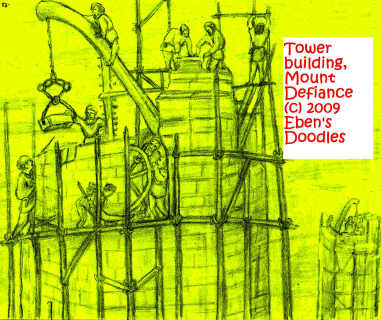
Another thing Ero noted. Instead of taking heed, the king himself was constantly heightening the towers on his walls and castle and fortresses and gates. His main castle was also being expanded, to accommodate important guests, who were coming in increasingly numbers.
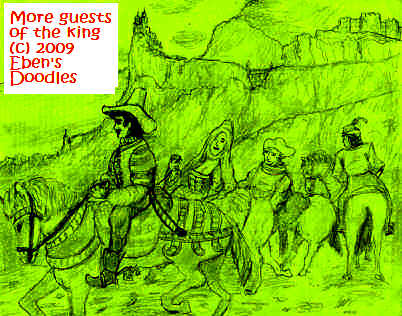
Now that Damon was the talk of the Mount, among both lords and ladies (and particularly the ladies!), naturally male jealousy was stirred up, and not a little rage too against an upstart daring to challenge the knights of the Mount (and, especially galling and offensive, turn down what they thought a very generous offer tendered by Lord Rachet to the stranger). What to do? The Knights of Dishonor met in a conference and decided they would fight him and utterly destroy him. He had given them no other option, and his horse, guarded night and day by Damon, was beyong reach and not going to be of any use to them apparently. They could always try to hamstring the horse, by sending in somebody to do it, but nobody would volunteer his neck if Damon caught him at it.
The conference concluded with a consensus, that if Knight Damon refused to work with them, then they would have to eliminate him entirely. So the Mount's knights began showing up on the Field for conspicuous practice, which was not only to show the weaker sex on the Mount that the men still ruled but to let this parvenu from out of nowhere know he wasn't going to carry off the prize without inflicting real pain on himself.
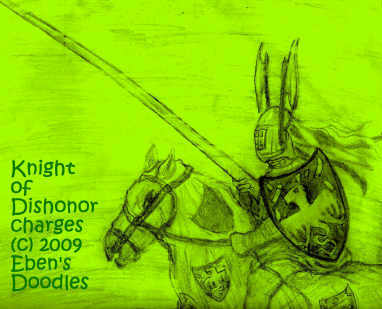
The minstrel's quarters at the inn were beginning to look like a knights' dressing room with all the garments and accoutrements hung about, and the number was increasing, as Ero was outfitted, first with a mail suit, then with a proper shield (even if unfinished as yet in its emblems) and the other necessary items to give him a brave showing before the king and queen and the royal court.
The fitter put finishing touches on the new tunic too, using the light where the mica windows were the largest in the house.

Since the minstrel awaited a royal courier who could come any day and any hour to summon him and his retainers to the castle, furious work was going on by the minstrel's small army of seamstresses and craftsmen.
To see if the things fitted, Ero submitted to a grand rehearsal, in which he put on all the things so far gathered. After the mail suit, he was to wear the widow's tunic, which was now fitted perfectly to him. First on the list, the mail suit was no joy to him, however, being heavy chain covering every inch of his body, leaving only his face bare if he drew up the cap. But it was necessary to be in full uniform if he was to present himself as a knight, so he pulled on the mail suit, then stood in it to see if it was a close fit or not.
Whether he liked it or not, he decided to continue wearing it, as he had to become accustomed to it, as if it were his own skin if he were to function properly in his full armor.
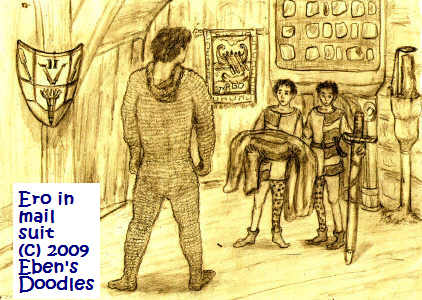
In the night, Ero had a dream. He saw a strange emblem, unknown to him, with a sword and a book, and across the book was written something.
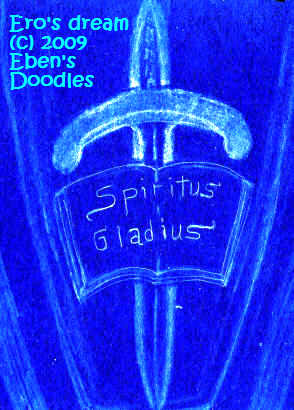
The next morning, Ero hurried to see Damon, taking along the shield. He had great news of a strange sort. Yeshua had appeared, or rather, had spoke to him, showing him a vision of a new emblem for his shield--a sword, and inscription, and a Book. Yeshua explained the Book was his own Word, which was eternal and imperishable and always victorious. As for the writing, the words "Spiritus Gladius" came from the emblem and shield of St. Paul and meant, "The Sword of the Spirit," so together the emblem meant, "The Sword of the Spirit is the Word of God." But what was most astonishing, Ero told Damon, was that when he arose with the dream still fresh in his mind, he went to get the shield and found it already embossed with the beautiful emblem, in two places!
He had immediately asked Tithonus, who was later in rising, but still very much awake, who had come and done it. But the minstrel stoutly declared no one, there had been no one in his rooms that night, as he had an ear for the slightest shrew creeping about for crumbs under the table and chairs, and so he would have known if there had been an intruder in the night. Besides, he added, a smithy was needed, a skilled craftsman too, to do such work!
As they spoke, suddenly words came to Ero and Damon simultaneously.
So this was Lord Yeshua's chosen Standard for them! Now both Damon and Ero were very relieved, as they gazed at the shield, for it meant that Yeshua was still Commander-in-chief, and had set his own emblem on Ero's war shield. Would there be another?"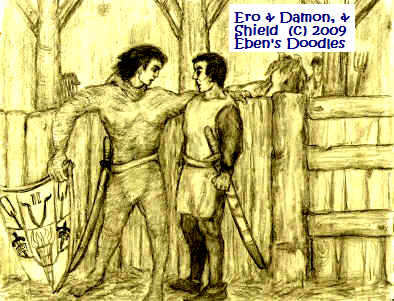
Ero noticed that Damon, despite the interest he showed in the shield and
his story, was not quite himself. "Anything wrong here?" he said, peering intently into Damon's eyes. "You don't seem your old self. Is it the long training wearisome?"
"It's not this place or the training, brother, it's me."
"Let's go talk, where we can be more private," said Ero, and he told the pages to
wait for them, and they were glad to stay in the stable and went to help the stable boy feed and water the horses.
Damon and Ero walked out into the pastures beyond the jousting field, where the grass
was tall and waving in the cool morning breeze.

Ero noticed that Damon, despite the interest he showed in the shield and his story, was not quite himself. "Anything wrong here?" he said, peering intently into Damon's eyes. "You don't seem your old self. Is it the long training wearisome?"
"It's not this place or the training, brother, it's me."
"Let's go talk, where we can be more private," said Ero, and he told the pages to wait for them, and they were glad to stay in the stable and went to help the stable boy feed and water the horses.
Damon and Ero walked out into the pastures beyond the jousting field, where the grass was tall and waving in the cool morning breeze.
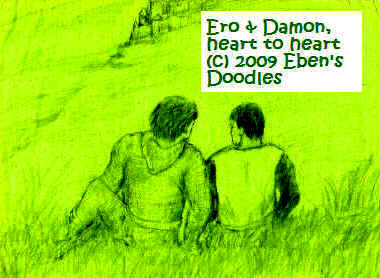
They sat for a few moments gazing up at the Mount, hearing roll calls of knights and retainers in the various courtyards of the castle and forts, but strangely no barking of dogs, as they had all run off by this time, and then Damon started talking.
"It isn't the training, nor this having to bide my time in a stable watching the horses," he repeated. "Rather, I am missing my own world, my own country. This place is strange to me beyond saying, even with you, my brother, close by. I understand that Lord Yeshua has me here, and you too, for his grand purpose, but what is it exactly? Am I just to joust with strangers and seek to throw them to the ground and win a prize for which I care nothing? That seems so pointless to me? I lost my whole world, for this? for some a man's spilt blood and a sack of gold florins and ducats?"
Ero didn't know how to respond for a while. He struggled to deal with his own feelings too, as they were much the same as Damon's. He too had lost his beloved country, Hellas, and his home island of Seriphos, where was it? Could he ever find his way back to it? Would Lord Yeshua give him leave to return home? Or would he wander forever on various quests, as he had been doing for some time now?
"I have lost my country too, brother," he replied. "My family, not to mention, my friends--I have no idea how they are faring, or if they are even living. But Lord Yeshua--he has taken me up as his knight in liege to him, and I am in his service for life, and I desire to be too. I cannot forget his face! Nor his words, which still burn in my heart! He is like no one else I ever met. For him I think I would endure anything--"
As they talked further, they came to no answer, but it was a great relief to see how similarly they felt and thought, and discover at the same time they were knights knit in heart, as well as in destiny--for both felt that there was a greater destiny yet to be revealed, beyond the coming appearance at court and the jousting match. What was it? Would they greet it with joy or dread and dismay? They had heard talk of dragons, being in earshot of conversations of patrons of Follie Inn, where there was much talk of strange beasts attacking villages such as Strangways. Dragons were seen flying in the vicinity of the Mount, it was said, spewing out fire and smoke that consumed whole houses at a time. But what of the most important thing: warning the people of the coming conflagration? That was Lord Yeshua's solemn command to them, as Knights of the Order of the Axes of Honor. Surely, that would be more fearsome than any winged, fiery beast?
They were thinking the same thought, for they turned to each other, and read the thought in each other's eyes.
"We haven't fulfilled our mission," Ero said, "until we warn every soul who will hear us. So far, we haven't had our opportunity, but soon we may. We must wait for the right opening, which I believe will have to be an incident that scares the living daylights out of them! We must not quit now. Yeshua said this is our mission, did he not?"
Damon nodded. "Perhaps, when we present ourselves with Master Tithonus at the court before the king and queen, that will be our opportunity! Surely, they will hear it then. These simple villagers seem to care for nothing but carnival, food and cheap wine--when they aren't fighting and robbing one another! If there isn't mischief that hasn't ever been done, they will be sure to think of it first! Mind this, brother! What with all the gambling they are doing at the trade fair, they are desperate for money and valuables they can wager. I've seen some of them lose every stitch they have on, and get kicked out of the gaming house to spend the night lying in the cold grass, which is all they have to cover them! I've given away all the rags we keep to wipe down the horses, so they can get back to their homes with some shred of decency, but the next day they are back, gambling again, this time with their wives and their children's clothes torn off their backs! Keep your post, brother, at the Minstrel's door, or they will pick the place clean, and leave him shirtless in his own bed!"
Ero rose, laughing. "Isn't that so? Will they ever change their foolish, strange ways? I have to wonder! Yet they must be given the warning too, before it is too late, even if it falls on deaf ears. There might be a few at least who will take heed and flee from this wretched dungheap of Strangways!"
Ero's shield still held two empty panels, and as if in anticipation they were seen to glow incandescently at night. And Ero was right! Yeshua had some things in mind for them after all! The sign of Noah, the captain of the Ark of old, came to mind in the dreams of the night. The shield already bore two oars, or paddles, which stood for the Ark as well as the ARGO. But now two references to Noah, which could speak of only one thing: the dread imminence of the world-destroying Flood. Only with this difference, it would not be a Deluge of water, it would be a destruction by fire.
Obedient to the will of Yeshua, Ero rose in the morning and spoke of his dream to Tithonus, who nodded in agreement with it, saying that he felt such a thing was truly imminent, and an extra warning on his shield would be well to place there. Calling in an artisan good with paints, the artisan no sooner appeared at the door with his brush and little paint pots in his wooden carrying case, when the emblems appeared on their own, without the artistry of a human hand! Tithonus was spared the expense of the man's labor, but he paid him anyway, he was so pleased with the work he had not done!
They all--Tithonus, Ero, the pages, and the artisan, stared at the shield, for on it appeared the Ark triumphant upon the Flood that destroyed the wicked world of Noah's time, while above glowed a bow of shining colors. Yet that was on one panel, the other held something different. It was unmistakable, a shofar of warning and proclamation--warning that the sin-ruined old world was going to pass away in fire, and proclaiming at the same time the beginning of an unspoiled, righteous, happy new world, the Millennial Kingdom of Yeshua!
Later that same day, while out training the pages in running and Damon was making sorties on Bucephalous with his single-toothed dragon-biter, a storm sweeps up, engulfing the Mount with dark clouds and flashing lightning. The earth trembles, with the force of the tempest. And then Ero, shielding the pages with his arm, looks back over his shoulder and sees something fearsome and huge, a black, manlike shape in the roiling clouds, wielding a huge sword.
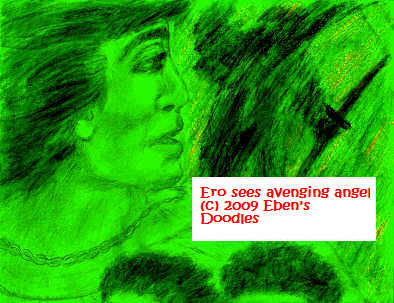
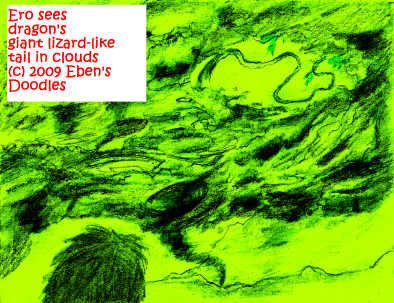
The storm passes, and they return to Strangways to find the village in an uproar, not over the big wind that shook the whole area but the latest sighting of the vulture lizard they called the dragon.
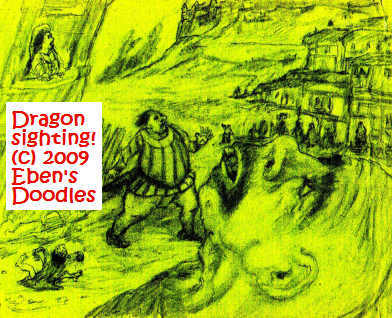
Apparently, someone had gotten a much better look from higher up on the Mount and relayed the information down to the village, and news traveled quickly, indeed, shouted from tower to wall, and fort to gate, then to the village huddling in the shadows below. The report was that the dragon was observed headed this time straight for the village to rip it apart with that great, snapping beak and huge talons when the storm cloud overtook it and it disappeared in the black, tumbling clouds. Then when the clouds blew away a short time later, the wind blew the sky completely clear again, and no dragonbird was to be seen! The sea tempest and the churning funnel cloud had delivered them! Or so they thought! Just the same, most people of the village were craning their necks, trying to see if the dragonbird had really flown away, or maybe was coming back to attack them once the storm had blown itself back out to sea.
Everyone was vastly relieved, but Ero could still tell from their ashen faces and braggadocio they had received a very bad fright and wanted to deny or cover it up as quick as they could. All the patrons of the Follie Inn were in the street too, tipsy and stumbling about, but some were bragging they were bitterly disappointed in the dragon's sudden retreat, as they would have taught it a thing or two if it had dared to fight them face to face! These boasting oafs were greeted with jeers, and then some fighting broke out by the offended champions. Was this the opening they so desired--would these people be willing to hear the warning Yeshua had given? He had to take a chance and not let the moment pass, so he spoke out, addressing them all. Heads jerked his way, and for a few moments there was silence as his words rang out over the entire group, with many others listening in from unshuttered windows and doorways.
He told them a great fire was going to break out in their midst, and consume not only the village but the entire mount! It was time for them to flee, and take only what they could comfortably carry, as they need to flee in haste and not be overly burdened down! When would this great fiery judgment fall? He knew only it would be very soon, and every passing day brought it closer. Best not risk being caught in the flames! Leave this place now, before it is too late. Flee the Mount of destruction--for it had defied God, and now its defiance would bring its due reward. If they care for their children, their wives, their friends and the old ones, take them away now to safety! he urged the men. "What say you, people of Strangways"?
Response? There passed a few more moments of silence as the people looked round at each other, then with one voice and mind laughter and jeers erupted from the whole village. The children were even guffawing and making fun of Ero and the pages. One buffoon who fancied himself the village wit grabbed his woman and together they spun around in a mockery of a ballroom dance, parroting Ero's "What say you?" as the crowd clapped and roared back with "What say I?"
The scare the dragon had given them all was completely forgotten. They had already paid no attention to the cracks in the Mount and fire and smoke issuing from them day and night--portentous signs of great fiery wratch boiling up from beneath the mount, were they not?
Shaking his head, Ero gave up trying any more words on them, and he and the pages went to to see how the Minstrel was doing and attend to any needs he had.
He had gotten together from somewhere several benches and low tables, had them set up with slate writing boards, and they looked like a kind of school was about to commence in his quarters. They soon were apprised of that very fact, indeed.
"Henri and Louis, you are going to learn your letters, starting today!" Tithonus announced. "And Ero my lad, you are their tutor. I can't have my pages ignorant as uncouth stableboys who can't even scribe their own name! Besides letters, they will learn music, art, good manners and gentlemen's deportment, along with the usual archery, swordsmanship, hunting, riding, and such, as they progress--if they work hard and progress--into squirehood. Well! Might as well get started, time is a'wasting!"
The pages were busy learning their letters, and had just completed the alphabet when a royal herald banged his staff on the door of the Follie Inn, demanding Tithonus present himself. Tithonus was not about to answer such an arrogant summons, as he had known greater kings than the one presently reigning on the Mount, and so he sent word, declining an appearance due to his delicate health. Furious, the herald could do nothing but stamp about, hurling threats at the gray, old head of Tithonus, who was quietly observing the rumpus below his window. Throwing down the royal letter of summons, the herald leaped on his horse and sped off back to the Mount, not willing to risk the fleas and lice of the inn.
Later, reading the summons, Tithonus sighed. He turned to face his knights and pages. "Well, our time of play is over, it is now to work, I see! We must present ourselves, fully equipped and garbed, ready for service, either at the ball or at some other event of the king's choosing, on the morrow. I had meant to teach Knight Ero some of my songs. I am sorry to say, we must go as we are, without that! I had hope for a little more time here. But the king would never allow a choice, he doesn't bear with choices by his subjects--all must do what he commands, you see, or lose his head! So--be prepared. We depart early, as soon as we have a good breakfast, that is! It is hard to say if we will have a good meal after that--you never can tell with this king, whether he will treat you royally or meanly. It all depends on whether we please him, and that is impossible if he is not first in a mood to be pleased."
He paused, then eyed them sharply. "Ah, I see the real reason for this impertinence. The herald looked a bit rattled and affrighted to me! What has put him off his heels? It has to be the dragon! The king was at his wits' end, and still is, regarding it. All his crossbows and fighting men, yet he knows the dragon is not his match! Perhaps he wants everybody on board, so that he can be emboldened to go against the beastly fowl and expect to win, or at the least teach it a lesson and drive it off. Yes, it has to be the dragon! That is what engages the mind of the king--it cannot be a mere ball or jousting. Formerly, he was so pleasure-loving, but now he has changed. He has no doubt quite forgotten such trivialities, now that his very castle mount is in danger of being laid desolate by this flying monster! As for the village, it is a wretched place and it can burn, far as he is concerned, but his castle? No, he must risk us all to save it! What a brute this king is! He cares nothing but for his own skin! Thus, the royal summons!
The next morning the inn was up early, for the whole village was stirring, having heard of big things happening on the Mount. The breakfast was brought up to the Minstrel as before, though the toast was burnt, the eggs were not cooked properly with the sauce the Minstrel preferred, the milk and flour porridge was missing its honey and butter and some of the sausages had to be sent back for more grilling. As for the kidney pie and tripe--he dared not touch them, not willing to risk his stomach any further.
They hurried to get their equipment and proper dress, and went down to the street, finding people milling about in the inn's parlours, all talking at once, and found the same thing outdoors. Many carnival people were in the crowd, too. The trade fair--had it been called off?
But no, the Tithonus was told, when he asked a carter for his charges to carry his trunk and other things to the Mount's main castle. "That dragon's done dampered it," the carter cried. "How can they do a merry job of it when any moment that thang can drop on 'em and carry someone off! They be lookin' all the time up to see if he's comin,' and how can they do their business then, prithee, tell me that, sire?"
At the gatehouse before they entered the Assassins' Walk, Tithonus stopped his knights and pages, for words of counsel.
"Our lives were cast in the king's deceitful scales the moment we enter here. It is hard to say how we will fare with him. It cannot be good entirely. I knew his father, but I hear he is locked up, blinded with burning hot tongs, languishing like some chained animal in some dungeon or tower cell, his throne taken by the son who did not care to wait until his scion's death. I doubt there will be much singing of heroes and battles of yore, as the whole Mount is consumed with this matter of the dragonbird's appearance. But if he does call me to sing away his cares, I will do my best. I doubt it will please a man who tortures his old father in order to sit on his throne, as my voice has grown so thin these days, and my grey hairs and reedy legs turn away the women's admiration to younger men. You, Knight Ero, may then sing your own people's fine heroic tales of Jason and the Golden Fleece, or others as you choose them, and see if they will please them better. But as I say, I think the king is anxious to inspect our arms and prowess with the sword and spear for use against the dragon, rather than be entertained by our courtly verses and charming voices.
Let us continue, but beware the next steps down the long walk that leads to the stepped road to the Castle! Many have started out there and not reached the Castle, waylaid by armed men positioned in the shadows. Whether the king sends them, or they are rivals to us, who will know? There is one guard, at the start of it, but he is only there to give word of any bodies to be pulled out by horse and rope. Well? Do you still wish to continue with me? If not, I will go alone. My life is not worthy of longer life. I might as well die doing what I was destined to do."
Tithonus turned to them for their responses, but they answered by not moving.
Ero, however, drew Tithonus aside privately. "We will attend you to the end, sir! Is there anything we might do to find this poor, old father of the king and set him free? Surely, we can, if we only know where they have hidden him."
"A brave heart you have! But that is not publicly known," Tithonus whispered. "Anyone who tells the place will be drawn and quartered. And there are hundreds of caves and tunnels under this Mount, many of them locked and guarded, so it is impossible to reach him by stealth or cunning or force, even if we can find out where they keep him. I might find out something, if I ask the subordinates, such as the scullions in the kitchens, who hate their superiors and might risk telling us for a sum of money. They are probably sent with whatever food the king wishes his father to have, so they might well know his location. What you ask is impossible to carry out, however, unless--"
Thinking of something, he paused, then turned back to Ero, "--unless you dress as a scullion and go with them when the guards come for the old king's rations. Would you dare to do that? It might be the only way to reach the old king. But you would have to fight your way out from there. Are you equal to that? And then afterwards--what will we do once the king finds out? Wouldn't he send his entire force after us?"
Ero went to say something to Damon, who listened, then nodded. Together, faced him. "We are both agreed. I will go with the food to the king if it can be arranged for me to carry it. And Damon will follow at a distance, or proceed as far as he can. I will unwind a ball of thread, so that I will be able to find my way out once I take care of my guards in the passageway. I will bring the old king with me. Damon will be guarding our rear, and together we will return with him to the kitchens, then together we will lead you out as if nothing has happened, the old king disguised as a sick scullion who needs care in the village immediately. Surely, the king will not know of it, and we will be allowed to pass."
The old minstrel could not disagree with the plan, but he still had misgivings. "This is most bold, to attempt to take the old king out of his cell. How will you break him out of his chains? The lock for the chain must have only one key, and that was probably thrown away by his son!"
"We don't know how that can be done, but we must try anyway. I will take my strong sword, and Damon has his, and I will cut the chain if I must."
So with this agreed upon, they continued on after Tithonus, who led as they passed into the gate under the deadly spear-ends of the portcullis that had been drawn up, while bowmen eyed them through slits in the stonework above them on both sides. After submitting the writ of royal summons, a beadle or bailiff of the Mount examined the writ and the royal seal, then motioned for Tithonus and his party to proceed. The guards swung the grated gate open, and they entered the Assassins' walk. At that point, they were on their own.
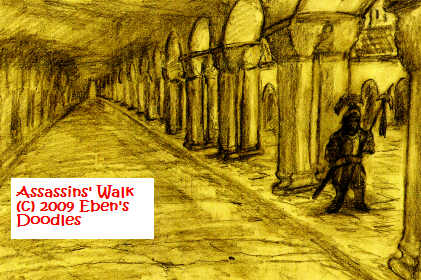
No one attacked them on the way, perhaps because they were vigilant and ready to rebuff any assailants, and they reached the far end of the colonnade and stepped out into the courtyard. There they found out they had been fully expected. They were immediately confronted by men running to close their exit and surround them.
The royal bailiff stood forth and charged them with treason.
"I arrest you foul plotters and assassins in the king's name. Every word of your treacherous plot was overheard, while you stood on that grate before entering the gate!" he shouted at them. "For this crime you will all be hung, or drawn and quartered, when the kings hears about it! He has commanded we take you to him, and he will hear of this plot and then decide your fate. Now march!"
King or no king, the Knights of Honor were not going peaceably to their deaths, however, if they could help it. With drawn swords they meant to fight to the death if necessary. But the minstrel commanded them to stop. "It is no use! No use fighting the whole force of the Mount. Let me speak to the King! I will tell him that you are but foolish youth, and did not know what you were doing, having no knowledge of the old king and his madness. Surely, he will not punish us all, and will let you go free if I insist on taking responsibility. Let him kill me in your stead. If that doesn't divert him, perhaps money will speak more kindly in our behalf. I can pay him something handsome to provoke his royal mercy!"
They could only guess what the king had heard about the incident as things did not go as they expected. They were not hustled and thrown into a dungeon, to await the royal summons and then be sentenced to their respective fates. Instead, the troops took them directly to a tower in the ramparts, which looked on most of the castle.
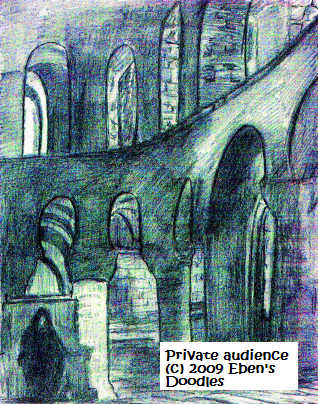
Shown in to the tower chamber by the king's bodyguard, they were left standing in the shadows, until finally they saw dimly lit figure was seated in the thronelike chair in the room. "Come forward so I can see you better!" a voice commanded.
They moved closer, until the man in the chair spoke again. "Stop! That is close enough. I have something to put to you all. You can fight for me, if you are wise, or fight me, which will be your certain death. Which do you choose? Say now! I do not suffer delay or many words!"
"But why should we fight for you, Majestic One, when you have plenteous knights in your charge?" Tithonus responded, for he knew the man had to be the king, by the sound of his voice. "What do you propose will be our wages?"
"Ha! I knew you had a price in mind! Well, you will have most generous livings granted you, for your lifetime that is, not your descendants, such as a castle apiece, with servants, and a handsome stipend of gold to keep your wants amply supplied? Any pretty women you like, wenches or ladies--well, they are free for your asking. What say you to that? My daughter's hand, well, she is for the victor too!"
Tithonus did not have to think about it. The king's daughter was cream that had aged beyond its prime and turned rancid. Who would want her now? As for the castles, how long would they be permitted to enjoy them? Surely, not long, with so many envious knights on the same mount, knights they had shamed in winning the king's contest over them. As for the wenches and ladies, he knew his knights. They would take women as chattel, as the king and his knights did. But he knew that to decline the king's offer was to invite soon and swift assassination.
"We would request one thing first, Your Majesty."
"What be that?" the king barked. "I've offered you far more than you deserve for your services, in this, ah, emergency."
"What would be the specific object of our service?"
The king rose and walked over to an arched window. "Oh, don't you know? I can hardly believe that! But come here! Take a look then."
The king stood aside as Tithonus and his knights looked out the window. There they saw on a number of the defensive towers recently outfitted with trebuchets against the dragonbird.
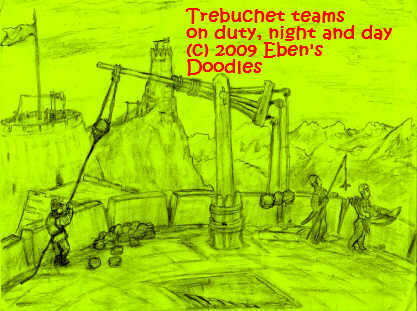
It was clear to them what the king's anxiety was centered on. He did not care about joustings and the usual pleasures--one thing was uppermost in his mind. He feared the dragonbird's return, imminently. That awful event must have robbed him of his sleep and spoiled all his usual pleasures, in fact. But could the dragonbird-haunted king be influenced to gain some advantage for the poor wretched father of the king? Tithonus, recalling Damon's urgent proposal back at the castle gate, thought so, and begged leave of the king for a few moments to consider the king's offer privately with his knights.
"All right then! But be quick about it! I will return here in a few minutes, and you had best have your reply ready!"
The king swept out of the room, and they were left alone, or so it seemed.
Tithonus drew his knights close. "If you still entertain ideas of setting the old king free, here is my plan. I will suggest to him that we are not all the knights he has to challenge the monster. Let the king's justice be prevailed upon, and the other knights be entered fairly as equal contestants, and may the best man win! That man would win the king's rewards, including his daughter's hand, and none other. Surely, the king will do this, as we will refuse any other course of action, risking our lives to do so."
The king returned as soon as he said, and then the lights were lit, as attendants stepped up with flaming torches to every sconced taper in the tower chamber. Now they could see the king in all his finery.
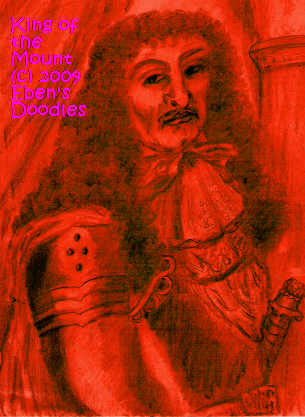
The king sat down and the knights and Tithonus went forward at his command to give their reply.
Bowing Tithonus began. "Thy justice, O great one, demands that fairness be exacted among all thy subjects, does it not? Whoever sits on a throne and is truly great must show no partiality, particularly among noble knights who are all gentlemen of great honor and courage. Thus it is that I humbly propose this, Your Majesty--"
The moment Tithonus was through speaking, the king erupted, stamping his foot and furious.
"I'll have your heads for that! And there is more to your treachery! I know all about plot, and--"
Then a chief counsellor hurried to the king's ear and whispered something.
A sly look crept over the king's features, and he spoke again, only more guardedly.
"I have been too hasty perhaps. Surely, there is some sense in what you propose, Most Honorable Tithonus! I must have your knights in my defense of the castle, but on your terms I can still have them. Only let the other knights already under my banner now compete with yours. Let all things be done fairly, with no, er, partiality! Let the best man win the royal largess! But how do you propose to gain the dragonbird's compliance with your plan? Surely, you have not parleyed with the flying beast?"
The bodyguards were even snickering at this point, as the king's humor and scorn was obvious. Shown to be fools? Tithonus did not even blink an eye. He bowed stiffly, and with cool voice informed the king that should the dragonbird return, all they had to do was lure it away from the castle to the jousting fields with carved up mutton or cattle, and then challenge it there.
The king has not thought of this obviously, for when the counsellor returned to his side, he was waved away with a few choice oaths. "Of course, I thought of that before you did, minstrel! Let the carrion be set out on the fields, a large quantity of it to draw the monster thence! And let summons to all my knighthood be published immediately by the herald, and all convene on the jousting fields when the dragonbird has flown to devour the meat!"
A trumpet was blown as the king rose and departed, adjourning the private conference and leaving Tithonus, his knights and pages to show themselves out apparently.
Damon turned to Tithonus, catching his sleeve. "But sire, you did not even mention the shackled prisoner, the old king! What of him? How shall he be set free?"
The minstrel smiled. "Yes, I did think upon him in this venture. When you are victorious, as God grant you victory, you shall stand before the assembled queen and all the nobility and the commoners as the victor, and say this: "One thing only I will have from the King's hand as my reward. Not his daugher, and not his gold. And keep the fine castle for another, but give me only the shackles of the king's sire!" Trust my understanding of these people. That word will cause such an uproar, even the beginning of a riot, that he will be unable to refuse you, which would be unthinkable before such a crowd, most of whom hate and fear him in equal quantities and need only a spark to ignite in a fury against him. He will grant your request with a splendid show of magnanimity, and we will have to be very careful of our backs as we go to see that the shackles are indeed removed and the old man is set free. Then we must take him away from this place altogether, lest we all die from all the assassins that inhabit this mount. Will you do this feat? We are depending on you to be a man of courage, if you really are determined to set the old king free."
Damon and Ero moved away a few steps, conferred, then they returned to Tithonus and the pages. "Yea to all you propose." Damon said simply. "With Yeshua my Lord, and Ero my brother, I will attempt it, for I cannot bear to think of this old man being left at the king's mercy."
Coming episodes:

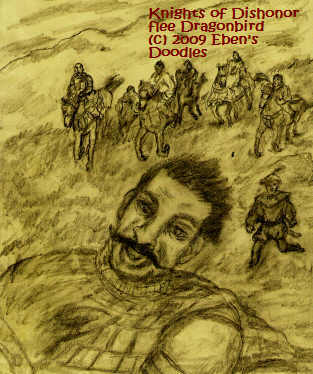
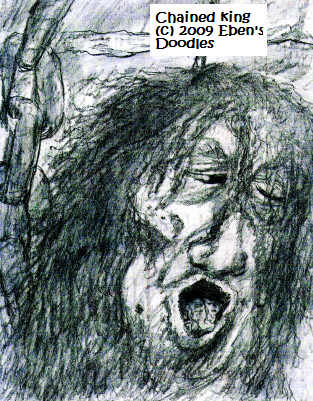
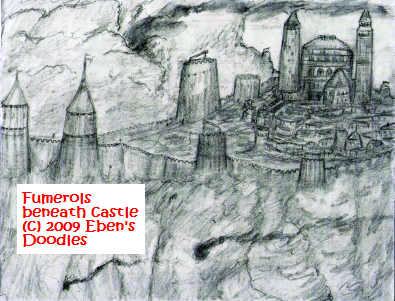
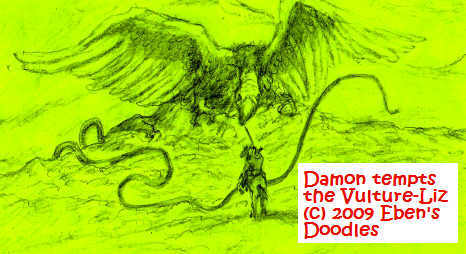
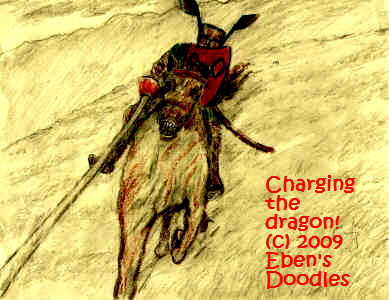

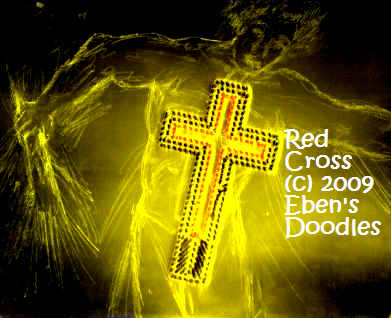
Ero and Damon, the inseparably linked brother knights of the Axes of Honor, are in big trouble. Without faithful Wally (via the re-programmed Kater's Compass) serving as their wargame's ombudsman, they will be facing seemingly insurmountable opposition and brutal, merciless retaliation if they do not, as newcomers, agree to take a fall when the jousting match is held some time after the court festivities that open the gala season. An inexplicable thing is going to happen. At some point in the coming fray, Yeshua will create a blood-red cross, emblazoning it on Ero's chest and torso. The mail suit is no longer needed, the Red Cross alone will be his protection. This is the emblem of ultimate sacrifice and signifies true, unstained Holiness, something to which every noble knight of the way of truth should aspire. Holiness, then, will do battle with Dishonor, and Truth with Falsehood. He will attend Damon initially as a squire, but this promotion by Yeshua will empower him to more than ever to even the odds against them.

Eight year old Honorius Urbanus and his distinguished father made a special trip all the way from Glevum in southwestern Britannica to Roma, the ruling capital of the world. It did not start so auspiciously, however, after they crossed the water and traveled through barbarian- ravaged Gaul. Even northern Italia was just as broken up.
Rufus Urbanus was upset, for the sake of his Honorius. Was this to be the memory of it bequeathed by a father to his son? If so, it was a bad journey! Rufus thought, feeling he should have gone alone and faced such things rather than expose his young son to them. Yet further on they found the real borders of the shrunken Western Empire still held firm, for the time being anyway. Beyond was Roman civilization as it had always been--glorious and proud and well-ordered--and they proceeded south on the Roman road directly to the Queen City itself. There young Honorius would see the sights that would forever blaze in his memory: Roma in her full glory and splendor, a city beyond description, the like of which the world had never seen before and would never see again after the barbarians broke through the borders and had their way with her.
Chronicle of the Phoenix of Britannica, Out from the Ashes, Vol. IV, Retrostar

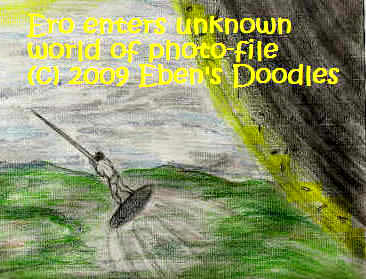
About the time Ero II and Damon are embarking on their duties of service as Knights of the Axes of Honor, commissioned by Lord Yeshua to do battle with the Axes of Dishonor that ruled the City of Destiny's Castle Mount and all its forts, Ero I is soon to be involved with an entirely different set of challenges in his respective part of the Cyberworld of Kastorr created by Wally the e-butterfly for his retirement.
Continuing his journey within the malevolent, evil eye of the Carbuncle's spirit-form, the great Vampire, Ero has no idea what he was going to encounter next, of course. There is no explanation from pop-ups. Yet he isn't particularly worried. This photo-file seems to have landed him a a nicely verdant country, quite unlike most stretches of the more arrid, coral and calciferous White Continent of Atlantis, he finds. It is most pleasant to the eye. He likes the look of its gentle, rolling hills and winding rivers and streams with their thick forests of oak, framed by a line of low cloudy mountains on the horizon. What kind of country was it? Would he find it inhabited? What era was it? Where they civilized? Or barbaric and backward in culture? He knew he would soon find out. He wondered how Damon was faring, but that was somebody else's concern now--somebody who looked surprisingly like himself, he recalled from the brief look he had of him before he was whisked away to other worlds. He had helped Damon all he could (even going beyond the perimeters that Wally had set), but whether that would bring Damon to his destiny, that was something he could not know. Just the same, he hoped it would be a good journey for the young gentleman with the camera--that the best was yet to be.
As his programmed Kater's Compass directed him, the mast-bot carried him across this green and pleasant land until he came to a little town, and there it stopped. Various people came and went into the town, which looked Roman to Ero's eyes. Was this in Roman times? Apparently! But who was he to accompany this time?
Finally, the mast-bot began to move again without his direction, following to figures in the morning travelling on horseback. They looked to be a man and boy, and then the popup informed him he was correct, he was observing Honorius (the boy) and his father as they were beginning their trip to Roma. Honorius's father had business dealings to take care of primarily, but he took his son along this time, who was now of sufficient age and understanding to learn a great deal from the sights, both along the way and in the Roma. It would be a good education for him, better than any book the boy had, the father thought.
It was a long trip, indeed, once they left Roman-civilized Britannica and sailed across to Roman Gaul. But the same Roman roads that crisscrossed Britannica led straight across the immensity of Gaul to Italia and Roma, and there were numerous inns along the way, strung out between cities, where they could stop at night and take a meal and bath and then rise refreshed the next morning for the day's journey. He even had a fine intinerarium of the Western Roman Empire (purchased at a bookship at the exit of Vicus Tuscus on the Forum behind the Temple of Castor), he could consult any time along the way, with the storehouses, cisterns, inns, halting stations, cities, pretoriums, and some of the major sights marked with easy to read notes and symbols.
The main obstacle would be the great mountains of the Alps, which even Roman engineers had not been able to conquer completely, but once they made it through by the high, narrow passes into northern Italia, it would be a nice, quick run down the straight roads directly to Roma.
When he first heard of his father's plan from his mother, Honorius was excited almost beyond words. Pater (for he always called him that) was going to take him to Rome on a business trip? This was beyond his dreams, for his father only took business associates or the estate steward. This time, just the two of them would go, as his mother explained. It would be a speedier trip, with fewer along. And his father wished to have more time alone with his growing son, to teach him some things along the way that he might need in his coming manhood.
Honorous listened carefully, taking in her words, though he did not exactly know what she meant by his father teaching him adult things. What could they be?
Britannica was still very much a settled, peopled province, even though it was on the outermost rim of the Empire. The great highway to Roma began at Gesoriacum after they crossed the salt waters of the straits. This was the channel port where they could go many different directions, all on fine roads. But Roma? To get there the most direct way, they headed to Lutetia, which was built on an island in a big river, and thence to Lugdunum in the southern part of Gaul, passing to Vienne in the foothills of the Alps. From there they crossed the mountains through the col to Brigantio.
But throughout Gaul, north to south, they saw disturbing things. Once a splendid province that Julius Caesar himself had conquered from the Gauls and filled with Rome's civilization, raids from barbarians had driven away much commerce and spoiled a number of cities and towns, leaving them desolate. The roads had once been full of traffic night and day, crowded with tradesmen and agents of mercantile business, and imperial mail couriers, not to mention the sight and sound of legions with their bugles blaring time for the march of countless feet and horses' hooves and war wagons. Now the roads stretched empty, with only occasional retreating garrison troops drawn from outposts that were being emptied in the face of advancing barbarian hordes. Goths! There seemed to be no end of Goths! They came by many names, but they were all barbarians, greedy for Roman lands. Refugees too were seen, in decreasing numbers, for most had already fled southwards, leaving vast areas, even entire orchards, farms, and vineyards open to brambles and weeds, with the return of the wolves and bears and robber bands. Barbarians had already left their mark, in burned temples and ruins of villages and towns and villas. What inns were left were few and poorly run, charging high prices for filthy, lice-infested beds and wretched food. Horses could not be had at any price. Honorius's pater was upset by what he saw, but he told his son things would improve when they crossed over the mountains and got to Italia proper. There things would be fine, with all things done according to law and order.
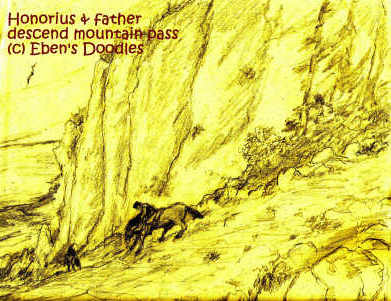
All through Gaul, from Gesoricum to Vienne, Honorius's face must have shown his flagging enjoyment in this journey. His father turned to him. "Son, don't let what we've seen so far discourage you. Things will be far better on the other side, you'll see." he assured him, though he wasn't really so sure.
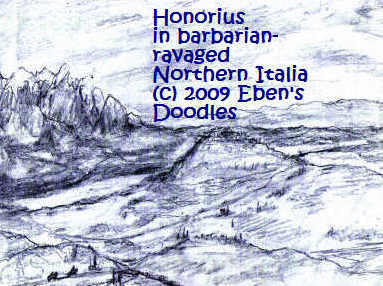
Yet on the other side, they found the same dismal ruins of burned, sacked cities, towns, villas, and countless forsaken, weed overgrown farmsteads and estates. Wild dogs, and donkeys too old to bear burdens, roamed the countryside, their owners having livestock they couldn't sell or slaughter for meat. Even herds of pigs gone wild ran about, fleeing into the thick bushes and trees as they approached.
Coming upon a ruined temple that his father recalled, they went up to view the ruins more closely, leaving the horses.
"The sight makes me sad, my son. It was once a temple of the pagans, with the foul idols of the Greeks in it and temple prostitutes. But that passed away, and a church cleansed the premises and met there, a church established by apostles on their way to our own Britannica, and I worshipped the Lord in it, when last I rode this way," Rufus told his son. "But there is no sign of the church now--nothing--all gone!"
A lone figure appeared on the road and stopped, watching them touring the ruins and then start back to the road.
Honorius's father drew his sword and approached first, but found the man, after a few words, was a veteran of a disbanded legion, his head balded by long years under an iron or brass helmet in the burning sun. He sheathed his sword.

"Have a good trip by the favor of the gods, sir, you and you little son!" the veteran greeted them.
"Thank you, Soldier, we are Christ-followers, and our God is with us. Are you travelling northward all the way to Gaul?" Honorius's father inquired. "Don't you know it is no better than this poor, wild country here? It is good you fare so well-armed! Better than I thought to be myself, that is certain! I had no idea things would turn so badly like this for the Empire!"
He gave a rueful look at his own lone sword.
"Who might you be, sir?" replied the veteran soldier. "I see you are of the curial nobility, from your fine garments and insignia. I can also tell by your accent there is some connection with my own homeland and native speech."
Honorius's father introduced himself and his son. "I am Rufus Quartus Urbanus, and this fine boy is my son Honorius. Our forefathers' country is Britannica, and our city is Glevum on the western coast. Do you know of it? It is a small but pleasant city. And you, my man? What is your name?"
"Decius Sylvannus Flamminus--that's what it was properly, though I don't go by it--for the Emperor Decius was very cruel to us legionnaires, without cause, decimating an entire legion in Achaea just to kill the Christians in it who refused to worship him as a god, so when my men saw I did not like it, they called me "Lancio" commonly, for I was always best at throwing the javelin rather than wielding a sword--as I never missed with it. I am from your own isles, and though I know little of your coast, I can tell by your speech you are from there too. Fair and pleasant Britannica of the many green isles! How fares she? I have been many years fighting with my arms and strength, serving in the legions of Italia and also those in the East that fought for this and that emperor favored by our legions. But that is over! All my strapping, brave lads I left Britannica with--they are all gone! We were tens of thousands, bursting with pride of country and zeal to win fame and fortune in the Emperor's service! Alas! They are not returning to their home isles, they were slain in heaps far from home, or perished of sickness, or went into service for some other general than the one we started with. The others have retired to a city in Syria Majorica. At least my own land is still held by my name, located in a village nearby the big river and Londinium's fort, wharves and shipping, however much it has been changed from the one I knew as a youth, will be better. Or is it altered to my loss, ravaged perhaps by barbarians?"
Honorius's father assured the old veteran it was not altogether changed, though the land was drained, bled white of its farmers that made good, strong fighting men, having lost them to the constant demands of the legions and the emperors.
"Now concerning this new emperor of the West, the youth Honorius, is he a fit ruler of the Romans? Or is he weak-willed, and the barbarians can get the best of him? I go to attend to business I have in Roma, as I deal with spices and pepper, and the emperor's chief baker was a chief client, and he no longer answers my letters I sent to him."
The veteran paused to spit to one side. He wiped his mouth with his tattered sleeve. "Your court baker may have no business to give you! Or he's left the city for Constantine's City. Our West Emperor, a feeble willed youth, has quit Roma, if that will do him any good. He doesn't dare reside there anymore, says it cannot be defended, even with the walls and forts round about it. No, there is little hope for Roma with him at the helm. You see this--that has happened since he ascended the throne, and he and his counsellors did nothing to prevent it, nor will they prevent worse in the future."
Honorius looked up at his father's face, and it seemed to turn gray in a moment.
"Quit Roma? The immortal city of the Caesars with no supreme ruler? Where has he gone then?"
"Ravenna, the fortress city in the swamps of the River Po which you can only reach by boat! You must sail up to Classis on the northeastern coast, then proceed west from there to it. I've seen it once as we set guards and delivered boats with masons and stonework from the port. He can have it! All he's got is his big palace and a lot of slaves to serve him, and what gold he could carry out with him. That's where he's run, with the whole court! Left the rest of the Romans and the whole of Italia wide open to the barbarians! What a country this is now, with no proper rule over it. No wonder it looks like this wretched area!"
After speaking a little more, Rufus thought of something, and it shone in his face. "Lancio, I have an offer for you, for I perceive you are a good, honest man in your heart and ways. I did not know the roads would be this bad, and the barbarians so numerous in the country, so I did not take my servants for guards. For my boy's sake, I would like you to attend us, to Roma and Ravenna and thence homeward. I will pay you well. Will you be willing to interrupt your journey to aid us in ours? Think about it, and give me your answer.
Rufus turned to his son and told him to bring the horses as soon as they had heard the vetern's reply.
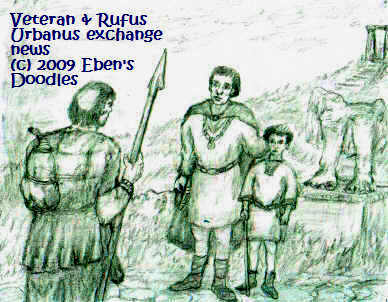
"It is a reasonable thing you ask," Lancio replied, after a few moments gazing at Rufus Quartus Urbanus and his son who were solemnly waiting. "I can see you are in need of company. It will lengthen my journey, true, but your gracious offer is taken! I see you could use someone who can wield the sword and javelin for you if there is any trouble. There are many bandits nowadays--impoverished citizens who have run to the hills to escape the taxes and the laws. They infest the hills like vermin and then pounce on anyone who looks like he can offer little fight. Pay me whatever you think fair at the end of the journey, that is all I desire. I have my own life savings with me under my belt, which will give me a start again on a farm of my own, and do not need my wages now."
The veteran bowed, lay his sword and javelin before Rufus, then rose and grasped hands with him, and the deal was struck. Honorius, amazed at what he saw, had to be nudged by his father, and then he hurried off to get their mounts.
Lancio took Rufus Urbanus aside privately. "Lord Rufus, I did not say all, for I did not wish the boy to hear this, but I have a further reason for accepting your offer of work. It might frighten him, and this is a trip he should enjoy, for it will remain long in his memory."
"Oh? What is your full reason, Lancio. I think I can bear to hear it."
"You must have heard along the way here, but the Goths passed through Gaul and Cisalpine Gaul a while ago and then ravaged the provinces and cities of Spain, burning, looting, raping the women, enslaving the ones they didn't kill, the length and breadth of it. The savage horde loves nothing better than to burn and destroy the fine Roman things they cannot make themselves. Their commanders led by Alaric have bided their time like wolves in a den, plotting their grand venture, hatching their schemes, until they have gathered enough arms for their forces, to capture and sack the city. I do not believe they will be stopped. Though the legions cannot be beaten if led properly, there is not the will in the young Emperor to lead with courage. Nor will he send an able general to do what he is afraid to do."
Rufus paled. "I regret I named my son after this emperor, if he is so weak in the knees. When will the Goths do this evil? Who told you these things?"
Lancio smiled thinly. "Soldiers of my age have acquired many, far-ranging ears and eyes common citizens do not have. We take care of each other, too, and so this warning passed to me of what is happening with the horde advancing from the north and east (for they split into two main wolf packs, the Visigoths and the Vandals of the far north of ice and snow. We have followed them and kept track of them all the way down to Carthage. So we know They will soon be coming for Roma which is the grandest prize of war they aim to seize, but we should have just enough time to see it while it still stands in its glory. We do not have time to waste, for your son to see it and you to conclude the business you have there. I will attend both to the city and our own home isles."
The day's light was fading, they noticed at the same time. Bandits would be coming down from the high ground to prowl and waylay passers-by caught out on the road by nightfall. It was best not to loiter in the open country like this, as both men knew, and so Rufus turned to Lancio.
"You will ride my son's horse, and he will ride behind me on mine. That way we will make better time to the next stop at an inn or city."
He turned to Honorius, who had sharp ears and had caught some of the exciting talk about the barbarians.
"Hand Lancio the reins, son. I am giving your horse to him, as it befits a man of his worth to ride his own horse, not one that is lent to him. You will ride with me until I get you another mount."
Honorius's face fell, and he reluctantly gave the reins to Lancio.
"Bow, son! Be noble and civil as I have taught you to behave to your elders! He is no slave of yours and mine. He is a freeman, a citizen, and I have hired him to be our guard on this journey, so respect him as he deserves, he is a veteran of many campaigns of Roma's legions, defeating the barbarians on the frontiers and keeping our country safe!"
Honorius's eyes widened, and he gave a deep bow, and Lancio chuckled.
"When there is time on another day, I will show you my javelin and how to throw it!" he said to the boy, and Honorius brightened up, smiling.
"Yes, I would like that, sir! I don't want the sword first. Teach me how to throw your big spear a long way--a whole mile! I want to kill a hundred of the Goths!"
Then Rufus Quartus Urbanus, also chuckling, pulled Honorius up behind him, and they made off toward Roma, with the veteran going ahead, as he had better knowledge and would know where they could safely stop and rest for the night.
Lancio knew of the closest inn, indeed, having passed it and seen it was still open for business, so they hurried there. It had just turned dark when they rode up to it, a small enterprise situated at the terminus of an aquaduct that ran from the stream-fed hill country to the coastal cities. The innkeeper, to the impatient and tired men, seemed slow to come, and the dogs were snarling at them as they guarded the outer gate, but he came with his wife, called off the dogs, and introduced himself simply as Gratian.
Rufus, seeing they had no other choice for the night, asked to stay the night with his son and retainer. "Do you have lodgings for us?" he asked. "I regret we have come upon you so late, but we came not knowing things would be so disturbed by the barbarians hereabouts and--"
The man nodded. "Please enter, sirs," the man said.
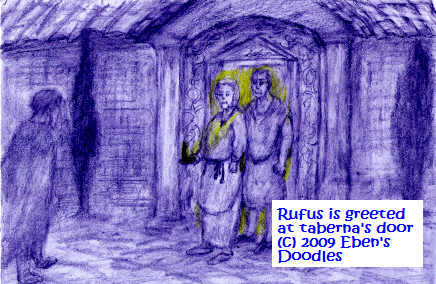
Gratian, with a pat on the head of Honorius, took the reins of the horses and led them to the stable to care for their needs. Freed of that duty, they followed the innkeeper's wife and entered the small inn, where they hadn't any expectation of a good dinner or good rest, by the size of the place. Yet they were pleased to find it spotless and clean, a cheering fire going in the hearth, and the wife of the innkeeper standing by the well-laid table, and plates and platters already set.
"How is it that the table is all prepared?" Rufus Quartus Urbanus asked her in his amazement.
"We have been expecting you, sirs," she said, bowing
She gave them her name, Prisca.
Rufus Quartus was very much surprised. "Howso, woman? We are coming as utter strangers at nightfall, and you were expecting us?"
She smiled. "Yes, sir, it is the truth I tell you. The Lord told my husband and me that we would have late guests, saying there would come a noble gentleman, and a soldier, and the noble gentleman's young son. So knowing the appetites of hungry men, I kept the soup kettle warning near the fire tonight, and there is some good meat stew too, and pastries and wine and fruit to go with it. It is not much to offer you, but it is all we have, as our farmers and their livestock have all moved away. You see, the country is very much forsaken now here, the many vineyards eaten up by the birds and the wild goats, as the barbarians have come so close, and might break through any time to burn everything, as is their custom."
Rufus frowned. "Yes, so we have heard and seen! But this is dinner enough. Let us sit and refresh ourselves, and give thanks to the Lord for it!"
After handing their cloaks and gear to the man and woman, they sat at the table and gave thanks first and then ate their simple but filling dinner. The innkeeper's wife stood by to refresh the glasses with water and wine, or bring some more linen or additional bread, and after a time Rufus Quartus Urbanus turned to her.
"So you are disciples of Christos here? I am so pleased by what you said. To think the Lord speaks to you like that! Even telling you we were coming!" "Yes, otherwise we would not dare to remain alone here after all the others packed up and journeyed to Roma and elsewhere where there are soldiers to protect them."
"But why do you remain? Your business cannot be good, with so few passers-by on the road nowadays and so many bandits to scare and hurry any patrons away."
She glanced to her husband, who exchanged it. "We wait on the Lord, for the time we are to go. We trust in Him to protect and care for us. He is the Good Shepherd. He will not permit us to remain a moment longer than is good."
Rufus turned to his son. "Remember that, son! Our hosts speak well of the faith. God has our lives in his hands. No matter what it looks like, he is God. He is over all!"
They slept well in clean beds. Only Honorius tossed about on his pallet, for he was dreaming of fierce battles with the Gothic barbarians, battles he and his legionnaires always won handily. Afterwards, as a champion of Roma and the Empire, he was paraded in a Trumph in a big golden chariot, with the emperor standing at his side, passing with thousands of captive barbarians in chains through the streets of Roma while the multitudes cheered. That was wonderful! Yet always there was a voice of a man at his shoulder, disturbing his mind and spoiling his success, hoarsely whispering: "Remember, you are but a man and you will die!"
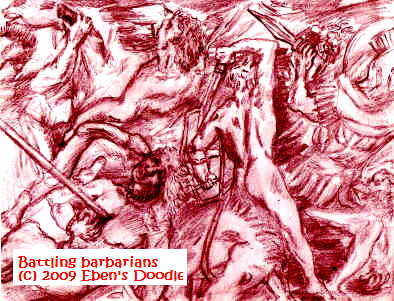
When Rufus Quartus Urbanus went to settle up, Gratian shook his grizzled head.
"What do you mean?" Rufus protested.
"We are to take nothing, sir. Please go on your way, with the Lord's blessing!"
Rufus could not understand how they could do this. "But--" he said. "Sir," Prisca said, "we are old and childless, and have our life savings, and need no more earnings to keep us in our last days. In the night, the Lord said for us to pack what we want to take with us, and go to the church we will find in Smyrna of Asia, so we are going now. You are last patrons, and we could not possibly charge you anything. Please accept it from the Lord."
This was so unheard of, but being a Christian, dealing with Christians, he understood, and nodded.
Outside, as they were brought their horses, all fed and groomed and watered and ready for the day's journey, Lancio turned to Rufus, bowing, with an amazed look on his face. "I have never seen such things! How can they not charge us! Surely, they are daft with old age!"
Rufus Quartus smiled, then mounted his horse, thanking Prisca for the wrapped package of cheese, dried meat, and fruit she handed him, free of charge. "Lancio, there are more things in Christianity than your religion knows of! You will learn in time what we have in Christos. Bear to learn them in time."
Both men were surprised when Prisca came hurrying back with a white horse, a mare, from the stable, all ready for its rider. After bowing to Rufus Quartus Urbanus, she handed the reins to Honorius. "I see you could use another horse, sir, for a more comfortable journey!"
Rufus reached for his money bag, but the woman shook her head. "No, sir, that is not necessary, as the Lord told us to give you this horse. We have no need of it, as we have two remaining, sufficient to take us on one while the other carries what little we need to take with us for our journey to Asia."
Now all three travellers were astounded. This was simply too much for Lancio. "What kind of faith is this, that you give away such valuable horses as this one, to utter strangers! Even I had to walk, having had to give up my horse to save the expense of keeping him on a long journey. I desire such a faith, which I have never seen before. Surely, you love each other beyond what anyone in my religion loves!"
"We have been given much, so we cannot help but freely give. And the Lord commanded us. We seek only to obey and please him by helping strangers such as yourselves on their way."
"'Lord'--who is this Lord of yours? I know Mithras, but he is not like your Lord, and you are not like his followers. None of them act as you do! They do not have any such love as yours! I want to know your Lord as my own."
A little while later, it was done. The innkeeper and his wife, who had been among the elders and leaders in a local church, with Rufus Quartus Urbanus and Honorius, witnessed the renunciation by Lancio of his pagan god Mithras and his expressing belief in Jesus Christos as his Lord and Savior, and then they baptised him in a large pond behind the inn that was spring-fed, out of which flowed water to the nearby aqueduct.
Lancio emerged from the water, shaking off the water from his hair along with a few water weeds, and looked extremely happy.
"What do you say about this?" Rufus Quartus asked him when he was standing, drying off with a blanket and towel brought to him. "Do you feel different? Are you changed?"
"How do I feel? Better than I ever felt! It is like I was a baby new born! Even the leaves seem more green and the sky more blue! I feel also a wonderful, burning in my chest, around my heart, and it is a good feeling. It is glorious--what is it?"
He slapped his chest with his hand.
Gratian and Prisca smiled to each other, then proceeded to instruct the brand new convert to Christos.
"The Holy Spirit has put the Spirit of Christos himself into you. You are now born anew by His Spirit. You are now a child of God, a heavenly being that happens to live on this earth. All the promises of the Word of God are yours too! Read the Word, son, and be instructed in holiness and righteousness. You must read the Word of God faithfully and pray. It will keep you safely to the end, when your soul returns to God who created you."
"What Word of God?" Lancio asked Rufus Quartus when later they were on their way again. "I want it!"
"I will show it to you. You yourself will see and read it at the next city after we stop there for the night."
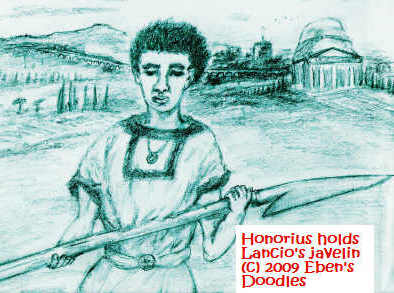
While the baptism was going on, Honorius got his chance to examine more closely the arms that the veteran laid on the bank of the pond with his clothes. As Rufus was intent on making good time and not wasting it, and before even Lancio was fully dry, they mounted and rode on, with little conversation, until the next stop at a mansiones, where they watered and fed the horses. It was a shabby place, but good enough for their beasts' needs.
Just beyond it, they met the first signs that the country was once again under Roman rule, with anarchy dispelled. People were moving about freely in the countryside, as though they had nothing to fear, and wagons carried produce and livestock for the markets of the city Rufus Quartus was approaching.
This was an encouraging sign. They found it even better when they sighted a garrison manned with a full complement of troops, both infantry and horsemen, all fully armed and ready for any barbarians that might show up at the gates or seek to ravage the farms and villas outside the city's walls.
Here Rufus Quartus dismounted, to get some news from the garrison, Honorius, with Lancio keeping an eye on him, went to take a close look at one of the soldiers standing duty.
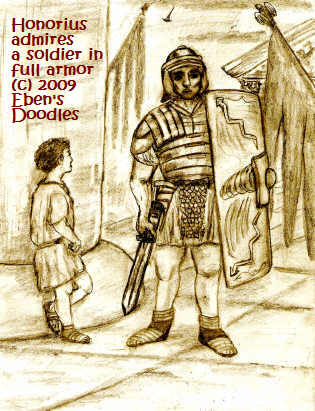
Honorius looked from the soldier to the veteran. "Where is all your armor, Lancio?"
"I have no need of it anymore, Master Honorius," he replied, trying to restrain a chuckle. "I am not in the wars now, and I am no longer young, so it is time to lay down my arms and go back to farming."
Honorius's face showed his disappointment. "But why--?"
Lancio shook his head. "If Roma calls me to defend her against the Barbarian, then I will gladly return to the ranks, but not until then. I have served and done my duty these 25 years, and am discharged. I have land now to till and restore at home, and there I will go to spend my later years." He almost added piously, "by the gods!" but caught himself, reminded that he was serving the Son of God, not Mithras from the east and the old gods of Rome and Greece.
On well-tended roads, with mansiones, halting stations, and tabernae improving all the way, they made rapid progress now to Roma, with many, majestic sights of Civilization on the way that overwhelmed Honorius, though Rufus Quartus and Lancio took them more in stride, being men of the world accustomed to Roma's glories. Proper maintenance was no longer affordable by the state authorities, with so much of the taxable acreage in the country no longer farmed and gone to wilderness and the cities half abandoned. Many years of neglect had taken a grim toll on many aqueducts, bridges, arches, armories, pretoriums, amphitheatres, arenas, public buildings of all kinds, and fountains. But from a distance these devastations of time and decay were not apparent, and things looked as they had always been--eternal, imperishable, forever Roman.
Approaching closer in, however, the cities and towns were still splendid-looking overall but it became obvious even to Honorius that many great buildings were dropping masonry into the street or standing abandoned, and no new ones were being erected in their place. Also, shops were boarded up, with the owners packing everything aboard wagons carrying 1,200 pound loads of their merchandise and belongings. Where? To Roma! That still seemed the only place left that was most safe. That the Barbarian could ever breach the walls built by Aurelian, that circled the entire city with forts and garrisons, was unthinkable.
Moving through the markets and squares of the cities, Rufus Quartus, Lancio and Honorius could see clears signs that many people were going hungry too. They found many beggars in the streets, reaching out to them for alms. Christians had alms houses going, which were jammed with the poor. And yet there were more that could not get in for help. The slave markets were also jammed, as many men had sold their hungry children into slavery, rather than see them starve. Even freed men, citizens, sold themselves too, rather than starve. In one of these markets, Lancio halted, staring at a particular man who was offering himself as a slave, though at his neck hung no scroll giving his name, age, and health. In evident poor condition, he should have drawn no interest without the required titulus, and indeed he drew no eye until Lancio came.
Rufus Quartus Urbanus noticed what Lancio was doing, if not knowing why, and stopped Honorius, and they waited. They watched Lancio go to the man and take a closer look, then return to Rufus Quartus.
"What about him, the one without a titulus?" asked Rufus Quartus Urbanus. "He looks like any other wretched man in his condition, does he not, Lancio?"
"No, sire, I see something different about him. Look at his face, how pale it is! Something is different. His eyes too, they squint, as though they are not used to the full light of day. I am certain that man has been a miner, a slave in the mines!"
Slavery in the mines was a death sentence for criminals, they both knew. Speaking in low voices, Rufus Quartus continued. "Well? If he has somehow escaped and run off to this city, he has evidently found nothing here to sustain him so he is going to sell himself back into slavery. He is going against the law and may be he murdered someone, and was sentenced to the mines for life. Maybe he will succeed in selling himself now, maybe he will not. Give him this for a good meal at least."
Rufus Quartus held out several denarii, but Lancio declined, bowing.
"No, sire, he is not like that. He is not just a runaway criminal slave only. I can tell somehow. Let me go and speak to him before we leave him to his fate."
Rufus Quartus Urbanus nodded, and he and his son waited for Lancio to speak to the pale-faced, squinting man on the slave auction block.

Lancio turned, smiled, then dropped a coin the man's hand, and took him by the hand and led him over to Rufus Quartus Urbanus.
Rufus was a bit shocked. "You mean to buy him then as your slave?"
"Unless you prefer to have him, sire, I will take him. He will come with me after our journey is over, to help me work on my farm. He says he has no family still living, as he already inquired in his native town and found they were all gone, his parents dead and his brothers scattered. None of his parents' neighbors were willing to help him, nor would they give him any food or shelter. Without relatives or friends, he had no choice but to seek any work he could find in the country, he said, but there was nothing--as we ourselves can seee. Everyone is leaving south, for Roma, abandoning these places, so they are not going to taken on laborers when they are going out of business or leaving their homes and properties! He was starving when he thought to do what he is doing, sell himself in the market to some landowner or tradesman, rather than slowly starve to death."
"But what did he say about his being an escaped criminal? What was his original crime? Did you ask him that?" said Rufus Quartus.
"We should be breaking the law if we gave him shelter, when the state may be looking for him." "I did ask him. First about his escape. He said the barbarians raided the imperial silver mines in Hispania, and killed all the guards, so the slaves used the mallets and other tools, broke their shackles and ran off. The barbarians were more interested in silver than slaves anyway, and took all the silver that was in the guards' strongboxes and then departed, rather than make the slaves dig for more. He was free! No guards came to replace the ones lost, as Roma could not spare any to send to retake the mines and round up the slaves--and besides they had no rule over that area once the barbarians ravaged it. It might be years before Roman rule returned. What could he do? Wait until then? No, he decided it was best to save his life if he could. He would not stay there, which was a place to die only, but try to make it back to Italia. And he succeeded, only to find the conditions very bad, even in the ruled parts. As for his crime--he a mere boy and struck back at his master who was brutally beating him, who had accused him of stealing a necklace of his wife's, but he said another slave had done it, and cast the blame on him. The master did not care which slave really did it, he took the first slave's word and his own hand raised against his master was sufficient to send him to the mines for life."
Rufus Quartus Urbanus turned to the slave and took a keen appraisal of him and the expression of his face and eyes before he spoke. "I greet you in the Name of Christos. I am Rufus Quartus Urbanus of Glevum, Britannica. I have heard many similar stories, but I believe the report you have given us. Lancio is now your master, for he has paid your stated price. Later, I can have a proper document drawn, when there is more time. I will not require anything of you myself in service. Do whatever he tells you to do from now on. I know he will treat you well. We are all Christians in this party, and we cannot mistreat you, or our Lord will punish us for our mistreatment of an unfortunate man. As for your past, whatever put you in the mines, it is over, since you have paid your sentence as long as you could. The barbarians freed you, as God's instrument. I have heard what sad circumstances put you in that place, how God set you free by way of the barbarians. You have chosen to serve your master, Lancio. A horse will be provided you, for we must travel quickly to Roma and then return home to our native land soon thereafter. Now, what is your name, for you bear no titulus?"
But the man could not say his name, Gaius, at first, he was weeping so uncontrollably as he saw how heaven had smiled on him.
Honorius was not so sure it was heaven! His expression showed it plainly, that he did not at all like the idea of this dirty, half-skeleton coming along with them on their journey. He would spoil it all! he thought.
"Does he have to come with us?" he asked his father plaintively. "I don't like his smell and his looks."
His father's face showed he was not very happy with his son, and he took him aside.
Rufus put his hands on his son's shoulders and looked keenly into his eyes.
"Remember this, son, and never forget it. You and I are no better than any slave, we are all flesh and blood, our substance drawn up from the dust and fashioned by the same Creator. He has dignity, the image of God just as we have, only his circumstances are unfortunate, as you can see. That is not necessarily his fault, I am informed. Even if it were, our Lord the Christ forgave us sinners our many trangressions, so ought we to forgive others their transgressions. Now I don't want to see that unmanly and unchristian look on your face again! You have nothing to be sorry about! He will be a big help to Lancio and us too, after he has gained strength with some good meals and had a hot bath and a new set of clothes! You'll see!"
Honorius was almost beside himself, but he didn't dare show any more displeasure at his father's decision, so he screwed on a smile of sorts, and his father let him go.
After the fourth member of their group was taken care of in the town, they continued their journey. But at the next city, which was of considerable importance still to Roman government, there resided a consul that Rufus Quartus Urbanus knew personally, since he had been assigned to Britannica in years past. He paid a call on the consul at his government house and were led into the consular hall, waiting until they were announced and told to proceed. It did not take a long wait, as the hall was virtually empty of business and people, and Rufus Urbanus's name was well known to the consul.
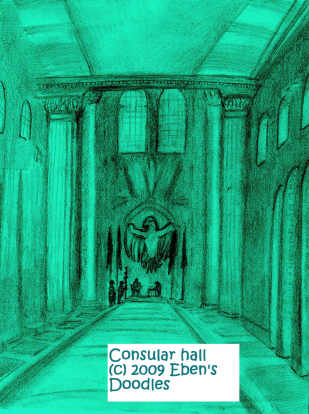
While his father inquired about the movements of the barbarians in the north and whether Italia and Roma would be attacked any time soon, Honorius wandered about, glad to get away from Gaius the former mine slave and Lancio too--for now he blamed Lancio for Gaius's unwelcome presence.
Honorius, having lived all his life in a great house such as this, knew the most interesting parts.
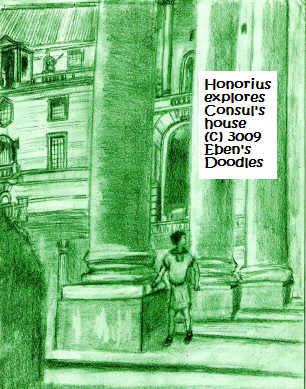
He went first to the kitchens, to look in at the slaves and cooks all busy at work, as they finished the preparation of the dishes of the many courses of the next meal to be served. What a noisy place it was! Swearing cooks, banging of lead-lined pans, hiss of steam of boiling water poured over various shellfish, clatter of dropped lead utensils on the stone-laid floor. Here he thought he might get a treat or two from the cooks, and he wasn't mistaken--for the baker patted his head and gave him a slice of a wonderful cheesecake.
The Consul had some advice for Rufus Quartus Urbanus.
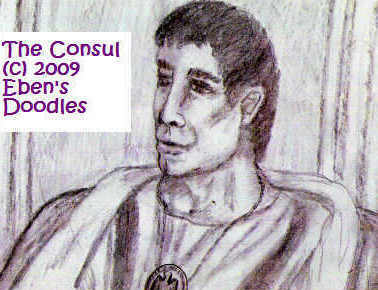
"It would do well for you to consider my situation as maybe your own chance at good fortune and a new beginning. I am called to New Roma, by the emperor, to join his court, and so we will be moving soon. Perhaps you could re-locate to New Roma too! They offer a fine mansion in the city near the imperial palace and a splendid salary, if you are of the nobility, in order to increase the court's size and prestige. They especially want families of old Roman lineage, but if not available, then provincial nobility with experience in government and good reputation is acceptable. My duties, such as they are, are nearly finished here. Roma is considering letting this whole province go back to the governance of local officials only. That will save much tax monies which the province the cities no longer produce for the imperial administration."
Rufus Quartus Urbanus was shocked.
"But this is your country! You are not Greek-speaking, and surely you will feel ill at ease among the Eastern Romans! They scarcely speak a creditable Latin, I've heard, nor do they care, since they prefer Greek far above our mother tongue!"
The Consul's smile faded. "It is absolutely necessary, my friend! I will do my best to learn their Greek with the best tutors I can find. When Roma draws back from any area, the country will soon turn savage wilderness. But worse will soon fall. The tribes of the Goths, hearing of the exposed weakness in our borders and defenses, will break through and ravage what is left. It is only a matter of time before they return for booty. Radagaesus destroyed three quarters of northern Italia, destroying hundreds of towns and many cities, and now he or others like him are moving westerly again with their hordes, intent to seize and ravage the central parts of Italia, and maybe even take Roma herself if they quit their rivalries and combine into one army! No, we must go, it is now or never. Otherwise, what is there for my wife and me? We will be left refugees, vagabonds, with no imperial office, no future at the imperial court at Ravenna either since the emperor's family was always a bitter rival to my own in past generations. We will possess only what we can carry away with us if we happen to elude the rampaging Goths! We cannot remain!"
The consul glanced toward the atrium where there was a dinner being prepared on the garden terrace. He turned to his guests. "Would you kindly favor us with your presence at dinner? My wife and I would be most pleased if you could join us? We were fond of your country. How are things going there of late?"
Rufus Quartus Urbanus bowed, but declined. "I have no time to spare, sir, for such a gracious favor of yours, but I should like to greet your wife for a few moments, since it has been years since I have last spoken to Lady Julia. And I know my wife will be cross with me, if I do not seek to exchange a few words with her. You know how wives are always interested in each other's families and situations. Is she as well as ever?"
The consul's face seemed troubled. "Yes, she is well, and looks well as ever, but she has never borne children, which is a sorrow to her, and of course I would have liked to sire a son or two to carry on our family name and serve Roma in imperial office or the Army. But it was not to be. We are no longer young, so children are not going to be our blessing, it seems."
But the sad look partly left his face as he turned, and saw his wife was approaching.
"Here she comes now. Please stay for dinner and speak to her. It may give her some diversion, as there is only myself and the servants usually these days. We get few visitors of any note."
Rufus Quartus Urbanus turned and saw the aristocratic lady of ancient Roman family (one of the Gracchi) waiting at the edge the consular hall, and he decided he must take the time to speak with her. Anything less would be disrespectful and most ungracious, considering how many times he and his wife had been invited to the consul's fine villa just outside Londiniuum.
He found her as lovely as he remembered, as the consul led him up to her, but there was no happiness in her expression, only a kind of patient resignation in the face of a hard, inescapable destiny. The jetstone miniature of her husband at her neck, and the jetstone ear pendants, they went along with her fatalism, he thought. Didn't they have any hope of the Resurrection? Perhaps he could share with her something of his faith, just as he had done with her husband on previous occasions. He knew there might not be another chance, as they would not be meeting again in this life, he knew. Britannica, he loved, and he could never leave her, whether Roma abandoned his country or not. As for New Roma, he knew he would slowly wither there in a gilded cage--better to face the barbarians in the West than feast amidst the sophisticated Greek-speaking "Romans" of the East, blue-blood courtiers and officials who would never accept him and his family as their equals, since the Urbani, like all British nobility, were originally Celts and provincials with only a few generations of Roman civilization to their names! What would they care if he told them his family line sprang from kings--they would smile at him and detest the thought that barbarian kings were anything to be proud of! No, rather than endure such humiliation and the slights of courtiers, a rustic but dignified obscurity in Glevum was much preferable, and so he and his son and Lancio and his servant were returning to Britannica as soon as his business with the pepper imports was finished in Roma!
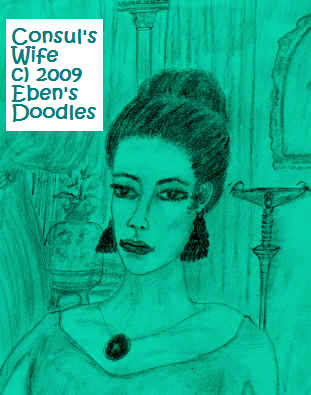
The lady inquired about his wife, of course, and he told her she was fine, and always in want of guests in their locality. Could they think to come that way again? They would be most welcome!
The lady laughed, and her husband the Consul looked very serious. "It would be more likely for you to come our way instead. We doubt we will see the Western Empire again--it is going into such bad hands these days, there may not be much left of it in a few years. The barbarians--"
She looked off, and her husband frowned. "But I am not a very good hostess, reminding you of such unhappy things!" she said, brightening up a bit. "Won't you please stay and dine with us? We have so few guests ourselves these days."
Rufus Quartus Urbanus bowed, but declined again. "It is most urgent that we reach Roma and conclude our business there. The pepper fleet is in, I have been informed. I must speak with the captains and the collegia and the others in charge of the trade, to insure that Britannica receives its yearly allotment according to the imperial edict. If I don't catch them this time, it may be years before we get the import trade re-established on former lines--as we have had to make do with such scanty stocks of pepper the people at home are growing very unhappy. As a middleman for a league of cities, I am held responsible by all parties, even if I am not making any profit at the end!"
"Ah, the pepper trade!" the Consul replied, smiling. "How can we compete with that! Pepper, more costly than gold, keeps the people content with their food, and without it they will riot! With pepper, civil quiet, without it, endless unrest! So you must indeed leave us as you say!
Shown to the door by the Consul and his wife, the Consul laid aside his other duties and even his dignity and went out with them to see their horses had been properly watered and provisioned.
He reached up and grasped the rein as Rufus Quartus Urbanus mounted his horse. "One question, my friend, will you grant me that? We may not meet again in this life."
Rufus Quartus Urbanus's eyebrows raised. "Yes? Is it as serious as your expression tells me?"
"My wife cannot bear children. We have tried for years, and now we are past the age, I think, for child bearing. It is a hard thing for my wife particularly, even if I lack a son to carry on our name and inherit the properties and servants. Here is my question. Is it true your god, your Christian God, is a healer? I heard tales that he has granted children to the barren women in your assembly. Is there any hope for us in your God?"
Rufus Quartus Urbanus spoke very quietly with the troubled Consul for a few moments, and then prayed for him. Urbanus saw it was time to go, when he saw that the Consul truly understood the reasons for faith and how to become right with God, and they moved away. "Let me know by imperial post whether God has answered my prayer!"
The Consul saluted him. "Yes, I will. And I and my wife will believe God, believe Christ his Son for a son, as you instructed me to do in faith! We will follow His way. Farewell!"
Where was Ero all this time? He was following faithfully along the entire route of the Urbani, and learning a great deal about the workings and infrastructure of the Roman Empire along the way. Reaching Roma, he was treated with a wonderful view of the Flavian Arena, or the Coliseum, from the top down, which was the largest building of its kind in the entire world, able to hold over 50,000 spectators. Though its awning was removed for repair, this way he had a much better view of the entire facility, which was truly a wonder of the world.
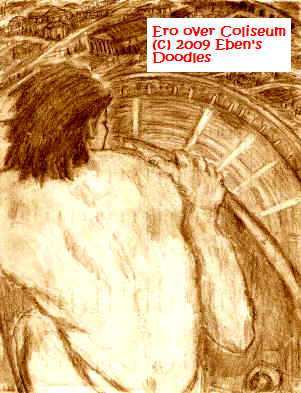
Crossing the city, he passed over the Tiber River, which was the vital water lifeline that brought, with tow paths laid along the banks, ox-drawn cargo boats from Port Ostia on the coast. Roma's grain from the African provinces and tribute money and all sorts of articles of the luxury trade that Roma desired came up the Tiber, as Roma produced almost nothing of its own to live on.
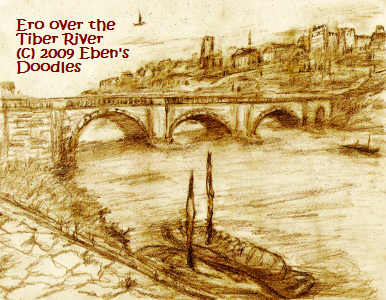
Set on its seven crowded hills, the immense metropolis of Roma still looked as though it were reigning undisputably as the Queen City over all the earth. His natal city of Glevum shrank to a speck compared to what Roma had to offer. Everything was larger, and larger, and continued to grow until it was stupendous, beyond comprehension in size, scale, and magnificence. How could mere men of flesh and blood build such mighty things as he saw everywhere he looked within the huge, encircling walls built by the Emperor Aurelian? Boys do not think that way, but he was feeling it just the same, that this City was like none other, and that hands other than human hands had raised it to the sky.
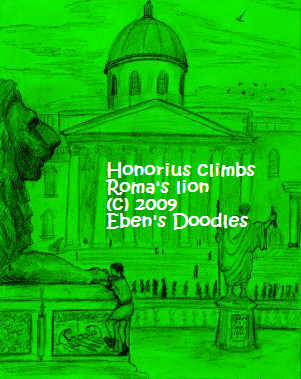
While Lancio and his servant tended the horses, the father took him to see the imperial palace. With the emperor re-locating his residence and court to Ravenna permanently, they found the Praetorian guards on duty at the gates much reduced in numbers and also very relaxed in their military bearing. Rufus Quartus had no trouble gaining entrance for himself and his son when the guards were presented with his credentials. The captain of the guards knew the Emperor would not be returning any time soon anyway, as everyone in the Praetorian Guard knew he hated and feared Roma's rioting mobs, who would put the torch to the city sooner than the Goths of the North if they weren't given enough public doles. With an absentee emperor so spineless as this one, there was no longer any real danger him showing up and being assassinated under their purview. If they had had more time, they could have gone anywhere in the palace complex and peered into the most private bedrooms and baths and dining rooms of the imperial suite. Just as long as they carried nothing out with them, they had free run of the whole palace, which stretched, room upon room, hall after hall, over a vast section of the hillside, with gardens, pools, fountains, walks and walls all around.
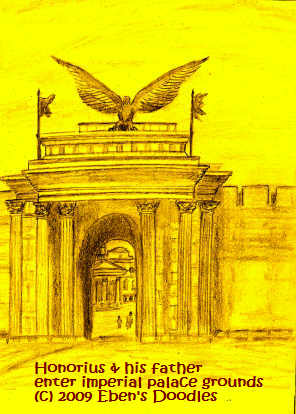
Honorius was taken to everything else he could want to see, the Coliseum, which his father explained to him was the site of thousand of Christians being mauled to death by lions and wolves and bears, not just men and youth, but mothers with babies and children of all ages torn apart while the crowds cheered and demanded more such sights. Finally, a good emperor stopped the persecution and the arena was no longer used for such "entertainments." Honorius also was taken to see the Circus Maximus, an amphitheatre where 300,000 spectators watched the horse and chariot races. Finally, they went to tour the wharves and warehouses and pepper barns in the shipping quarter along the Tiber.
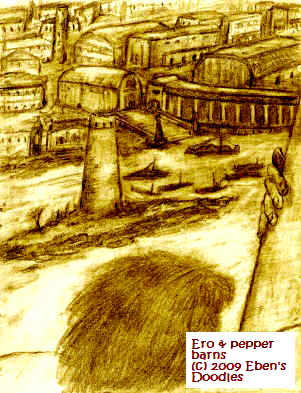
Here Rufus Quartus Urbanus, with Honorius looking on proudly, concluded agreements with the authorities to maintain the pepper allotment for Britannica on a yearly basis. He was satisfied it would go well, and was pleased to think his long trip with his young son had gone well and was not in vain. It was a delight to him to show his young son the remaining glories of Roma, which he knew his son would remember all his life and would be memories he could pass down to his own sons in later years.
After suffering wave after wave of persecution from pagan Roman emperors before Emperor Constantine, Christians no longer longer met secretly in homes or even in underground caves and catacombs, but in many grand churches in Roma and throughout the Empire. Honorius climbed up to a high balcony and dropped a denarius in one of the great basilicas. It took so long to reach the bottom floor, he scarcely heard it.
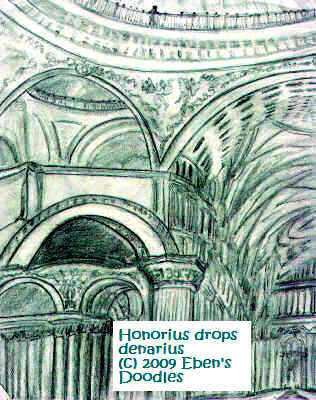
Next to last day of their stay, as the light waned and dusk enfolded Roma, Honorius went out on the balcony of his room in the ancestral Julian mansion high on the Palatine Hill overlooking the city.
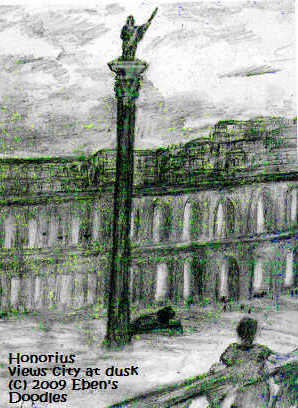
It was a magnificent palace, and it was no wonder he had quickly grown fond of it and all the nice things about it. There was nothing its size in Britannica, he knew that for sure. It dwarfed even the big fortress in Londinium.
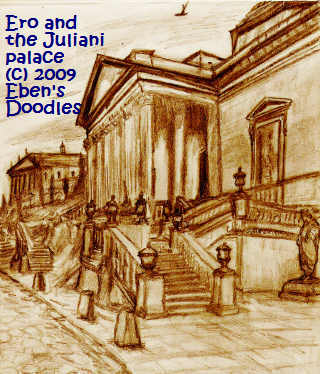
He did not want to leave Roma with his father and Lancio, he realized. Glevum, stuck far out on the edge of the Empire, seemed such a poor and pathetic place after what he had seen the last few days in the glorious center of Roma. His father was anxious to conclude his business and leave and return to their country, but he was not! He wanted to live in Roma forever! He loved the great city, far more now than his own home. Here was everything a boy would possibly want--excitements of such a number and magnitude he knew he could never exhaust them. If only his father would change his mind and let him stay, attend school at one of the church schools he had seen in their sight-seeing. So he had begged his father to put him in one of them, but his father would not even speak of it. He was sent to his room, and so here he was: angry, and even frustrated. He hated the idea of returning home, now that he had tasted of the beauty, excitement and greatness of imperial Roma. Glevum! The very name made him want to spit!
He had an idea. He would run away! But what would he eat, where would he sleep? He had seen the hundreds of poor, beggar boys in the streets. They sold little things to the crowd, which dealers gave them to sell, or things they had stolen in the many big houses that were shut up by their absent owners with boards across the windows, or they just begged anyone who looked like he might have some money. Would they like it if he tagged along with them? Of course, they wouldn't! They didn't have enough to feed themselves, much less feed him too. Besides, he didn't like their smell, and the dark, filthy rags they wore, and their thin faces and clutching hands. He liked the fine, clean, purple-bordered clothes his father gave him, and the clean hot and cold and tepid water baths, and the good food and the soft, scented blankets of his bed at night. These things were necessary to civilized life. He didn't want to join the animals in the dirt! So what was he to do? He felt trapped, he couldn't live on his own without money, and his father kept all their money, except for a denarius or two that he gave him each week!
A thought crossed his mind. He could do something after all. Rise up in the night and steal the money bag, and then he'd have plenty to live on for a long time! He could be his own master, with no one telling him what to do. He would be wondrously free, like a bird is free to fly anywhere it likes in the wide sky. The thought kept him awake after he lay down in his bed and the servants had left the room. Before the dawn, he was still awake, and then he crept out of bed, careful not to wake anyone with a noise, and made his way to his father's chamber.
He knew where his father kept his money purse, because he had seen his father put it away time after time when he retired, at home and on the road, and so he found it easily in the dim light that entered the cracks of the shuttered window. He had just turned the corner of the door and shutting it softly when his arm was seized in a viselike grip. At the same moment the money bag was taken from him, and he was pulled right up to someone.
Honorius wasn't going to let someone manhandle him like this, so he struggled,twisting his body and pulling with all his might to get his hand free, but he felt an arm clenched around his body, lifting him up. .
He was taken down the hall, someone's hand over his mouth as he was carried. "He was going to cry, "How dare you!" to him, but Lancio's mouth was still over his mouth, and Lancio spoke instead.
"If you want your father to come and discipline you severely for this, it is for you to choose, Master Honorius. But if you will go to bed and sleep, I will put the money back and say nothing in the morning. Well, what do you choose?"p> Set down in his room, he was enraged and could not think what to say at first.
"I will put the money back for you, and you can go to bed, and nothing will be said. Will you like that? Otherwise, your father will hear everything you did, and surely you will be disciplined. Well?"
In a movement too swift to see, Lancio stepped aside, seized the lampstand, and also grabbed Honorius.
Honorius felt Lancio's arm wrap around him, but he still had his head free so he opened his mouth and bit as hard as he could on the arm.
Lancio did not even flinch as Honorius's teeth sank in. Lancio swept Honorius up as though he were a pillow's goose feather and laid him on his bed, though he was kicking and struggling all he could in Lancio's iron grasp. But it was to no avail. Honorius was soon exhausted, and he began to weep. "Let me go," he whimpered. "You're hurting me."
He felt Lancio's grasp relax, and then let him go.
"Do you want me to tell your father what you did? I could do that now, for you are still fighting me, are you not?"
"No, don't tell him!" Honorius gasped, getting his breath back. "I's sorry! I will do what you say, sir!" He lay there, his chest heaving, trying to think of what to do. But Lancio seemed to have total control of him, for he was strong like an ox. There seemed no way to elude him or get around him. But still Honorius did not give up. He would think of something, he decided.
"I promise I won't cause any more trouble," Honorius said. "Please go now and sleep. I will go to sleep now, and you need not stay with me any longer. I am used to sleeping without servants, for I am a big boy now."
"I will not go far, for you may change your mind," said Lancio grudgingly. "Oh, no, I won't! I promised you. I will go to sleep now, just as I said!" He heard Lancio sigh, then go out, shutting the door. Waiting a bit, Honorius got out of bed and slipped over to the door to listen. He thought he heard Lancio's breathing on the other side, so he knew he couldn't get out that way.
Honorius had already thought of another way, which would be a bit harder, but he knew he could still do it. He was on the second floor, which let down to the garden behind the house. If only he could slide down far enough he could reach a tree beneath. From there he could climb to the ground. He waited a while, which was just before dawn, and took his bed sheets to the balcony outside his window. Tying end to end of the sheets to make a rope that he then tied to the balcony railing, he was soon sliding down to the top of the almond tree. With one hand he held to the sheet, while the other searched for a big enough branch to bear his weight. He thought he found one big enough, and swung over to it. There was a snapping sound, then he tumbled, and found himself a moment later on the ground. He got to his feet, and though his tunic was all mussed up with leaves and twigs, he felt no bones were broken. A moment later however, his arms and legs began to burn all over where the bark had scraped them.
He danced up and down, trying not to cry out.
Gradually, the fire died down, and he limped away, for his ankle seemed to have been knocked on a limb on the way down. He felt like crying, but he kept his mouth clenched and tried to be a legionarire instead. He still had to get out of the garden. Where was the back gate, if there was one? He had to find it, or else try to scale the high wall by first climbing a tree nearest the wall with his paining ankle.
He found the tree that was close enough to the wall, after skirting as far as he could around the buildings that could hold stableboys and other grounds servants, who were asleep but could have watchdogs that would tear him to pieces. Up he climbed, careful this time to pick branches that could hold his weight. He reached over and caught the top of the wall, and cut his hand on a glass shard stuck along with thousands of others in it to keep robbers out. He hadn't thought of that! But he couldn't go back, he had to go on regardless. What to do. He ripped off part of his upper tunic and covered his hands, than climbed over onto the wall. Then what? He had to get back down the high wall. He walked along it, feeling his way, hoping to find something he could grasp onto that would let him lower himself far enouhg to catch onto something else. The moonlight fortunately was bright and helped him. He found a brick facing on the other side that was old enough to have cracks he could get his fingers into. Slowly, he let himself down, feeling his way for more such cracks. Then after some progress, he found no more cracks as far as he could stretch his fingers out to search. What was he to do? He really felt like crying now! He must have lost his grip for suddenly he felt a rush against his chest and knees, and then a big bump as he landed at the bottom of the wall, crashing onto a bush that shielded his fall but threw him forward onto his face.
His breath knocked out, he lay gasping, crawling, and trying to get to his feet. Finally, he was on his feet, dazed and cut and filthy and his clothes torn up and covered with dirt. Stumbling, with his eyes choked with tears and dirt that covered his face, he moved forward across the forecourt of a neighboring palace and didn't see what he was getting himself into. Boys as ragged and dirty as Honorius were busy running about the main entrance pavement, scrambling to grab the stolen items from the house either thrown down by the boy on the porch roof into the shrubbery or, if too fragile to survive the fall, let down by a rope in a bag.
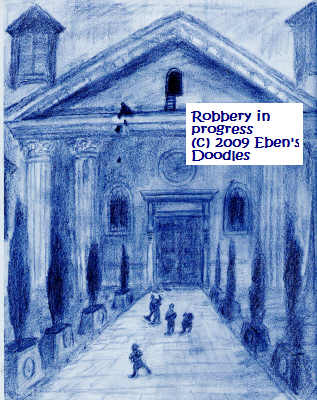
One of the little thieves saw Honorius and thought he was someone else and thrust a silver and gold handled alabaster vase into his hands. "Hey, is that you, Nepos? So you decided to come in with us after all? This is too heavy with the other stuff I got to carry, you take this out!" the boy ordered him.
Honorius, half his senses knocked out of him, dumbly obeyed and carried the heavy item away toward the street. There he was joined by other boys, running with their items, and they hustled him down the street, and into an alley, and between houses and, still running, led him into an abandoned building, that might have been a bathhouse at one time, for it had pools in most every room, only they were dry and filled with rubbish.
Scrambling with Honorius in tow down some steps, they entered the basement, and steps led them further down into the gloom of a buried temple of the goddess Juno, the walls covered with flaking red and gold paint and arcane symbols known only to long-gone priests. Here fine, dining room candles gathered from palaces were lit and set in wall niches by the street gang's leader, Lupus "The Wolf," the robber boy who was biggest and smartest of the group. His mother, a Forum prostitute, had served the cooks and butlers in the kitchens of great houses and told him many things he later remembered. He organized the nightly forays into the boarded up palaces of absentee patricians who had lately moved to Constantine's City, taking what they could on board ship but leaving most household goods to follow them in cargo ships--which were few and far between in these days and took months to find, hire and make the long voyage. Lupus kept his contacts on the wharves, boys who listened to the talk of captains and sailors, and told him which regal houses would be right for picking. Most often, the patricians took their household slaves with them too, leaving their belongings in the the watch of often drunken, sleeping caretakers who were slaves and not apt to care about thieves breaking in.
Coming episode:
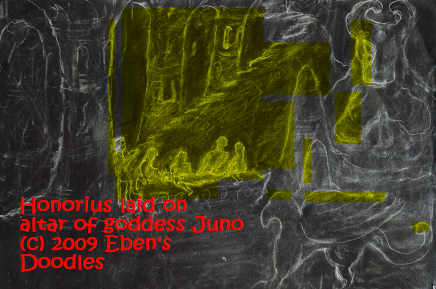

Star and Twin Worlds Timelines
Brief Account of the Twin Earths
Bridges of Destiny
Star Map of the Re-Located Earth, Twin Earth Atlas, Stellar and Terrestrial
Argo, Ships of the Line
Volume IV, Appendix, Part I
Volume IV, Appendix, Part II
Map of Holland America
Extraterrestrials and Terrestrials
The Algol Invasion & Client Species


The Star-Stones, the Evil, Scheming, Destroying Jewels of Fire, & Other Fatal Jems:
Universe Terminator: The Sardius, or Carnelian, Red Star, Stone of Fire, Fiery Stone, the First Alien Entity, Wormwood, Wormstar, Retrostar
Curses attached to certain diamonds and other precious jems--are they fiction or real? The late Vera Boch beautifully illustrated the malevolence and deadliness that lurked in the most alluring and costly jewels:




The Topaz
The Black Crystal and the White Ship



Josef Dugashvilli (the Left's darling dictator, Joseph Stalin) codenamed Washington, "Carthage." Ancient Carthage, thanks to Cato's constant harping in the Roman Senate, was finally utterly destroyed after a couple previous attempts, thus eliminating a chief rival to Roman power in Africa and Spain. But there is another name that is more appropriate for Chocolate City on the Potomac--Babylon! What is "Babylon" doing now to bail itself out of its trillions of dollars of misappropriated and politically-milked public funds? Cash for Clunkers generates a few billions to prop up a nine to fourteen trillion dollar deficit that is coming due in the next ten years? Who, pray tell, is going to pay all that back? Who can pay that much back? Nobody! We have to borrow even to pay the interest. The note held mostly by Communist China is going to come due--what then? Will we just have to turn all our country over to the collection agents of hostile countries to whom we have sold our future?
Showing signs of collapse and futility on several prior occasions, the brain wave of the Obama administration went completely flat at the time of the Cairo Speech and remained there since. It also depicts the direct effect on the general Human Intelligence Quotient by the vampires of environmentalism and Global Warming propaganda (which are based on bad science mixed with hysteria mixed with toxic socialist political opportunism). Human Civilization cannot continue, obviously, with so little brain activity--but Government can, because like the organisms in a cess pool, it requires no air, no light, no intelligence, and in septic conditions it not only survives it flourishes, grows, expands, devours, multiplies by the hour, like a gigantic, malignant cancer. There is no chemo or radiation treatment or Constitution and Bill of Rights that can stop Government, once wicked people seize control of it, or are voted in by masses of grasping, lazy people seeking welfare benefits of all kinds. Together they conspire in the looting the Public Treasury and overtaxing the real producers of wealth, bleeding the cash cow white and ultimately killing it like a giant vampire. It is irreversible, once it invades the unsuspecting host. In the terminal stages of a society, only the elite on tip is doing well, while masses of ragged, starving, disenfranchised people are pressed, groaning with hunger and misery, against the windows of the palace, looking in as the Government has itself a ball while they perish in the cold, babies dying even in their mother's arms! Ask Romanians what it was like! Ask the Russians! The Latvians! The Lithuanians! Ask all oppressed peoples, oppressed by Big Government grown into a blood-sucking vampire! "Sic semper tyrannis!" "Thus Ever to tyrants"--Virginia's State Motto (Is it still in the Virginia State Seal, or has the divine O.H.B. had it removed by Federal Marshals? In any case, he will have the Supreme Court, with Ms. Sotomayor, his implanted judicial vamp's deciding vote, rule it unconstitutional and thrown out.)
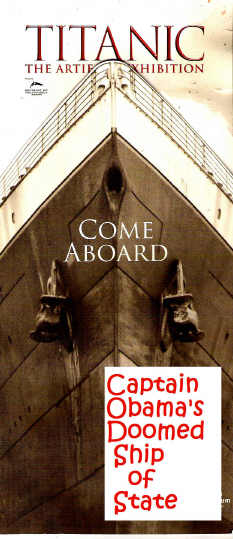
A Shot Across the Bow of the current administration in Washington (the New Babel or Babylon):
"Babel was a stupid and arrogant attempt to build a culture without God. We are living in the wreckage of those tower builders."--Ann Paton, February 17, 2008, published in War Cry, Salvation Army Magazine, April 12, 2008

